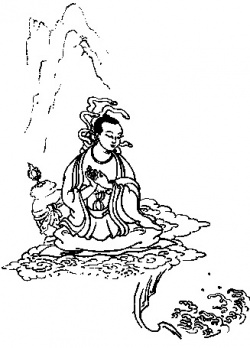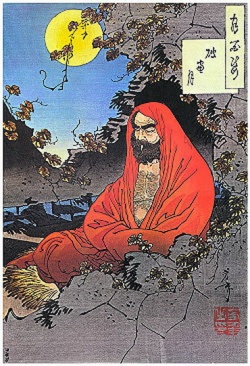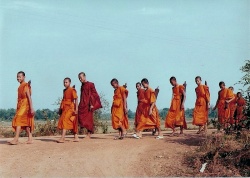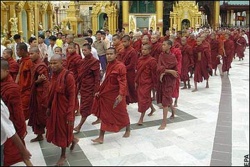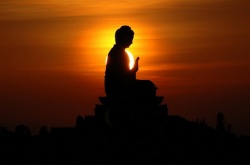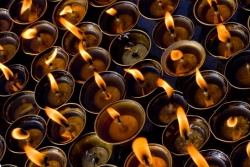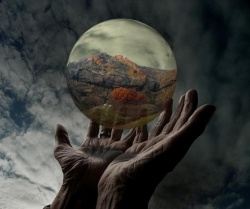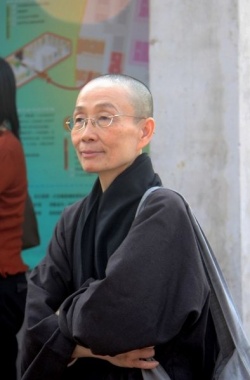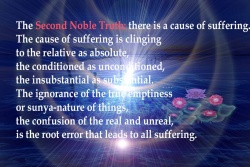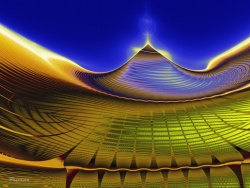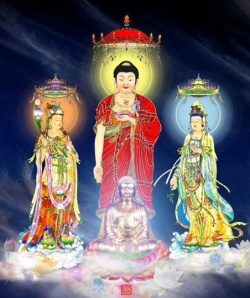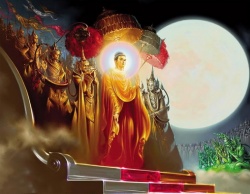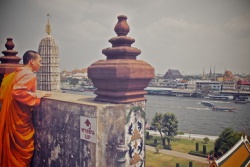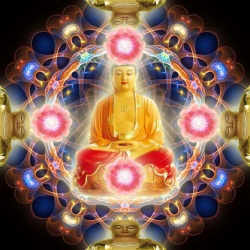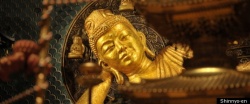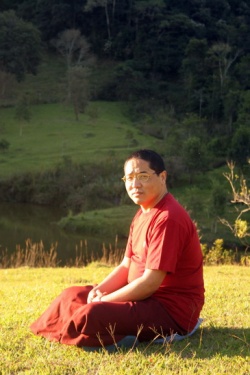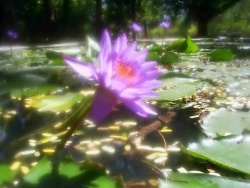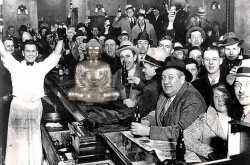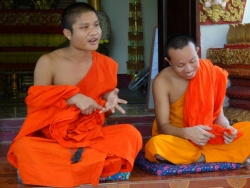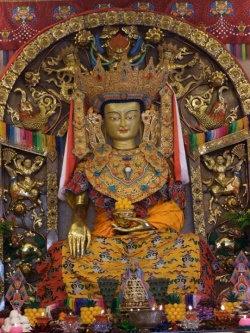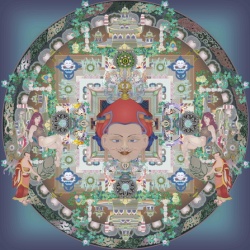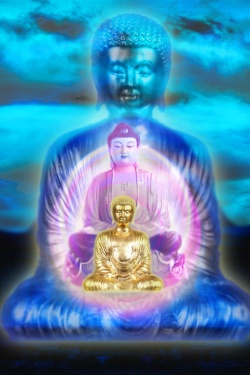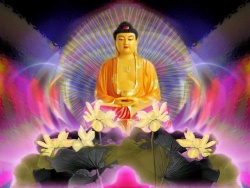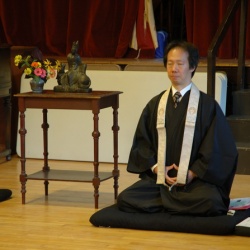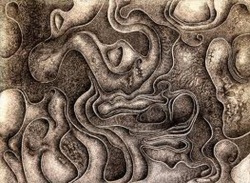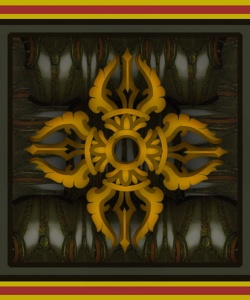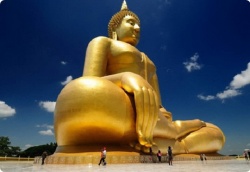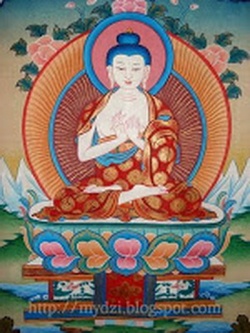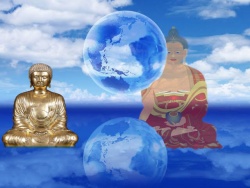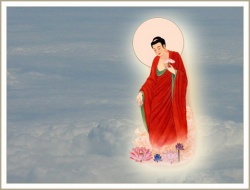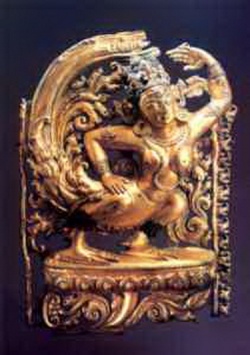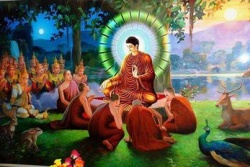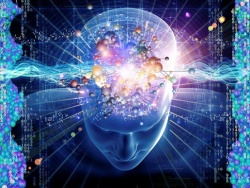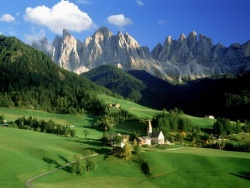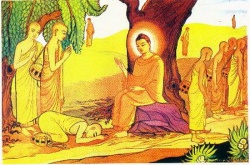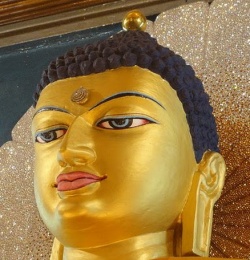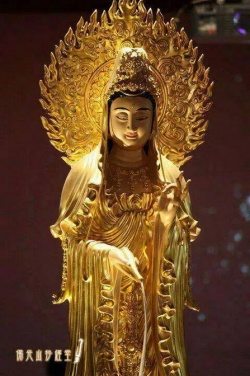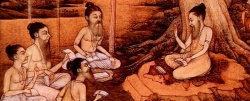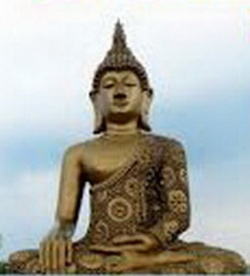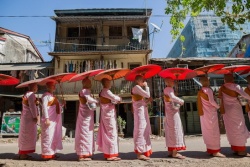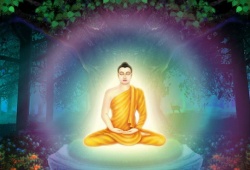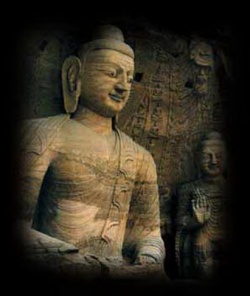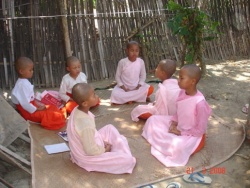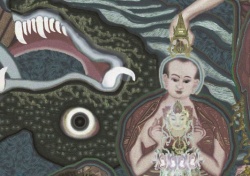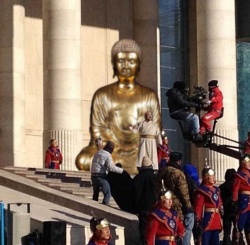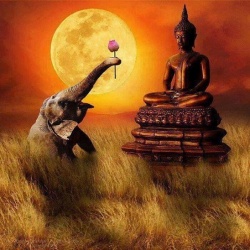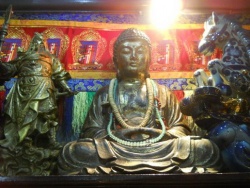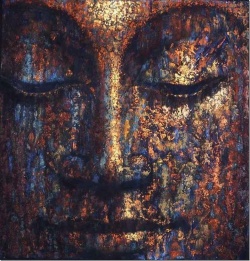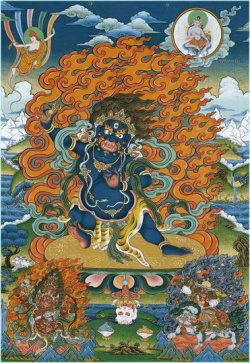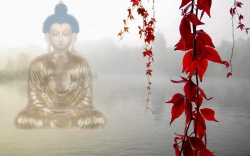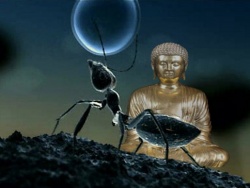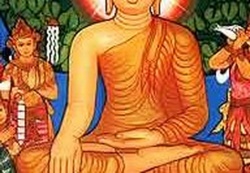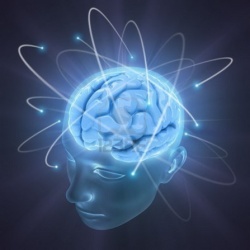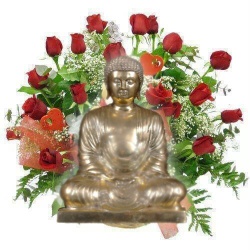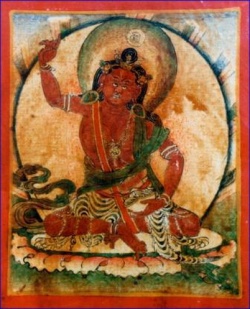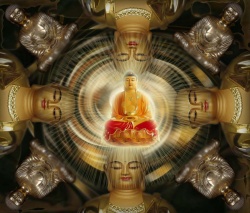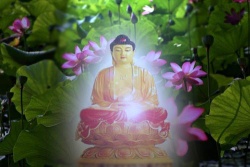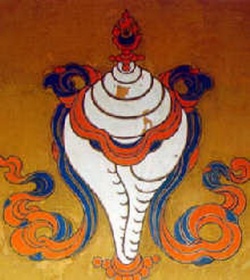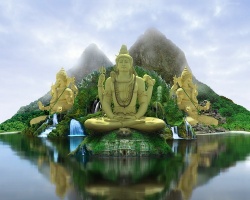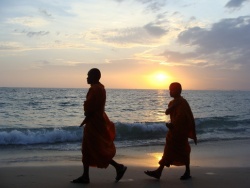Difference between revisions of "The Tibetan Book of the Dead - Book I - by Karma Lingpa"
(Created page with "=== The Chikhai Bardo and the Chönyid Bardo === : Herein lieth the setting-face-to-face to the reality in the intermediate state: the great deliverance by hearing while ...") |
m (Text replacement - "first stage" to "first stage") |
||
| (11 intermediate revisions by 2 users not shown) | |||
| Line 1: | Line 1: | ||
| − | + | <nomobile>{{DisplayImages|2715|1091|1385|2400|2907|820|1375|900|82|2934|4459|1060|2561|4064|3596|2174|4247|414|2977|960|3800|3341|52|4185|1589|4139|4333|3165|495|1088|2329|1396|2567|3375|12|4014|250|2589|1403|3232|30|4009|1448|770|2803|1471|1179|2914|1164|3651|2005|3996|2576|3407|507|4151|2089|1441|814|2045|1683|4071|4143|3546|273|1264|2186}}</nomobile> | |
| − | : Herein lieth the setting-face-to-face to the reality in the intermediate state: the great deliverance by hearing while on the after-death plane, from 'The Profound Doctrine of the Emancipating of the Consciousness by Meditation Upon the Peaceful and Wrathful Deities' | + | === The [[Chikhai Bardo]] and the [[Chönyid Bardo]] === |
| + | |||
| + | |||
| + | : Herein lieth the setting-face-to-face to the [[reality]] in the [[intermediate state]]: the great [[deliverance]] by hearing while on the [[after-death plane]], from 'The [[Profound Doctrine of the Emancipating of the Consciousness by Meditation Upon the Peaceful and Wrathful Deities]]' | ||
| + | |||
=== The Obeisances === | === The Obeisances === | ||
| − | *To the Divine Body of Truth, the Incomprehensible, Bound-less Light; | + | |
| − | *To the Divine Body of Perfect Endowment, Who are the Lotus and the Peaceful and the Wrathful Deities; | + | *To the [[Divine Body of Truth]], the Incomprehensible, Bound-less Light; |
| − | *To the Lotus-born Incarnation, Padma Sambhava, Who is the Protector of all sentient beings; | + | *To the [[Divine Body of Perfect Endowment]], Who are the [[Lotus]] and the [[Peaceful]] and the [[Wrathful Deities]]; |
| − | *To the Gurus, the Three Bodies, obeisance. | + | *To the [[Lotus-born Incarnation]], [[Padma Sambhava]], Who is the [[Protector]] of all [[sentient beings]]; |
| + | *To the [[Gurus]], the [[Three Bodies]], obeisance. | ||
| + | |||
=== The Introduction === | === The Introduction === | ||
| − | |||
| − | At first, the preliminaries, The Guide Series, for emancipating beings, should be mastered by practice. | + | This [[Great Doctrine of Liberation by Hearing]], which conferreth [[spiritual]] freedom on {{Wiki|devotees}} of ordinary wit while in the [[Intermediate State]], hath [[three divisions]]: the preliminaries, the subject-matter, and the conclusion. |
| + | |||
| + | At first, the preliminaries, The Guide Series, for emancipating [[beings]], should be mastered by practice. | ||
| + | |||
| − | |||
| − | + | === The [[Transference of the Consciousness-Principle]] === | |
| − | |||
| − | |||
| − | + | By The Guide, the [[highest]] intellects ought most certainly to be {{Wiki|liberated}}; but should they not be {{Wiki|liberated}}, then while in the [[Intermediate State]] of the Moments of [[Death]] they should practice the [[Transference]], which giveth automatic [[liberation]] by one's merely remembering it. | |
| − | + | {{Wiki|Devotees}} of ordinary wit ought most certainly to be freed thereby; but should they not be freed, then, while in the [[Intermediate State]] [during the experiencing] of [[Reality]], they should persevere in the listening to this Great [[Doctrine]] of [[Liberation]] by Hearing. | |
| − | + | Accordingly, the [[devotee]] should at first examine the symptoms of [[death]] as they gradually appear in his dying [[body]], following [[Self-Liberation]] [by Observing the] [[Characteristics]] [of the] Symptoms of [[Death]]. Then, when all the symptoms of [[death]] are complete [he should] apply the [[Transference]], which conferreth [[liberation]] by merely remembering [the process]. | |
| − | |||
| − | === The | + | === The [[Reading of this Thödol]] === |
| − | |||
| − | If | + | If the [[Transference]] hath been effectually employed, there is no need to read this [[Thödol]]; but if the [[Transference]] hath not been effectually employed, then this [[Thödol]] is to be read, correctly and distinctly, near the [[dead]] [[body]]. |
| − | + | If there be no corpse, then the bed or the seat to which the deceased had been accustomed should be occupied [by the reader], who ought to expound the power of the [[Truth]]. Then, summoning the [[spirit of the deceased]], [[imagine]] it to be {{Wiki|present}} there listening, and read. During this time no [[relative]] or fond mate should be allowed to weep or to wail, as such is not good [for the deceased]; so restrain them. | |
| − | + | If the [[body]] be {{Wiki|present}}, just when the expiration hath ceased, either a [[lāma]] [who hath been as a [[guru]] to the deceased], or a brother in the [[Faith]] whom the deceased trusted, or a [[friend]] for whom the deceased had great {{Wiki|affection}}, putting the lips close to the {{Wiki|ear}} [of the [[body]] without actually [[touching]] it, should read this Great [[Thödol]]. | |
| − | |||
| − | |||
| − | === The | + | === The [[Practical Application of this Thödol by the Officiant]] === |
| − | |||
| − | + | Now for the explaining of the [[Thödol]] itself: | |
| − | Here [some there may be] who have listened much [to religious instructions] yet not recognized; and [some] who, though recognizing, are, nevertheless, weak in familiarity. But all classes of individuals who have received the practical teachings [called] Guides will, if this be applied to them, be set face to face with the fundamental Clear Light; and, without any Intermediate State, they will obtain the Unborn Dharma-Kāya, by the Great Perpendicular Path. | + | If thou canst [[gather]] together a grand [[offering]], offer it in {{Wiki|worship}} of the {{Wiki|Trinity}}. If such cannot be done, then arrange whatever can be [[gathered]] together as [[objects]] on which thou canst [[concentrate]] thy [[thoughts]] and [[mentally]] create as illimitable an [[offering]] as possible and {{Wiki|worship}}. |
| + | |||
| + | Then the '[[Path]] of Good Wishes Invoking the Aid of the [[Buddhas]] and [[Bodhisattvas]]' should be recited seven times or thrice. | ||
| + | |||
| + | After that, the '[[Path]] of Good Wishes Giving [[Protection]] from {{Wiki|Fear}} in the [[Bardo]]', and the '[[Path]] of Good Wishes for Safe Delivery from the [[Dangerous]] Pitfalls of the [[Bardo]]', it together with the '[[Root]] Words of the [[Bardo]]', are to be read distinctly and with the proper intonation. | ||
| + | |||
| + | Then this Great [[Thödol]] is to be read either seven times or thrice, according to the occasion. [First cometh] the setting-face-to-face [to the symptoms of [[death]] as they occur during the moments of [[death]]; [second] the application of the great vivid reminder, the setting-face-to-face to [[Reality]] while in the [[Intermediate State]]; and third, the methods of closing the doors of the [[womb]] while in the [[Intermediate State]] when [[seeking rebirth]]. | ||
| + | |||
| + | |||
| + | ==Part I== | ||
| + | |||
| + | |||
| + | === The [[Bardo of the Moments of Death]] === | ||
| + | |||
| + | |||
| + | |||
| + | ==== Instructions on the Symptoms of [[Death]], or the [[First Stage]] of the [[Chikhai Bardo]]: The [[Primary Clear Light Seen at the Moment of Death]] ==== | ||
| + | |||
| + | |||
| + | |||
| + | The first, the setting-face-to-face with the [[Clear Light]], during the [[Intermediate State]] of the Moments of [[Death]], is: | ||
| + | |||
| + | Here [some there may be] who have listened much [to [[religious]] instructions] yet not [[recognized]]; and [some] who, though [[recognizing]], are, nevertheless, weak in familiarity. But all classes of {{Wiki|individuals}} who have received the {{Wiki|practical}} teachings [called] Guides will, if this be applied to them, be set face to face with the fundamental [[Clear Light]]; and, without any [[Intermediate State]], they will obtain the {{Wiki|Unborn}} [[Dharma-Kāya]], by the Great {{Wiki|Perpendicular}} [[Path]]. | ||
The manner of application is: | The manner of application is: | ||
| − | It is best if the guru from whom the deceased received guiding instructions can be had; but if the guru cannot be obtained, then a brother of the Faith; or if the latter is also unobtainable, then a learned man of the same Faith; or, should all these be unobtainable, then a person who can read correctly and distinctly ought to read this many times over. Thereby [the deceased] will be put in mind of what he had [previously] heard of the setting-face-to-face and will at once come to recognize that Fundamental Light and undoubtedly obtain Liberation. | + | It is best if the [[guru]] from whom the deceased received guiding instructions can be had; but if the [[guru]] cannot be obtained, then a brother of the [[Faith]]; or if the [[latter]] is also unobtainable, then a learned man of the same [[Faith]]; or, should all these be unobtainable, then a [[person]] who can read correctly and distinctly ought to read this many times over. Thereby [the deceased] will be put in [[mind]] of what he had [previously] heard of the setting-face-to-face and will at once come to [[recognize]] that Fundamental Light and undoubtedly obtain [[Liberation]]. |
As regards the time for the application [of these instructions]: | As regards the time for the application [of these instructions]: | ||
| − | When the expiration bath ceased, the vital-force will have sunk into the nerve-centre of Wisdom and the Knower will be experiencing the Clear Light of the natural condition. Then, the vital-force, being thrown backwards and flying downwards through the right and left nerves, the Intermediate State momentarily dawns. | + | When the expiration bath ceased, the [[vital-force]] will have sunk into the nerve-centre of [[Wisdom]] and the Knower will be experiencing the [[Clear Light]] of the natural [[condition]]. |
| + | |||
| + | Then, the [[vital-force]], being thrown backwards and flying downwards through the right and left {{Wiki|nerves}}, the [[Intermediate State]] momentarily dawns. | ||
| − | The above [directions] should be applied before [the vital-force hath] rushed into the left nerve [after first having traversed the navel nerve-centre | + | The above [[directions]] should be applied before [the [[vital-force]] hath] rushed into the left {{Wiki|nerve}} [after first having traversed the {{Wiki|navel}} nerve-centre. |
| − | The time [ordinarily necessary for this motion of the vital-force] is as long as the inspiration is still present, or about the time required for eating a meal. | + | The time [ordinarily necessary for this {{Wiki|motion}} of the [[vital-force]] is as long as the inspiration is still {{Wiki|present}}, or about the time required for eating a meal. |
Then the manner of the application [of the instructions] is: | Then the manner of the application [of the instructions] is: | ||
| − | When the breathing is about to cease, it is best if the Transference hath been applied efficiently; if [the application] hath been inefficient, then [address the deceased] thus: | + | When the [[breathing]] is about to cease, it is best if the [[Transference]] hath been applied efficiently; if [the application] hath been inefficient, then [address the deceased] thus: |
| + | |||
| + | |||
| + | O nobly-born (so and so by [[name]]), the time hath now come for thee to seek the [[Path]] in [[reality]]. Thy [[breathing]] is about to cease. Thy [[guru]] hath set thee face to face before with the [[Clear Light]]; | ||
| + | |||
| + | and now thou [[art]] about to [[experience]] it in its [[Reality]] in the [[Bardo state]], wherein all things are like the [[void]] and cloudless sky, | ||
| + | |||
| + | and the naked, spotless {{Wiki|intellect}} is like unto a transparent {{Wiki|vacuum}} without circumference or centre. At this [[moment]], know thou thyself; and abide in that [[state]]. I, too, at this time, am setting thee face to face. | ||
| + | |||
| + | |||
| + | Having read this, repeat it many times in the {{Wiki|ear}} of the [[person]] dying, even before the expiration hath ceased, so as to impress it on the [[mind]] [of the dying one]. | ||
| + | |||
| + | |||
| + | If the expiration is about to cease, turn the dying one over on the right side, which [[posture]] is called the '{{Wiki|Lying}} [[Posture]] of a [[Lion]]'. The throbbing of the {{Wiki|arteries}} [on the right and left side of the {{Wiki|throat}}] is to be pressed. | ||
| + | |||
| + | If the [[person]] dying be disposed to [[sleep]], or if the [[sleeping]] [[state]] advances, that should be arrested, and the {{Wiki|arteries}} pressed gently but firmly. Thereby the [[vital-force]] will not be able to return from the median-nerve and will be sure to pass out through the [[Brahmanic]] aperture. Now the real setting-face-to-face is to be applied. | ||
| + | |||
| + | |||
| + | At this [[moment]], the first [glimpsing] of the [[Bardo]] of the [[Clear Light of Reality]], which is the Infallible [[Mind]] of the [[Dharma-Kāya]], is [[experienced]] by all [[sentient beings]]. | ||
| + | |||
| + | The {{Wiki|interval}} between the [[cessation]] of the expiration and the [[cessation]] of the inspiration is the time during which the [[vital-force]] remaineth in the median-nerve. | ||
| + | |||
| + | |||
| + | The common [[people]] call this the [[state]] wherein the consciousness-principle hath fainted away. The duration of this [[state]] is uncertain. [It dependeth] upon the constitution, good or bad, and [the [[state]] of] the {{Wiki|nerves}} and [[vital-force]]. | ||
| − | + | In those who have had even a little {{Wiki|practical}} [[experience]] of the firm, [[tranquil]] [[state]] of [[dhyāna]], and in those who have [[sound]] {{Wiki|nerves}}, this [[state]] continueth for a long time. | |
| − | + | In the setting-face-to-face, the repetition [of the above address to the deceased] is to be persisted in until a yellowish liquid beginneth to appear from the various apertures of the [[bodily]] {{Wiki|organs}} [of the deceased]. | |
| − | + | In those who have led an [[evil]] [[life]], and in those of unsound {{Wiki|nerves}}, the above [[state]] endureth only so long as would take to snap a finger. Again, in some, it endureth as long as the time taken for the eating of a meal. | |
| − | |||
| − | + | In various [[Tantras]] it is said that this [[state]] of swoon endureth for about three and one-half days. | |
| − | + | Most other [[religious]] treatises say for four days; and that this setting-face-to-face with the [[Clear Light]] ought to be persevered in [during the whole time]. | |
| − | The | + | The manner of applying [these [[directions]] is: |
| − | |||
| − | + | If [when dying] one be by one's [[own]] [[self]] capable [of diagnosing the symptoms of [[death]], use [of the [[knowledge]] should have been made ere this. If [the dying [[person]] be] unable to do so, then either the [[guru]], or a [[Wikipedia:guru-shishya tradition|shishya]], | |
| − | + | or a brother in the [[Faith]] with whom the one [dying] was very intimate, should be kept at hand, who will vividly impress upon the one [dying] the symptoms [of [[death]] as they appear in due order [repeatedly saying, at first] thus: | |
| − | |||
| − | + | Now the symptoms of [[earth]] sinking into [[water]] are come. | |
| − | |||
| − | When all the symptoms [of death] are about to be completed, then enjoin upon [the one dying] this resolution, speaking in a low tone of voice in the ear: | + | When all the symptoms [of [[death]] are about to be completed, then enjoin upon [the one dying] this resolution, {{Wiki|speaking}} in a low tone of {{Wiki|voice}} in the {{Wiki|ear}}: |
| − | O nobly-born (or, if it be a priest, O Venerable Sir), let not thy mind be distracted. | + | O nobly-born (or, if it be a [[priest]], O [[Venerable]] Sir), let not thy [[mind]] be distracted. |
| − | If it be a brother | + | If it be a brother in the [[Faith]], or some other [[person]], then call him by [[name]], and [say] thus: |
| − | O nobly-born, that which is called death being come to thee now, resolve thus: 'O this now is the hour of death. By taking advantage of this death, I will so act, for the good of all sentient beings, peopling the illimitable expanse of the heavens, as to obtain the Perfect Buddhahood, by resolving on love and compassion towards [them, and by directing my entire effort to] the Sole Perfection.' | + | O nobly-born, that which is called [[death]] being come to thee now, resolve thus: 'O this now is the hour of [[death]]. By taking advantage of this [[death]], I will so act, for the good of all [[sentient beings]], peopling the illimitable expanse of the [[heavens]], as to obtain the [[Perfect Buddhahood]], by resolving on [[love]] and [[compassion]] towards [them, and by directing my entire [[effort]] to] the Sole [[Perfection]].' |
| − | Shaping the thoughts thus, especially at this time when the Dharma-Kāya of Clear Light | + | Shaping the [[thoughts]] thus, especially at this time when the [[Dharma-Kāya]] of [[Clear Light]] in the [[state]] after [[death]] can be [[realized]] for the [[benefit]] of all [[sentient beings]], know that thou [[art]] in that [[state]]; [and resolve] that thou wilt obtain the best boon of the [[State]] of the Great [[Symbol]], in which thou [[art]], [as follows]: |
| − | |||
| − | + | 'Even if I cannot realize it, yet will I know this [[Bardo]], and, mastering the Great [[Body]] of Union in [[Bardo]], will appear in whatever shape will [[benefit]] [all [[beings]] whomsoever: I will serve all [[sentient beings]], [[infinite]] in number as are the limits of the sky.' | |
| − | + | Keeping thyself unseparated from this resolution, thou shouldst try to remember whatever devotional practices thou went accustomed to perform during thy [[lifetime]]. | |
| − | |||
| − | + | In saying this, the reader shall put his lips close to the {{Wiki|ear}}, and shall repeat it distinctly, clearly impressing it upon the dying [[person]] so as to prevent his [[mind]] from wandering even for a [[moment]]. | |
| − | + | After the expiration hath completely ceased, press the {{Wiki|nerve}} of [[sleep]] firmly; and, a [[lāma]], or a [[person]] higher or more learned than thyself, impress in these words, thus: | |
| − | |||
| − | + | [[Reverend]] Sir, now that thou [[art]] experiencing the Fundamental [[Clear Light]], try to abide in that [[state]] which now thou [[art]] experiencing. | |
| − | + | And also in the case of any other [[person]] the reader shall set him face-to-face thus: | |
| − | + | O nobly-born (so-and-so), listen. Now thou [[art]] experiencing the Radiance of the [[Clear Light]] of [[Pure]] [[Reality]]. [[Recognize]] it. O nobly-born, thy {{Wiki|present}} {{Wiki|intellect}}, in real [[nature]] [[void]], not formed into anything as regards [[characteristics]] or {{Wiki|colour}}, naturally [[void]], is the very [[Reality]], the All-Good. | |
| − | |||
| − | + | Thine [[own]] {{Wiki|intellect}}, which is now [[voidness]], yet not to be regarded as of the [[voidness]] of [[nothingness]], but as being the {{Wiki|intellect}} itself, unobstructed, shining, thrilling, and [[blissful]], is the very [[consciousness]], the All-good [[Buddha]]. | |
| − | + | Thine [[own]] [[consciousness]], not formed into anything, in [[reality]] [[void]], and the {{Wiki|intellect}}, shining and [[blissful]], -- these two, -- are [[inseparable]]. The union of them is the [[Dharma-Kāya]] [[state]] of [[Perfect Enlightenment]]. | |
| − | |||
| − | + | Thine [[own]] [[consciousness]], shining, [[void]], and [[inseparable]] from the Great [[Body]] of Radiance, hath no [[birth]], nor [[death]], and is the Immutable Light -- [[Buddha Amitābha]]. | |
| − | + | [[Knowing]] this is sufficient. [[Recognizing]] the [[voidness]] of thine [[own]] {{Wiki|intellect}} to be [[Buddhahood]], and looking upon it as being thine [[own]] [[consciousness]], is to keep thyself in the [[state]] of the [[divine]] [[mind]] of the [[Buddha]]. | |
| − | + | Repeat this distinctly and clearly three or [even] seven times. That will recall to the [[mind]] [of the dying one] the former [i.e. when living] setting-face-to-face by the [[guru]]. | |
| − | + | Secondly, it will [[cause]] the naked [[consciousness]] to be [[recognized]] as the [[Clear Light]]; and, thirdly, [[recognizing]] one's [[own]] [[self]] [thus], one becometh permanently united with the [[Dharma-Kāya]] and [[Liberation]] will be certain. | |
| − | |||
| − | O thou of noble-birth, meditate upon thine own tutelary deity. -- | + | |
| + | ==[[Instructions Concerning the Second Stage of the Chikhai Bardo]]: The [[Secondary Clear Light Seen Immediately After Death]]== | ||
| + | |||
| + | |||
| + | |||
| + | |||
| + | Thus the primary [[Clear Light]] is [[recognized]] and [[Liberation]] [[attained]]. But if it be feared that the [[primary Clear Light]] hath not been [[recognized]], then it can certainly be assumed there is dawning [upon the deceased] that called the secondary [[Clear Light]], which dawneth in somewhat more than a meal-time period after that the expiration hath ceased. | ||
| + | |||
| + | |||
| + | According to one's good or [[bad karma]], the [[vital-force]] floweth down into either the right or left {{Wiki|nerve}} and goeth out through any of the apertures [of the [[body]]. Then cometh a lucid [[condition]] of the [[mind]]. | ||
| + | |||
| + | To say that the [[state]] [of the [[primary Clear Light]] endureth for a meal-time period would depend upon the good or bad [[condition]] of the {{Wiki|nerves}} and also whether there hath been previous practice or not [in the setting-face-to-face]. | ||
| + | |||
| + | |||
| + | When the [[consciousness]]-principle getteth outside [the [[body]], it sayeth to itself], 'Am I [[dead]], or am I not [[dead]]?' It cannot determine. It seeth its relatives and connexions as it had been used to [[seeing]] them before. It even heareth the wailings. | ||
| + | |||
| + | The {{Wiki|terrifying}} [[karmic]] [[illusions]] have not yet dawned. Nor have the frightful apparitions or [[experiences]] [[caused]] by the [[Lords]] of [[Death]] yet come. | ||
| + | |||
| + | |||
| + | During this {{Wiki|interval}}, the [[directions]] are to be applied [by the [[lāma]] or reader]: | ||
| + | |||
| + | There are those [{{Wiki|devotees}}] of the perfected stage and of the [[visualizing]] stage. | ||
| + | If it be one who was in the perfected stage, then call him thrice by [[name]] and repeat over and over again the above instructions of setting-face-to-face with the [[Clear Light]]. | ||
| + | |||
| + | If it be one who was in the [[visualizing]] stage, then read out to him the introductory descriptions and the text of the [[Meditation]] on his [[Wikipedia:tutelary deity|tutelary deity]], and then say, | ||
| + | |||
| + | |||
| + | O thou of noble-birth, [[meditate]] upon thine [[own]] [[Wikipedia:tutelary deity|tutelary deity]]. -- | ||
| + | |||
| + | Here the [[deity's]] [[name]] is to be mentioned by the reader.] Do not be distracted. Earnestly [[concentrate]] thy [[mind]] upon thy [[Wikipedia:tutelary deity|tutelary deity]]. | ||
| + | |||
| + | [[Meditate]] upon him as if he were the {{Wiki|reflection}} of the [[moon]] in [[water]], apparent yet in-existent [in itself]. [[Meditate]] upon him as if he were a being with a [[physical body]]. | ||
| + | |||
So saying, [the reader will] impress it. | So saying, [the reader will] impress it. | ||
| − | If [the deceased be] of the common folk, say, | + | If [the deceased be] of the common {{Wiki|folk}}, say, |
| − | Meditate upon the Great Compassionate Lord. | + | [[Meditate]] upon the Great [[Compassionate]] Lord. |
| − | |||
| − | + | By thus being set-face-to-face even those who would not be expected to [[recognize]] the [[Bardo]] [unaided] are undoubtedly certain to [[recognize]] it. | |
| − | + | Persons who while living had been set face to face [with the [[Reality]] by a [[guru]], yet who have not made themselves familiar with it, will not be able to [[recognize]] the [[Bardo]] clearly by themselves. Either a [[guru]] or a brother in the [[Faith]] will have to impress vividly such persons. | |
| − | |||
| − | + | There may be even those who have made themselves familiar with the teachings, yet who, because of the [[violence]] of the {{Wiki|disease}} causing [[death]], may be [[mentally]] unable to withstand [[illusions]]. | |
| − | + | For such, also, this instruction is absolutely necessary. | |
| − | + | Again [there are those] who, although previously familiar with the teachings, have become liable to pass into the [[miserable]] states of [[existence]], owing to breach of [[vows]] or failure to perform [[essential]] obligations honestly. To them, this [instruction] is indispensable. | |
| − | |||
| − | |||
| − | |||
| − | + | If the first stage of the [[Bardo]] [[path]] been taken by the forelock, that is best. But if not, by application of this {{Wiki|distinct}} recalling [to the deceased], while in the second stage of the [[Bardo]], his {{Wiki|intellect}} is [[awakened]] and attaineth [[liberation]]. | |
| − | + | While on the second stage of the [[Bardo]], one's [[body]] is of the [[nature]] of that called the shining [[illusory-body]]. | |
| − | + | Not [[knowing]] whether [he be] [[dead]] or not, [a [[state]] of] [[lucidity]] cometh [to the deceased. If the instructions be successfully applied to the deceased while he is in that [[state]], then, by the meeting of the Mother-Reality and the Offspring-Reality, [[karma]] controlleth not. Like the sun's rays, for example, dispelling the {{Wiki|darkness}}, the [[Clear Light]] on the [[Path]] dispelleth the power of [[karma]]. | |
| − | + | That which is called the second stage of the [[Bardo]] dawneth upon the thought-body. | |
| − | + | The Knower' hovereth within those places to which its [[activities]] had been limited. If at this time this special [[teaching]] be applied efficiently, then the {{Wiki|purpose}} will be fulfilled; for the [[karmic]] [[illusions]] will not have come yet, and, therefore, he [the deceased] cannot be turned hither and thither from his aim of achieving [[Enlightenment]]. | |
| − | |||
| − | |||
| − | + | ==Part II== | |
| − | + | == The [[Bardo of the Experiencing of Reality]]== | |
| − | |||
| − | + | == [[Introductory Instructions Concerning the Experiencing of Reality During the Third Stage of the Bardo, Called the Chönyid Bardo, when the Karmic Apparitions Appear]] == | |
| − | |||
| − | |||
| − | |||
| − | |||
| − | |||
| − | |||
| − | + | But even though the [[Primary Clear Light]] be not [[recognized]], the [[Clear Light]] of the second [[Bardo]] being [[recognized]], [[Liberation]] will be [[attained]]. If not {{Wiki|liberated}} even by that, then that called the third [[Bardo]] or the [[Chönyid Bardo]] dawneth. | |
| − | |||
| − | + | In this third stage of the [[Bardo]], the [[karmic]] [[illusions]] come to shine. It is very important that this Great Setting-face-to-face of the [[Chönyid Bardo]] be read: it hath much power and can do much good. | |
| − | |||
| − | + | About this time [the deceased] can see that the share of [[food]] is being set aside, that the [[body]] is being stripped of its garments, that the place of the sleeping-rug is being swept; can hear all the weeping and wailing of his friends and relatives, and, although he can see them and can hear them calling upon him, they cannot hear him calling upon them, so he goeth away displeased. | |
| − | |||
| − | + | At that time, {{Wiki|sounds}}, lights, and rays -- all three -- are [[experienced]]. These awe, frighten, and terrify, and [[cause]] much {{Wiki|fatigue}}. At this [[moment]], this setting-face-to-face with the [[Bardo]] [during the experiencing] of [[Reality]] is to be applied. Call the deceased by [[name]], and correctly and distinctly explain to him, as follows: | |
| − | |||
| − | |||
| − | + | O nobly-born, listen with full [[attention]], without being distracted: There are [[six states]] of [[Bardo]], namely: the natural [[state]] of [[Bardo]] while in the [[womb]]; the [[Bardo]] of the [[dream-state]]; the [[Bardo]] of {{Wiki|ecstatic}} {{Wiki|equilibrium}}, while in deep [[meditation]]; the [[Bardo of the moment of death]]; the [[Bardo]] [during the experiencing] of [[Reality]]; the [[Bardo]] of the inverse process of [[sangsaric]] [[existence]]. These are the six. | |
| − | |||
| − | + | O nobly-born, thou wilt [[experience]] [[three Bardos]], the [[Bardo of the moment of death]], the [[Bardo]] [during the experiencing] of [[Reality]], and the [[Bardo]] while [[seeking rebirth]]. Of these three, up to yesterday, thou hadst [[experienced]] the [[Bardo of the moment of death]]. | |
| − | + | Although the [[Clear Light of Reality]] dawned upon thee, thou wert unable to hold on, and so thou hast to wander here. Now henceforth thou [[art]] going to [[experience]] the [other] two, the [[Chönyid Bardo]] and the [[Sidpa Bardo]]. | |
| − | |||
| − | At this stage, thou must not be awed by the divine blue light which will appear shining, dazzling, and glorious; and be not startled by it. That is the light of the Tathagata called the Light of the Wisdom of the Dharma-Dhātu. Put thy faith in it, believe in it firmly, and pray unto it, thinking in thy mind that it is the light proceeding from the heart of the Bhagavān Vairochana coming to receive thee while in the dangerous ambuscade of the Bardo. That light is the light of the grace of Vairochana. | + | Thou wilt pay undistracted [[attention]] to that with which I am about to set thee face to face, and hold on: |
| + | |||
| + | O nobly-born, that which is called [[death]] hath now come. Thou [[art]] departing from this [[world]], but thou [[art]] not the only one; [[death]] cometh to all. Do not [[cling]], in fondness and weakness, to this [[life]]. | ||
| + | |||
| + | Even though thou clingest out of weakness, thou hast not the power to remain here. Thou wilt gain nothing more than wandering in this Sangsāra. Be not [[attached]] to this [[world]]; be not weak. | ||
| + | |||
| + | Remember the [[Precious]] {{Wiki|Trinity}}. | ||
| + | |||
| + | O nobly-born, whatever {{Wiki|fear}} and {{Wiki|terror}} may come to thee in the [[Chönyid Bardo]], forget not these words; and, bearing their meaning at [[heart]], go forwards: in them lieth the [[vital]] secret of {{Wiki|recognition}}. | ||
| + | |||
| + | <poem>'Alas! when the Uncertain Experiencing of [[Reality]] is dawning upon me here, | ||
| + | With every [[thought]] of {{Wiki|fear}} or {{Wiki|terror}} or awe for all [[apparitional]] [[appearances]] set aside, | ||
| + | May I [[recognize]] whatever [[visions]] appear, as the reflections of mine [[own]] [[consciousness]]; | ||
| + | |||
| + | May I know them to be of the [[nature]] of apparitions in the [[Bardo]]: | ||
| + | |||
| + | When at this all-important [[moment]] [of opportunity] of achieving a great end, | ||
| + | May I not {{Wiki|fear}} the bands of [[Peaceful]] and [[Wrathful]] [[Deities]], mine [[own]] [[thought-forms]].'</poem> | ||
| + | |||
| + | |||
| + | |||
| + | Repeat thou these [verses] clearly, and remembering their significance as thou repeatest them, go forwards, [O nobly-born]. Thereby, whatever [[visions]] of awe or {{Wiki|terror}} appear, {{Wiki|recognition}} is certain; and forget not this [[vital]] secret [[art]] {{Wiki|lying}} therein. | ||
| + | |||
| + | |||
| + | O nobly-born, when thy [[body]] and [[mind]] were separating, thou must have [[experienced]] a glimpse of the [[Pure]] [[Truth]], {{Wiki|subtle}}, sparkling, bright, dazzling, glorious, and radiantly awesome, in [[appearance]] like a [[mirage]] moving across a landscape in spring-time in one continuous {{Wiki|stream}} of {{Wiki|vibrations}}. | ||
| + | |||
| + | Be not daunted thereby, nor terrified, nor awed. That is the radiance of thine [[own]] [[true nature]]. [[Recognize]] it. | ||
| + | |||
| + | From the midst of that radiance, the natural [[sound]] of [[Reality]], reverberating like a thousand thunders simultaneously sounding, will come. That is the natural [[sound]] of thine [[own]] real [[self]]. Be not daunted thereby, nor terrified, nor awed. | ||
| + | |||
| + | |||
| + | |||
| + | The [[body]] which thou hast now is called the thought-body of propensities. Since thou hast not a [[material body]] of flesh and {{Wiki|blood}}, whatever may come -- {{Wiki|sounds}}, lights, or rays -- are, all three, unable to harm thee: thou [[art]] incapable of dying. | ||
| + | |||
| + | It is quite sufficient for thee to know that these apparitions are thine [[own]] thought-forms. [[Recognize]] this to be the [[Bardo]]. | ||
| + | |||
| + | O nobly-born, if thou dost not now [[recognize]] thine [[own]] thought-forms, whatever of [[meditation]] or of devotions thou mayst have performed while in the [[human world]] -- if thou hast not met with this {{Wiki|present}} [[teaching]] -- the lights will daunt thee, the {{Wiki|sounds}} will awe thee, and the rays will terrify thee. | ||
| + | |||
| + | Shouldst thou not know this all-important key to the teachings -- not being able to [[recognize]] the {{Wiki|sounds}}, lights, and rays -- thou wilt have to wander in the [[Sangsāra]]. | ||
| + | |||
| + | |||
| + | ==== The [[Dawning of the Peaceful Deities, from the First to the Seventh Day]] ==== | ||
| + | |||
| + | |||
| + | [Assuming that the deceased is [[karmically]] [[bound]] -- as the average departed one is -- to pass through the forty-nine days of the [[Bardo]] [[existence]], despite the very frequent settings-face-to-face, the daily trials and dangers which he must meet and attempt to {{Wiki|triumph}} over, during the first seven days, wherein dawn the [[Peaceful Deities]], | ||
| + | |||
| + | are next explained to him in detail; the first day, judging from the text, | ||
| + | |||
| + | being reckoned from the time in which normally he would be expected to wake up to the fact that he is [[dead]] and on the way back to [[rebirth]], or about three and one-half to four days after [[death]]. | ||
| + | |||
| + | |||
| + | ==The [[First Day]]== | ||
| + | |||
| + | |||
| + | O nobly-born, thou hast been in a swoon during the last three and one-half days. As soon as thou [[art]] recovered from this swoon, thou wilt have the [[thought]], 'what hath happened!' | ||
| + | |||
| + | |||
| + | Act so that thou wilt [[recognize]] the [[Bardo]]. At that time, all the Sangsāra will be in {{Wiki|revolution}}; and the [[phenomenal]] [[appearances]] that thou wilt see then will be the radiances and [[deities]]. The whole heaves will appear deep blue. | ||
| + | |||
| + | |||
| + | Then, from the Central [[Realm]], called the Spreading Forth of the Seed, the [[Bhagavān]] [[Vairochana]], white in {{Wiki|colour}}, and seated upon a [[lion-throne]], bearing an [[eight-spoked wheel]] in his hand, and embraced by the Mother of the [[Space]] of [[Heaven]], will [[manifest]] himself to thee. | ||
| + | |||
| + | |||
| + | |||
| + | It is the [[aggregate of matter]] resolved into its [[primordial state]] which is the blue {{Wiki|light}}. | ||
| + | |||
| + | |||
| + | The [[Wisdom]] of the [[Dharma-Dhātu]], blue in {{Wiki|colour}}, shining, transparent, glorious, dazzling, from the [[heart]] of [[Vairochana]] as the [[Father-Mother]], will shoot forth and strike against thee with a {{Wiki|light}} so radiant that thou wilt scarcely be able to look at it. | ||
| + | |||
| + | Along with it, there will also shine a dull white {{Wiki|light}} from the [[devas]], which will strike against thee in thy front. | ||
| + | |||
| + | |||
| + | Thereupon, because of the power of [[bad karma]], the glorious blue {{Wiki|light}} of the [[Wisdom]] of the [[Dharma-Dhātu]] will produce in thee {{Wiki|fear}} and {{Wiki|terror}}, and thou wilt [with to] flee from it. | ||
| + | |||
| + | Thou wilt beget a fondness for the dull white {{Wiki|light}} of the [[devas]]. | ||
| + | |||
| + | At this stage, thou must not be awed by the [[divine]] blue {{Wiki|light}} which will appear shining, dazzling, and glorious; and be not startled by it. That is the {{Wiki|light}} of the [[Tathagata]] called the Light of the [[Wisdom]] of the [[Dharma-Dhātu]]. | ||
| + | |||
| + | Put thy [[faith]] in it, believe in it firmly, and pray unto it, [[thinking]] in thy [[mind]] that it is the {{Wiki|light}} proceeding from the [[heart]] of the [[Bhagavān]] [[Vairochana]] coming to receive thee while in the [[dangerous]] ambuscade of the [[Bardo]]. | ||
| + | |||
| + | That {{Wiki|light}} is the {{Wiki|light}} of the grace of [[Vairochana]]. | ||
| + | |||
| + | |||
| + | Be not fond of the dull white {{Wiki|light}} of the [[devas]]. | ||
| + | |||
| + | Be not [[attached]] [to it]; be not weak. If thou be [[attached]] to it, thou wilt wander into the [[abodes]] of the [[devas]] and be drawn into the whirl of the [[Six Lokas]]. | ||
| + | |||
| + | That is an interruption to obstruct thee on the [[Path of Liberation]]. Look not at it. Look at the bright blue {{Wiki|light}} in deep [[faith]]. Put thy whole [[thought]] earnestly upon [[Vairochana]] and repeat after me this [[prayer]]: | ||
| + | |||
| − | |||
<poem> | <poem> | ||
| − | 'Alas! when wandering in the Sangsāra, because of intense stupidity, | + | 'Alas! when wandering in the [[Sangsāra]], because of intense [[stupidity]], |
| − | On the radiant light-path of the Dharma-Dhātu Wisdom | + | On the radiant light-path of the [[Dharma-Dhātu]] [[Wisdom]] |
| − | May [I] be led by the Bhagavān Vairochana, | + | May [I] be led by the [[Bhagavān]] [[Vairochana]], |
| − | May the Divine Mother of Infinite Space by [my] rearguard; | + | May the [[Divine Mother]] of [[Infinite Space]] by [my] rearguard; |
| − | May [I] be led safely across the fearful ambush of the Bardo; | + | May [I] be led safely across the {{Wiki|fearful}} ambush of the [[Bardo]]; |
| − | May [I] be placed in the state of the All-Perfect Buddhahood.'</poem> | + | May [I] be placed in the [[state]] of the All-Perfect [[Buddhahood]].'</poem> |
| + | |||
| + | |||
| + | |||
| + | Praying thus, in intense [[humble]] [[faith]], [thou] wilt merge, in [[halo]] of [[rainbow light]], into the [[heart]] of [[Vairochana]], and obtain [[Buddhahood]] in the [[Sambhoga-Kāya]], in the Central [[Realm]] of the Densely-Packed. | ||
| + | |||
| − | |||
| − | + | == The [[Second Day]]== | |
| − | But if, notwithstanding this setting-face-to-face, through power of anger or obscuring karma one should be startled at the glorious light and flee, or be overcome by illusions, despite the prayer, on the Second Day, Vajra-Sattva and his attendant deities, as well as one's evil deeds [meriting] Hell, will come to receive one. | + | But if, notwithstanding this setting-face-to-face, through power of [[anger]] or {{Wiki|obscuring}} [[karma]] one should be startled at the glorious {{Wiki|light}} and flee, or be overcome by [[illusions]], despite the [[prayer]], on the Second Day, [[Vajra-Sattva]] and his attendant [[deities]], as well as one's [[evil]] [[deeds]] [meriting] [[Hell]], will come to receive one. |
| − | Thereupon the setting-face-to-face is, calling the deceased by name, thus: | + | Thereupon the setting-face-to-face is, calling the deceased by [[name]], thus: |
| − | |||
| − | + | O nobly-born, listen undistractedly. On the Second Day the [[pure]] [[form]] of [[water]] will shine as a white {{Wiki|light}}. At that time, from the deep blue Eastern [[Realm]] of Pre-eminent [[Happiness]], the [[Bhagavān]] [[Akshobhya]] [as] [[Vajra-Sattva]], blue in {{Wiki|colour}}, holding in his hand a five-pronged [[dorje]], | |
| − | + | seated upon an elephant-throne, and embraced by the Mother [[Māmakī]], will appear to thee, attended by the [[Bodhisattvas]] [[Kshitigarbha]] and [[Maitreya]], with the {{Wiki|female}} [[Bodhisattvas]], [[Lasema]] and [[Pushpema]]. These [[six Bodhy deities]] will appear to thee. | |
| − | |||
| − | Be not fond of the dull, smoke-coloured light from Hell. That is the path which openeth out to receive thee because of the power of accumulated evil karma from violent anger. If thou be attracted by it, thou wilt fall into the Hell-Worlds; and, falling therein, thou wilt have to endure unbearable misery, whence there is not certain time of getting out. That being an interruption to obstruct thee on the Path of Liberation, look not at it; and avoid anger. Be not attracted by it; be not weak. Believe in the dazzling bright white light; [and] putting thy whole heart earnestly upon the Bhagavān Vajra-Sattva, pray thus: | + | |
| + | The [[aggregate]] of thy [[principle]] of [[consciousness]], being in it's [[pure]] [[form]] -- which is the [[Mirror-like Wisdom]] -- will shine as a bright, radiant white {{Wiki|light}}, from the [[heart]] of [[Vajra-Sattva]], the [[Father-Mother]], | ||
| + | |||
| + | with such dazzling brilliancy and transparency that thou wilt scarcely be able to look at it, [and] will strike against thee. And a dull, smoke-coloured {{Wiki|light}} from [[Hell]] will shine alongside the {{Wiki|light}} of the [[Mirror-like Wisdom]] and will [also] strike against thee. | ||
| + | |||
| + | |||
| + | |||
| + | Thereupon, through the power of [[anger]], thou wilt beget {{Wiki|fear}} and be startled at the dazzling white {{Wiki|light}} and wilt [wish to] flee from it; thou wilt beget a [[feeling]] of fondness for the dull smoke-coloured {{Wiki|light}} from [[Hell]]. | ||
| + | |||
| + | Act then so that thou wilt not {{Wiki|fear}} that bright, dazzling, transparent white {{Wiki|light}}. | ||
| + | |||
| + | Know it to be [[Wisdom]]. Put thy [[humble]] and earnest [[faith]] in it. That is the {{Wiki|light}} of the grace of the [[Bhagavān]] [[Vajra-Sattva]]. | ||
| + | |||
| + | Think, with [[faith]], 'I will [[take refuge]] in it'; and pray. | ||
| + | |||
| + | |||
| + | |||
| + | That is the [[Bhagavān]] [[Vajra-Sattva]] coming to receive thee and to save thee from the {{Wiki|fear}} and {{Wiki|terror}} of the [[Bardo]]. Believe in it; for it is the hook of the rays of grace of [[Vajra-Sattva]]. | ||
| + | |||
| + | |||
| + | |||
| + | Be not fond of the dull, smoke-coloured {{Wiki|light}} from [[Hell]]. That is the [[path]] which openeth out to receive thee because of the power of [[accumulated]] [[evil karma]] from [[violent]] [[anger]]. | ||
| + | |||
| + | If thou be attracted by it, thou wilt fall into the Hell-Worlds; and, falling therein, thou wilt have to endure unbearable [[misery]], whence there is not certain time of getting out. | ||
| + | |||
| + | That being an interruption to obstruct thee on the [[Path of Liberation]], look not at it; and avoid [[anger]]. Be not attracted by it; be not weak. | ||
| + | |||
| + | Believe in the dazzling bright white {{Wiki|light}}; [and] putting thy whole [[heart]] earnestly upon the [[Bhagavān]] [[Vajra-Sattva]], pray thus: | ||
<poem> | <poem> | ||
| − | 'Alas! when wandering in the Sangsāra because of the power of violent anger, | + | |
| − | On the radiant light-path of the Mirror-like Wisdom, | + | |
| − | May [I] be led by the Bhagavān Vajra-Sattva, | + | 'Alas! when wandering in the Sangsāra because of the power of [[violent]] [[anger]], |
| − | May the Divine Mother Māmakī be [my] rear-guard; | + | On the radiant light-path of the [[Mirror-like Wisdom]], |
| − | May [I] be led safely across the fearful ambush of the Bardo; | + | May [I] be led by the [[Bhagavān]] [[Vajra-Sattva]], |
| − | And may [I] be placed in the state of the All-perfect Buddhahood.' | + | May the [[Divine Mother]] [[Māmakī]] be [my] rear-guard; |
| + | May [I] be led safely across the {{Wiki|fearful}} ambush of the [[Bardo]]; | ||
| + | And may [I] be placed in the [[state]] of the All-perfect [[Buddhahood]].' | ||
</poem> | </poem> | ||
| − | |||
| − | ===== The | + | Praying thus, in intense [[humble]] [[faith]], thou wilt merge, in [[rainbow light]], into the [[heart]] of the [[Bhagavān]] [[Vajra-Sattva]] and obtain [[Buddhahood]] in the Sambhoga-Kāya, in the Eastern [[Realm]] called Pre-eminently [[Happy]]. |
| + | |||
| + | |||
| + | |||
| + | == The [[Third Day]] == | ||
| + | |||
| + | |||
| + | |||
| + | Yet, even when set face to face in this way, some persons, because of [[obscurations]] from [[bad karma]], and from [[pride]], although the hook of the rays of grace [striketh against them], flee from it. | ||
| + | |||
| + | If one be one of them], then, on the [[Third Day]], the [[Bhagavān]] [[Ratna-Sambhava]] and his accompanying [[deities]], along with the light-path from the [[human world]], will come to receive one simultaneously. | ||
| + | |||
| + | |||
| + | Again, calling the deceased by [[name]], the setting-face-to-face is thus: | ||
| + | |||
| + | O nobly-born, listen undistractedly. On the Third Day the primal [[form]] of the [[element earth]] will shine forth as a [[yellow]] {{Wiki|light}}. At that time, from the Southern [[Realm]] Endowed with Glory, the [[Bhagavān]] [[Ratna-Sambhava]], [[yellow]] in {{Wiki|colour}} bearing a [[jewel]] in his hand, seated upon a horse-throne and embraced by the [[Divine Mother]] [[Sangyay-Chanma]], will shine upon thee. | ||
| + | |||
| + | |||
| + | |||
| + | The two [[Bodhisattvas]], [[Ākāsha-garbha]] and [[Samanta-Bhadra]], attended by the two {{Wiki|female}} [[Bodhisattvas]], [[Mahlaima]] and [[Dhupema]] -- in all, six Bodhic [[forms]] -- will come to shine from amidst a [[rainbow]] [[halo]] of {{Wiki|light}}. | ||
| + | |||
| + | |||
| + | The [[aggregate]] of {{Wiki|touch}} in its primal [[form]], as the [[yellow]] {{Wiki|light}} of the [[Wisdom of Equality]], dazzlingly [[yellow]], glorified with orbs having {{Wiki|satellite}} orbs of radiance, so clear and bright that the [[eye]] can scarcely look upon it, will strike against thee. | ||
| + | |||
| + | Side by side with it, the dull bluish-yellow {{Wiki|light}} from the [[human]] [[world]] will also strike against thy [[heart]], along with the [[Wisdom]] {{Wiki|light}}. | ||
| + | |||
| + | |||
| + | Thereupon, through the power of [[egotism]], thou wilt beget a {{Wiki|fear}} for the dazzling [[yellow]] {{Wiki|light}} and wilt [with to] flee from it. Thou wilt be fondly attracted towards the dull bluish-yellow {{Wiki|light}} from the [[human]] [[world]]. | ||
| + | |||
| + | |||
| + | At that time do not {{Wiki|fear}} that bright, dazzling-yellow, transparent {{Wiki|light}}, but know it to be [[Wisdom]]; in that [[state]], keeping thy [[mind]] resigned, [[trust]] in it earnestly and humbly. | ||
| + | |||
| + | If thou knowest it to be the radiance of thine [[own]] {{Wiki|intellect}} -- although thou exertest not thy [[humility]] and [[faith]] and [[prayer]] to it -- the [[Divine Body]] and Light will merge into thee inseparably, and thou wilt obtain [[Buddhahood]]. | ||
| + | |||
| + | |||
| + | |||
| + | If thou dost not [[recognize]] the radiance of thine [[own]] {{Wiki|intellect}}, think, with [[faith]], 'It is the radiance of the grace of the [[Bhagavān]] [[Ratna-Sambhava]]; I will [[take refuge]] in it'; and pray. It is the hook of the grace-rays of the [[Bhagavān]] [[Ratna-Sambhava]]; believe in it. | ||
| + | |||
| + | Be not fond of that dull bluish-yellow {{Wiki|light}} from the [[human]] [[world]]. | ||
| + | |||
| + | That is the [[path]] of thine [[accumulated]] propensities of [[violent]] [[egotism]] come to receive thee. If thou [[art]] attracted by it, thou wilt be born in the [[human world]] and have to [[suffer]] [[birth]], age, [[sickness]], and [[death]]; | ||
| + | |||
| + | and thou wilt have no chance of getting out of the quagmire of [[worldly existence]]. That is an interruption to obstruct thy [[path of liberation]]. Therefore, look not upon it, and abandon [[egotism]], abandon propensities; be not attracted towards it; be not weak. | ||
| + | |||
| + | Act so as to [[trust]] in that bright dazzling {{Wiki|light}}. Put thine earnest [[thought]], one-pointedly, upon the [[Bhagavān]] [[Ratna-Sambhava]]; and pray thus: | ||
| + | |||
| + | |||
| + | |||
| + | <poem> 'Alas! when wandering in the [[Sangsāra]] because of the power of [[violent]] [[egotism]], | ||
| + | on the radiant light-path of the [[Wisdom of Equality]], | ||
| + | May [I] be led by the [[Bhagavān]] [[Ratna-Sambhava]]; | ||
| + | May the [[Divine Mother]], She-of-the-Buddha-Eye, be my rear-guard; | ||
| + | May [I] be led safely across the {{Wiki|fearful}} ambush of the [[Bardo]]; | ||
| + | And may [I] be placed in the [[state]] of the All-Perfect [[Buddhahood]].'</poem> | ||
| + | |||
| + | |||
| + | |||
| + | By praying thus, with deep [[humility]] and [[faith]], thou wilt merge into the [[heart]] of the [[Bhagavān]] [[Ratna-Sambhava]], the [[Divine]] [[Father-Mother]], in [[halo]] of [[rainbow light]], and attain [[Buddhahood]] in the [[Sambhoga-Kāya]], in the Southern [[Realm]] Endowed with Glory. | ||
| + | |||
| + | |||
| + | |||
| + | == The [[Fourth Day]]=== | ||
| + | |||
| + | |||
| + | |||
| + | By thus being set face to face, however weak the [[mental faculties]] may be, there is no [[doubt]] of one's gaining [[Liberation]]. | ||
| + | |||
| + | Yet, though so often set face to face, there are classes of men who, having created much [[bad karma]], or having failed in [[observance]] of [[vows]], or, | ||
| + | |||
| + | their lot for higher [[development]] being altogether lacking, prove unable to [[recognize]]: their [[obscurations]] and [[evil karma]] from covetousness and [[miserliness]] produce awe of the {{Wiki|sounds}} and radiances, and they flee. | ||
| + | |||
| + | If one be of these classes], then, on the [[Fourth Day]], the [[Bhagavān]] [[Amitābha]] and his attendant [[deities]], together with the light-path from the [[Preta-loka]], proceeding from [[miserliness]] and [[attachment]], will come to receive one simultaneously. | ||
| + | |||
| + | Again, the setting-face-to-face is, calling the deceased by [[name]], thus: | ||
| + | |||
| + | O nobly-born, listen undistractedly. On the [[Fourth Day]] the [[red]] {{Wiki|light}}, which is the primal [[form]] of the [[element fire]], will shine. | ||
| + | |||
| + | At that time, from the [[Red]] {{Wiki|Western}} [[Realm]] of [[Happiness]], the [[Bhagavān]] [[Buddha Amitābha]], [[red]] in {{Wiki|colour}}, | ||
| + | |||
| + | bearing a [[lotus]] in his hand, seated upon a peacock-throne and embraced by the [[Divine Mother]] [[Gökarmo]], will shine upon thee, [together with] the [[Bodhisattvas]] [[Chenrazee]] and [[Jampal]], attended by the {{Wiki|female}} [[Bodhisattvas]] [[Ghirdhima]] and [[Āloke]]. | ||
| + | |||
| + | The six [[bodies]] of [[Enlightenment]] will shine upon thee from amidst a [[halo]] of [[rainbow light]]. | ||
| + | |||
| + | |||
| + | |||
| + | The primal [[form]] of the [[aggregate]] of [[feelings]] as the [[red]] {{Wiki|light}} of the All-Discriminating [[Wisdom]], glitteringly [[red]], glorified with orbs and {{Wiki|satellite}} orbs, | ||
| + | |||
| + | bright, transparent, glorious and dazzling, proceeding from the [[heart]] of the [[Divine]] [[Father-Mother]] [[Amitābha]], will strike against thy [[heart]] [so radiantly] that thou wilt scarcely be able to look upon it. {{Wiki|Fear}} it not. | ||
| + | |||
| + | Along with it, a dull [[red]] {{Wiki|light}} from the [[Preta-loka]], coming side by side with the [[Light of Wisdom]], will also shine upon thee. Act so that thou shalt not be fond of it. Abandon [[attachment]] [and] weakness [for it]. | ||
| + | |||
| + | At that time, through the influence of intense [[attachment]], thou wilt become terrified by the dazzling [[red]] {{Wiki|light}}, and wilt [wish to] flee from it. And thou wilt beget a fondness for that dull [[red]] {{Wiki|light}} of the [[Preta-loka]]. | ||
| + | |||
| + | At that time, be not afraid of the glorious, dazzling, transparent, radiant [[red]] {{Wiki|light}}. [[Recognizing]] it as [[Wisdom]], keeping thine {{Wiki|intellect}} in a [[state]] of resignation, thou wilt merge [into it] inseparably and attain [[Buddhahood]]. | ||
| + | |||
| + | If thou dost not [[recognize]] it, think, 'It is the rays of the grace of the [[Bhagavān]] [[Amitābha]], and I will [[take refuge]] in it'; and, trusting humbly in it, pray unto it. | ||
| + | |||
| + | That is the hook-rays of the grace of the [[Bhagavān]] [[Amitābha]]. [[Trust]] in it humbly; flee not. Even if thou fleest, it will follow thee inseparably [from thyself]. {{Wiki|Fear}} it not. | ||
| + | |||
| + | |||
| + | Be not attracted towards the dull [[red]] {{Wiki|light}} of the [[Preta-loka]]. | ||
| + | |||
| + | That is the light-path proceeding from the [[accumulations]] of thine intense [[attachment]] [to sangsaric [[existence]] which hath come to receive thee. | ||
| + | |||
| + | If thou be [[attached]] thereto, thou wilt fall into the [[World]] of [[Unhappy]] [[Spirits]] and [[suffer]] unbearable [[misery]] from hunger and [[thirst]]. Thou wilt have no chance of gaining [[Liberation]] [therein]. | ||
| + | |||
| + | That dull [[red]] {{Wiki|light}} is an interruption to obstruct thee on the [[Path of Liberation]]. | ||
| + | |||
| + | Be not [[attached]] to it, and abandon habitual propensities. Be not weak. [[Trust]] in the bright dazzling [[red]] {{Wiki|light}}. | ||
| + | |||
| + | In the [[Bhagavān]] [[Amitābha]], the [[Father-Mother]], put thy [[trust]] one-pointedly and pray thus: | ||
| + | |||
| + | |||
| + | <poem> 'Alas! when wandering in the [[Sangsāra]] because of the power of intense [[attachment]], | ||
| + | On the radiant light-path of the [[Discriminating Wisdom]] | ||
| + | May [I] be led by the [[Bhagavān]] [[Amitābha]], | ||
| + | May the [[Divine Mother]], She-of-White-Raiment, be [my] rear-guard; | ||
| + | May [I] be safely led across the [[dangerous]] ambush of the [[Bardo]]; | ||
| + | And may [I] be placed in the [[state]] of the All-Perfect [[Buddhahood]].'</poem> | ||
| + | |||
| + | By praying thus, humbly and earnestly, thou wilt merge into the [[heart]] of the [[Divine]] [[Father-Mother]], the [[Bhagavān]] [[Amitābha]], in [[halo]] of rainbow-light, and attain [[Buddhahood]] in the [[Sambhoga-Kāya]], in the {{Wiki|Western}} [[Realm]] named [[Happy]]. | ||
| + | |||
| + | |||
| + | |||
| + | == The [[Fifth Day]] == | ||
| + | |||
| + | |||
| + | |||
| + | It is impossible that one should not be {{Wiki|liberated}} thereby. | ||
| + | |||
| + | Yet, though thus set face to face, [[sentient beings]], unable through long association with propensities to abandon propensities, and, through [[bad karma]] and [[jealousy]], awe and {{Wiki|terror}} being produced by the {{Wiki|sounds}} and radiances -- the hook-rays of grace failing to catch hold of them -- wander down also to the [[Fifth Day]]. | ||
| + | |||
| + | If one be such a [[sentient being]], thereupon the [[Bhagavān]] [[Amogha-Siddhi]], with his attendant [[deities]] and the {{Wiki|light}} and rays of his grace, will come to receive one. | ||
| + | |||
| + | A {{Wiki|light}} proceeding from the [[Asura-loka]], produced by the [[evil]] [[passion]] of [[jealousy]], will also come to receive one. | ||
| + | |||
| + | The setting-face-to-face at that time is, calling the deceased by [[name]], thus: | ||
| + | |||
| + | |||
| + | O nobly-born, listen undistractedly. On the [[Fifth Day]], the [[green]] {{Wiki|light}} of the primal [[form]] of the [[element]] [[air]] will shine upon thee. At that time, from the [[Green]] Northern [[Realm]] of Successful Performance of Best [[Actions]], the [[Bhagavān]] [[Buddha]] [[Amogha-Siddhi]], [[green]] in {{Wiki|colour}}, | ||
| + | |||
| + | |||
| + | bearing a crossed-dorje in hand, seated upon a sky-traversing Harpy-throne, embraced by the [[Divine Mother]], the Faithful [[Dölma]], will shine upon thee, with his attendants -- the two [[Bodhisattvas]] [[Chag-na-Dorje]] and [[Dibpanamsel]], attended by two {{Wiki|female}} [[Bodhisattvas]], [[Gandhema]] and [[Nidhema]]. | ||
| + | |||
| + | |||
| + | |||
| + | These six Bodhic [[forms]], from amidst a [[halo]] of [[rainbow light]], will come to shine. | ||
| + | |||
| + | |||
| + | The primal [[form]] of the [[aggregate]] of [[Wikipedia:Volition (psychology)|volition]], shining as the [[green]] {{Wiki|light}} of the [[All-Performing Wisdom]], dazzlingly [[green]], transparent and radiant, glorious and {{Wiki|terrifying}}, beautified with orbs surrounded by {{Wiki|satellite}} orbs of radiance, issuing from the [[heart]] of the [[Divine]] [[Father-Mother]] [[Amogha-Siddhi]], [[green]] in {{Wiki|colour}}, | ||
| + | |||
| + | |||
| + | will strike against thy [[heart]] [so wondrously bright] that thou wilt scarcely be able to look at it. {{Wiki|Fear}} it not. That is the natural power of the [[wisdom]] of thine [[own]] {{Wiki|intellect}}. Abide in the [[state]] f great resignation of impartiality. | ||
| + | |||
| + | |||
| + | |||
| + | Along with it [i.e. the [[green]] {{Wiki|light}} of the [[All-Performing Wisdom]], a {{Wiki|light}} of dull [[green]] {{Wiki|colour}} from the [[Asura-loka]], produced from the [[cause]] of the [[feeling]] of [[jealousy]], coming side by side with the [[Wisdom]] Rays, will shine upon thee. | ||
| + | |||
| + | [[Meditate]] upon it with impartiality, -- with neither [[repulsion]] nor [[attraction]]. Be not fond of it: if thou [[art]] of low [[mental]] capacity, be not fond of it. | ||
| + | |||
| + | |||
| + | Thereupon, through the influence of intense [[jealousy]], thou wilt be terrified at the dazzling radiance of the [[green]] {{Wiki|light}} and wilt [with to] flee from it; and thou wilt beget a fondness for that dull [[green]] {{Wiki|light}} of the [[Asura-loka]]. | ||
| + | |||
| + | At that time {{Wiki|fear}} not the glorious and transparent, radiant and dazzling [[green]] {{Wiki|light}}, but know it to be [[Wisdom]]; and in that [[state]] allow thine {{Wiki|intellect}} to rest in resignation. Or else [think], 'It is the hook-rays of the {{Wiki|light}} of grace of the [[Bhagavān]] [[Amogha-Siddhi]], which is the [[All-Performing Wisdom]].' Believe [thus] on it. Flee not from it. | ||
| + | |||
| + | Even though thou shouldst flee from it, it will follow thee inseparably [from thyself]. {{Wiki|Fear}} it not. Be not fond of that dull [[green]] {{Wiki|light}} of the [[Asura-loka]]. | ||
| + | |||
| + | That is the [[karmic]] [[path]] of acquired intense [[jealousy]], which hath come to receive thee. If thou [[art]] attracted by it, thou wilt fall into the [[Asura-loka]] and have to engage in unbearable miseries of quarrelling and warfare. [ | ||
| + | |||
| + | That is an interruption to obstruct thy [[path of liberation]]. Be not attracted by it. | ||
| + | |||
| + | Abandon thy propensities. Be not weak. [[Trust]] in the dazzling [[green]] radiance, and putting thy whole [[thought]] one-pointedly upon the [[Divine]] [[Father-Mother]], the [[Bhagavān]] [[Amogha-Siddhi]], pray thus: | ||
| + | |||
| + | <poem> 'Alas! when wandering in the Sangsāra because of the power of intense [[jealousy]], | ||
| + | On the radiant light-path of the [[All-Performing Wisdom]] | ||
| + | May[I] be led by the [[Bhagavān]] [[Amogha-Siddhi]]; | ||
| + | May the [[Divine Mother]], the Faithful [[Tārā]], be [my] rear-guard; | ||
| + | May [I] be led safely across the [[dangerous]] ambush of the [[Bardo]]; | ||
| + | And may [I] be placed in the [[state]] of the All-Perfect [[Buddhahood]].</poem>' | ||
| + | |||
| + | |||
| + | By [[prayer]] thus with intense [[faith]] and [[humility]], thou wilt merge into the [[heart]] of the [[Divine]] [[Father-Mother]], the [[Bhagavān]] [[Amogha-Siddhi]], in [[halo]] of [[rainbow light]], and attain [[Buddhahood]] in the [[Sambhoga-Kāya]], in the Northern [[Realm]] of Heaped-up [[Good Deeds]]. | ||
| + | |||
| + | |||
| + | |||
| + | == The [[Sixth Day]] == | ||
| + | |||
| − | |||
| − | + | Being thus set face to face at various stages, however weak one's [[karmic]] connexions may be, one should have [[recognized]] in one or the other of them; and where one has [[recognized]] in any of them it is impossible not to be {{Wiki|liberated}}. | |
| − | + | Yet, although set face to face so very often in that manner, one long habituated to strong propensities and lacking in familiarity with, and [[pure]] {{Wiki|affection}} for, [[Wisdom]], may be led backwards by the power of one's [[own]] [[evil]] inclinations despite these many introductions. | |
| − | The | + | The hook-rays of the {{Wiki|light}} of grace may not be able to catch hold of one: one may still wander downwards because of one's begetting the [[feeling]] of awe and {{Wiki|terror}} of the lights and rays. |
| − | |||
| − | At | + | Thereupon all the [[Divine]] Fathers-Mothers of the Five Orders of [[Dhyani Buddhas]] with their attendants will come to shine upon one simultaneously. At the same time, the lights proceeding from the [[Six Lokas]] will likewise come to shine upon one simultaneously. |
| − | + | The setting-face-to-face for that is, calling the deceased by [[name]], thus: | |
| − | |||
| − | + | O nobly-born, until yesterday each of the Five Orders of [[Deities]] had shone upon thee, one by one; and thou hadst been set face to face, but, owing to the influence of thine [[evil]] propensities, thou wert awed and terrified by them and hast remained here till now. | |
| − | |||
| − | |||
| − | |||
| − | |||
| − | |||
| − | + | If thou hadst [[recognized]] the radiances of the Five Orders of [[Wisdom]] to be the [[emanations]] from thine [[own]] thought-forms, ere this thou wouldst have obtained [[Buddhahood]] in the [[Sambhoga-Kāya]], through having been absorbed into the [[halo]] of [[rainbow light]] in one or another of the Five Orders of [[Buddhas]]. But now look on undistractedly. | |
| − | + | Now the lights of all Five Orders, called the Lights of the Union of Four [[Wisdoms]], will come to receive thee. Act so as to know them. | |
| − | + | O nobly-born, on this the Sixth Day, the four colours of the primal states of the [[four elements]] [[water]], [[earth]], [[fire]], [[air]] will shine upon thee simultaneously. | |
| − | + | At that time, from the Central [[Realm]] of the Spreading Forth of See, the [[Buddha Vairochana]], the [[Divine]] [[Father-Mother]], with the attendant [[deities]], will come to shine upon thee. | |
| − | + | From the Eastern [[Realm]] of Pre-eminent [[Happiness]], the [[Buddha]] [[Vajra-Sattva]], the [[Divine]] [[Father-Mother]], with the attendant [[deities]] will come to shine upon thee. | |
| − | + | From the Southern [[Realm]] endowed with Glory, the [[Buddha]] [[Ratna-Sambhava]], the [[Divine]] [[Father-Mother]], with the attendant [[deities]] will come to shine upon thee. | |
| − | + | From the [[Happy]] {{Wiki|Western}} [[Realm]] of Heaped-up [[Lotuses]], the [[Buddha Amitābha]], the [[Divine]] [[Father-Mother]], along with the attendant [[deities]] will come to shine upon thee. | |
| − | + | From the Northern [[Realm]] of Perfected [[Good Deeds]], the [[Buddha]] [[Amogha-Siddhi]], the [[Divine]] [[Father-Mother]], along with the attendants will come, amidst a [[halo]] of [[rainbow light]], to shine upon thee at this very [[moment]]. | |
| − | |||
| − | |||
| − | + | 'O nobly-born, on the outer circle of these five pair of [[Dhyani Buddhas]], the [four] Door-Keepers, the [[Wrathful]] [Ones]: the [[Victorious One]], the Destroyer of the [[Lord of Death]], | |
| − | |||
| − | |||
| − | |||
| − | |||
| − | |||
| − | + | the Horse-necked [[King]], the [[Urn]] of [[Nectar]], with the four {{Wiki|female}} Door-keepers: the Goad-Bearer, the Noose-Bearer, the Chain-Bearer, and the Bell-Bearer; | |
| − | + | along with the [[Buddha]] of the [[Devas]], named the One of Supreme Power, the [[Buddha]] of the [[Asuras]], named [He of] Strong {{Wiki|Texture}}, the [[Buddha]] of Mankind, named the [[Lion of the Shakyas]], | |
| − | + | the [[Buddha]] of the brute {{Wiki|kingdom}}, named the Unshakable [[Lion]], the [[Buddha]] of the [[Pretas]], named the One of Flaming {{Wiki|Mouth}}, and the [[Buddha]] of the Lower [[World]], named the [[King]] of [[Truth]]: -- [these], the Eight [[Father-Mother]] Door-keepers and the Six [[Teachers]], the [[Victorious Ones]] -- will come to shine, too. | |
| − | |||
| − | |||
| − | The | + | The All-Good Father, and the All-Good Mother, the Great {{Wiki|Ancestors}} of all the [[Buddhas]]: [[Samata-Bhadra]] and [[Samanta-Bhadrā]], the [[Divine]] Father and the [[Divine Mother]] -- these two, also will come to shine. |
| − | + | These forty-two perfectly endowed [[deities]], issuing from within thy [[heart]], being the product of thine [[own]] [[pure]] [[love]], will come to shine. | |
| − | |||
| − | + | Know them. | |
| − | |||
| − | |||
| − | |||
| − | |||
| − | |||
| − | |||
| − | + | O nobly-born, these [[realms]] are not come from somewhere outside [thyself]. They come from within the four divisions of thy [[heart]], which, including its centre, make the five [[directions]]. They issue from within there, and whine upon thee. | |
| − | + | The [[deities]], too, are not come from somewhere else: they [[exist]] from {{Wiki|eternity}} within the [[faculties]] of thine [[own]] {{Wiki|intellect}}. Know them to be of that [[nature]]. | |
| − | + | O nobly-born, the size of all these [[deities]] is not large, not small, [but] proportionate. | |
| − | + | They have their ornaments, their colours, their sitting [[postures]], their thrones, and the {{Wiki|emblems}} that each holds. | |
| − | |||
| − | + | These [[deities]] are formed into groups of five pairs, each group of five being surrounded by a fivefold circle of radiances, the {{Wiki|male}} [[Bodhisattvas]] partaking of the [[nature]] of the [[Divine]] Fathers, and the {{Wiki|female}} [[Bodhisattvas]] partaking of the [[nature]] of the [[Divine]] Mothers. | |
| − | + | All these [[divine]] conclaves will come to shine upon thee in one complete conclave. They are thine [[own]] [[tutelary deities]]. Know them to be such. | |
| − | O nobly-born, | + | O nobly-born, from the hearts of the [[Divine]] Fathers and Mothers of the Five Orders, the [[rays of light]] of the Four [[Wisdoms]] united, extremely clear and fine, like the [[rays of the sun]] spun into threads, will come and shine upon thee and strike against thy [[heart]]. |
| − | + | On that [[path]] of radiance there will come to shine glorious orbs of lights, blue in {{Wiki|colour}}, emitting rays, the [[Dharma-Dhātu]] [[Wisdom]] [itself], each appearing like an inverted {{Wiki|turquoise}} cup, surrounded by similar orbs, smaller in size, more glorious with five yet smaller [{{Wiki|satellite}}] orbs dotted round about with five starry spots of {{Wiki|light}} of the same [[nature]], leaving neither the centre nor the borders [of the blue light-path] unglorified by the orbs and the smaller [{{Wiki|satellite}}] orbs. | |
| − | |||
| − | + | From the [[heart]] of [[Vajra-Sattva]], the white light-path of the [[Mirror-like Wisdom]], white and transparent, glorious and dazzling, glorious and {{Wiki|terrifying}}, made more glorious with orbs surrounded by smaller orbs of transparent and [[radiant light]] upon it, each like an inverted [[mirror]], will come to shine. | |
| − | |||
| − | + | From the [[heart]] of [[Ratna-Sambhava]], the [[yellow]] light-path of the [[Wisdom of Equality]], [glorified] with [[yellow]] orbs [of radiance], each like an inverted {{Wiki|gold}} cup, surrounded by smaller orbs, and these with yet smaller orbs, will come to shine. | |
| − | |||
| − | + | From the [[heart]] of [[Amitābha]], the transparent, bright [[red]] light-path of the [[Discriminating Wisdom]], upon which are ors, like inverted {{Wiki|coral}} cups, emitting rays of [[Wisdom]], extremely bright and dazzling, each glorified with five [{{Wiki|satellite}}] orbs of the same [[nature]] -- leaving neither the centre nor the borders [of the [[red]] light-path] unglorified with orbs and smaller {{Wiki|satellite}} orbs -- will come to shine. | |
| − | + | These will come to shine against thy [[heart]] simultaneously. | |
| − | |||
| − | + | O nobly-born, all those are the radiances of thine [[own]] [[intellectual]] [[faculties]] come to shine. | |
| − | + | They have not come from any other place. Be not attracted towards them; be not weak; be not terrified; but abide in the [[mood]] of non-thought-formation. In that [[state]] all the [[forms]] and radiances will merge into thyself, and [[Buddhahood]] will be obtained. | |
| − | + | The [[green]] light-path of the [[Wisdom]] of Perfected [[Actions]] will not shine upon thee, because the Wisdom-faculty of thine {{Wiki|intellect}} hath not been perfectly developed. | |
| + | O nobly-born, those are called the Lights of the Four [[Wisdoms]] United, [whence proceeds that] which is called the Inner [[Path]] through [[Vajra-Sattva]]. | ||
| − | + | At that time, thou must remember the teachings of the setting-face-to-face which thou hast had from thy [[guru]]. | |
| − | + | If thou hast remembered the purport of the settings-face-to-face, thou wilt have [[recognized]] all these lights which have shone upon thee, as being the {{Wiki|reflection}} of thine [[own]] inner {{Wiki|light}}, and, having [[recognized]] them as intimate friends, thou wilt have believed in them and have understood [them at] the meeting, as a son understandeth his mother. | |
| − | |||
| − | |||
| − | And believing in the unchanging nature of the pure and holy Truth, thou wilt have had produced in thee the tranquil-flowing Samādhi; and, having merged into the body of the perfectly evolved intellect, thou wilt have obtained Buddhahood in the Sambhoga-Kāya, whence there is no return. | + | And believing in the [[unchanging]] [[nature]] of the [[pure]] and {{Wiki|holy}} [[Truth]], thou wilt have had produced in thee the tranquil-flowing [[Samādhi]]; and, having merged into the [[body]] of the perfectly evolved {{Wiki|intellect}}, thou wilt have obtained [[Buddhahood]] in the [[Sambhoga-Kāya]], whence there is no return. |
| − | O nobly-born, along with the radiances of Wisdom, the impure illusory lights of the Six Lokas will also come to shine. If it be asked, 'What are they?' [they are] a dull white light from the devas, a dull green light from the asuras, a dull yellow light from human beings, a dull blue light from the brutes, a dull reddish light from the pretas, and a dull smoke-coloured light from Hell | + | O nobly-born, along with the radiances of [[Wisdom]], the impure [[illusory]] lights of the [[Six Lokas]] will also come to shine. If it be asked, 'What are they?' [they are] a dull white {{Wiki|light}} from the [[devas]], a dull [[green]] {{Wiki|light}} from the [[asuras]], a dull [[yellow]] {{Wiki|light}} from [[human beings]], a dull blue {{Wiki|light}} from the brutes, a dull reddish {{Wiki|light}} from the [[pretas]], and a dull smoke-coloured {{Wiki|light}} from [[Hell]]. |
| − | + | These six thus will come to shine, along with the six radiances of [[Wisdom]]; whereupon, be not afraid of nor be attracted towards any, but allow thyself to rest in the non-thought [[condition]]. | |
| − | + | If thou [[art]] frightened by the [[pure]] radiances of [[Wisdom]] and attracted by the impure lights of the [[Six Lokas]], then thou wilt assume a [[body]] in any of the [[Six Lokas]] and [[suffer]] [[sangsaric]] miseries; and thou wilt never be emancipated from the Ocean of Sangsāra , wherein thou wilt be whirled round and round and made to {{Wiki|taste}} of the [[sufferings]] thereof. | |
| − | + | O nobly-born, if thou [[art]] one who hath not obtained the select words of the [[guru]], thou wilt have {{Wiki|fear}} of the [[pure]] radiances of [[Wisdom]] and of the [[deities]] thereof. | |
| − | <poem> 'Alas! when wandering in the Sangsāra through the power of the five virulent poisons, | + | Being thus frightened, thou wilt be attracted towards the impure sangsaric [[objects]]. Act not so. Humbly [[trust]] in the dazzling pu7re radiances of [[Wisdom]]. |
| − | On the bright radiance-path of the Four Wisdoms united, | + | |
| + | Frame thy [[mind]] to [[faith]], and think, 'The [[compassionate]] radiances of [[Wisdom]] of the Five Orders of [[Buddhas]] have come to take hold of me out of [[compassion]]; I [[take refuge]] in them.' | ||
| + | |||
| + | Not yielding to [[attraction]] towards the [[illusory]] lights of the [[Six Lokas]], but devoting thy whole [[mind]] one-pointedly towards the [[Divine]] Fathers and Mothers, the [[Buddhas]] of the Five Orders, pray thus: | ||
| + | |||
| + | |||
| + | <poem> 'Alas! when wandering in the [[Sangsāra]] through the power of the five virulent [[poisons]], | ||
| + | On the bright radiance-path of the Four [[Wisdoms]] united, | ||
May [I] be led by the Five Victorious Conquerors, | May [I] be led by the Five Victorious Conquerors, | ||
| − | May the Five Orders of Divine Mothers be | + | May the Five Orders of [[Divine]] Mothers be my rear-guard; |
| − | May [I] be rescued from the impure light-paths of the Six Lokas; | + | May [I] be rescued from the impure light-paths of the [[Six Lokas]]; |
| − | And, being saved from the ambuscades of the dread Bardo, | + | And, being saved from the ambuscades of the dread [[Bardo]], |
| − | May [I] be placed within the five pure Divine Realms.'</poem> | + | May [I] be placed within the five [[pure]] [[Divine Realms]].'</poem> |
| + | |||
| + | By thus praying, one recognizeth one's [[own]] inner {{Wiki|light}}; and, merging one's [[self]] therein, in at-one-ment, [[Buddhahood]] is [[attained]]: through [[humble]] [[faith]], the ordinary [[devotee]] cometh to know himself, and obtaineth [[Liberation]]; | ||
| + | |||
| + | even the most lowly, by the power f the [[pure]] [[prayer]], can close the doors of the [[Six Lokas]], and, in [[understanding]] the real meaning of the Four [[Wisdoms]] united, obtain [[Buddhahood]] by the hollow pathway through [[Vajra-Sattva]]. | ||
| + | |||
| + | |||
| + | Thus by being set face to face in that detailed manner, those who are destined to be {{Wiki|liberated}} will come to [[recognize]] the [[Truth]]; thereby many will attain [[Liberation]]. | ||
| + | |||
| + | The worst of the worst, [those] of heavy [[evil karma]], having not the least predilection for any [[religion]] -- and some who have failed in their [[vows]] -- through the power of [[karmic]] [[illusions]], not [[recognizing]], although set face to face with [[Truth]], will stray downwards. | ||
| + | |||
| + | |||
| + | == The [[Seventh Day]] == | ||
| + | |||
| + | |||
| + | On the Seventh Day, the [[Knowledge-Holding Deities]], from the {{Wiki|holy}} [[paradise]] [[realms]], come to receive on. Simultaneously, the pathway to the brute [[world]], produced by the {{Wiki|obscuring}} [[passion]], [[stupidity]], also cometh to receive one. The setting-face-to-face at that time is, calling the deceased by [[name]], thus: | ||
| + | |||
| + | O nobly-born, listen undistractedly. On the Seventh Day the vari-coloured radiance of the [[purified]] propensities will come to shine. Simultaneously, the [[Knowledge-Holding Deities]], from the {{Wiki|holy}} [[paradise]] [[realms]], will come to receive one. | ||
| + | |||
| + | From the centre of the Circle or [[Mandala]], enhaloed in radiance of [[rainbow light]], the supreme [[Knowledge-Holding]] [[Deity]], the [[Lotus]] Lord of [[Dance]], the Supreme Knowledge-Holder Who Ripens [[Karmic]] {{Wiki|Fruits}}, radiant with all the five colours, embraced by the [[Divine]] Mother, the [[Red]] [[Dākinī]], [he] holding a crescent knife and a {{Wiki|skull}} [filled] with {{Wiki|blood}}, [[dancing]] and making the [[mudrā]] of fascination, [with his right hand held] aloft, will come to shine. | ||
| + | |||
| + | To the [[east]] of that Circle, the [[deity]] called the Earth-Abiding Knowledge-Holder, white of {{Wiki|colour}}, with radiant smiling countenance, embraced by the White [[Dākinī]], the [[Divine]] Mother, [he] holding a crescent knife and a {{Wiki|skull}} [filled] with {{Wiki|blood}}, [[dancing]] and making the [[mudrā]] of fascination, [with his right hand held] aloft, will come to shine. | ||
| + | |||
| + | To the [[south]] of that Circle, the [[Knowledge-Holding]] [[Deity]] called [He] Having Power Over Duration of [[Life]], [[yellow]] in {{Wiki|colour}}, smiling and radiant, embraced by the [[Yellow]] [[Dākinī]], the [[Divine]] Mother, [he] holding a crescent knife and a {{Wiki|skull}} [filled] with {{Wiki|blood}}, [[dancing]] and making the [[mudrā]] of fascination, [with his right hand held] aloft, will come to shine. | ||
| + | |||
| + | To the [[west]] of that Circle, the [[Knowledge-Holding]] [[Deity]] of the Great [[Symbol]], [[red]] of {{Wiki|colour}}, smiling and radiant, embraced by the [[Red]] [[Dākinī]], the [[Divine]] Mother, [he] holding a crescent knife and a {{Wiki|skull}} [filled] with {{Wiki|blood}}, [[dancing]] and making the [[mudrā]] of fascination, [with his right hand held] aloft, will come to shine. | ||
| + | |||
| + | To the [[north]] of that Circle, the [[deity]] called Self-Evolved Knowledge-Holder, [[green]] of {{Wiki|colour}}, with a half-angry, half-smiling countenance, embraced by the [[Green]] [[Dākinī]], the [[Divine]] Mother, | ||
| + | |||
| + | |||
| + | he holding a crescent knife and a {{Wiki|skull}} [filled] with {{Wiki|blood}}, [[dancing]] and making the [[mudrā]] of fascination, [with his right hand held] aloft, will come to shine. | ||
| + | |||
| + | In the Outer Circle, round about these [[Knowledge-Holders]], {{Wiki|innumerable}} bands of [[dākinīs]] -- [[dākinīs]] of the eight places of [[cremation]], [[dākinīs]] of the four classes, | ||
| + | |||
| + | [[dākinīs]] of the three [[abodes]], | ||
| + | |||
| + | [[dākinīs]] of the thirty holy-places and of the twenty-four places of [[pilgrimage]] -- heroes, heroines, [[celestial]] [[warriors]], and faith-protecting [[deities]], | ||
| + | |||
| + | {{Wiki|male}} and {{Wiki|female}}, each bedecked with the six bone-ornaments, having [[drums]] and thigh-bone trumpets, skull-timbrels, banners of gigantic [[human]][-like] hides, human-hide canopies, human-hide bannerettes, fumes of human-fat [[incense]], and {{Wiki|innumerable}} other kinds of musical instruments, filling [with [[music]] the whole [[world-systems]] and causing them to vibrate, | ||
| + | |||
| + | to quake and tremble with {{Wiki|sounds}} so mighty as to daze one's {{Wiki|brain}}, and [[dancing]] various measures, will come to receive the faithful and punish the unfaithful. | ||
| + | |||
| + | O nobly-born, five-coloured radiances, of the [[Wisdom]] of the Simultaneously-Born, which are the [[purified]] propensities, vibrating and dazzling like coloured threads, flashing, radiant, and transparent, glorious and awe-inspiring, will issue from the hearts of the five chief [[Knowledge-Holding Deities]] and strike against thy [[heart]], so bright that thy [[eye]] cannot bear to look upon them. | ||
| + | |||
| + | |||
| − | + | At the same time, a dull blue {{Wiki|light}} from the brute [[world]] will come to shine along with the Radiances of [[Wisdom]]. | |
| − | + | Then, through the influence of the [[illusions]] of thy propensities, thou wilt [[feel]] afraid of the radiance of the five colours; and [wishing to] flee from it, thou wilt [[feel]] attracted towards the dull {{Wiki|light}} from the brute-world. | |
| − | + | Thereupon, be not afraid of that brilliant radiance of five colours, nor terrified; but know the [[Wisdom]] to be thine [[own]]. | |
| − | + | Within those radiances, the natural [[sound]] of the [[Truth]] will reverberate like a thousand thunders. | |
| − | + | The [[sound]] will come with a rolling reverberation, [amidst which] will be heard, 'Slay! Slay!' and awe-inspiring [[mantras]]. | |
| − | + | {{Wiki|Fear}} not. Flee not. Be not terrified. Know them [i.e. these {{Wiki|sounds}}] to be [of] the [[intellectual]] [[faculties]] of thine [[own]] [inner] {{Wiki|light}}. | |
| − | |||
| − | + | Be not attracted towards the dull blue {{Wiki|light}} of the brute-world; be not weak. If thou [[art]] attracted, thou wilt fall into the brute-world, wherein [[stupidity]] predominates, and [[suffer]] the illimitable miseries of [[slavery]] and dumbness and stupidness; and it will be a very long time ere thou canst get out. Be not attracted towards it. | |
| − | + | Put thy [[faith]] in the bright, dazzling, five-coloured radiance. Direct thy [[mind]] one-pointedly towards the [[deities]], the [[Knowledge-Holding]] Conquerors. Think, one-pointedly, thus: | |
| − | + | 'These [[Knowledge-Holding Deities]], the Heroes, and the [[Dākinīs]] have come from the {{Wiki|holy}} [[paradise]] [[realms]] to receive me; I supplicate them all: up to this day, although the Five Orders of the [[Buddhas]] of the Three Times have all exerted the rays of their grace and [[compassion]], yet have I not been rescued by them. Alas, for a being like me! | |
| − | + | May the [[Knowledge-Holding Deities]] not let me go downwards further than this, but hold me with the hook of their [[compassion]], and lead me to the {{Wiki|holy}} [[Wikipedia:Paradise|paradises]].' | |
| − | |||
| − | + | [[Thinking]] in that manner, one-pointedly, pray thus: | |
| − | + | <poem> 'O ye [[Knowledge-Holding Deities]], pray hearken unto me; | |
| + | Lead me on the [[Path]], out of your great [[love]] | ||
| + | When {I am] wandering in the [[Sangsāra]], because of intensified propensities, | ||
| + | On the bright light-path of the Simultaneously-born [[Wisdom]] | ||
| + | May the bands of Heroes, the [[Knowledge-Holders]], lead me; | ||
| + | May the bands of the Mothers, the [[dākinīs]], be [my] rear-guard; | ||
| + | May they save me from the {{Wiki|fearful}} ambuscades of the [[Bardo]], | ||
| + | And place me in the [[pure]] [[Paradise]] [[Realms]].'</poem> | ||
| − | |||
| − | + | Praying thus, in deep [[faith]] and [[humility]], there is no [[doubt]] that one will be born within the [[pure]] [[Paradise]] [[Realms]], after being merged, in rainbow-light, into the [[heart]] of the [[Knowledge-Holding Deities]]. | |
| − | + | All the [[pandit]] classes, too, coming to [[recognize]] at this stage, obtain [[liberation]]; even those of [[evil]] propensities being sure to be {{Wiki|liberated}} here. | |
| − | + | Here endeth the part of the Great [[Thödol]] concerned with the setting-face-to-face of the [[Peaceful Deities]] of the [[Chönyid Bardo]] and the setting-face-to-face of the [[Clear Light]] of the [[Chikhai Bardo]]. | |
| − | |||
| − | |||
| − | |||
| − | |||
| − | |||
| − | |||
| − | |||
| − | |||
| − | |||
| − | + | == The [[Dawning of the Wrathful Deities, from the Eight to the Fourteenth Day]] == | |
| + | |||
| − | |||
===== Introduction ===== | ===== Introduction ===== | ||
| − | |||
| − | |||
| − | |||
| − | + | Now the manner of the dawning of the [[Wrathful Deities]] is to be shown. | |
| − | + | In the above [[Bardo]] of the [[Peaceful]] [[Deities]]} there were seven stages of ambuscade. The setting-face-to-face at each stage should have [[caused]] the deceased] to [[recognize]] either at one or another [stage] and to have been {{Wiki|liberated}}. | |
| − | + | Multitudes will be {{Wiki|liberated}} by that {{Wiki|recognition}}; [and] although multitudes obtain [[liberation]] in that manner, the number of [[sentient beings]] being great, [[evil karma]] powerful, [[obscurations]] dense, propensities o too long [[standing]], the [[Wheel]] of [[Ignorance]] and [[Illusion]] becometh neither exhausted nor accelerated. | |
| − | + | Although [all be] set face-to-face in such detail, there is a vast preponderance of those who wander downwards unliberated. | |
| − | |||
| − | + | Therefore, after the [[cessation]] [of the dawning] of the [[Peaceful]] and the [[Knowledge-Holding Deities]], who come to welcome one, the fifty-eight flame-enhaloed, [[wrathful]], [[blood-drinking deities]] come to dawn, who are only the former [[Peaceful Deities]] in changed aspect-according to the place [or psychic-centre of the [[Bardo-body]] of the deceased whence they proceed]; nevertheless, they will not resemble them. | |
| − | |||
| − | + | This is the [[Bardo]] of the [[Wrathful Deities]]; and, they being influenced by {{Wiki|fear}}, {{Wiki|terror}}, and awe, {{Wiki|recognition}} becometh more difficult. | |
| − | + | The {{Wiki|intellect}}, gaining not in {{Wiki|independence}}, passeth from one fainting [[state]] to a round of fainting states. [Yet], if one but [[recognize]] a little, it is easier to be {{Wiki|liberated}} [at this stage]. | |
| − | + | If it be asked why? [the answer is]: Because of the dawning of the radiances -- [which produce] {{Wiki|fear}}, {{Wiki|terror}}, and awe -- the {{Wiki|intellect}} is undistractedly alert in [[one-pointedness]]; that is why. | |
| − | |||
| − | |||
| − | + | If at this stage one do not meet with this kind of [[teaching]], one's hearing [of [[religious]] lore] -- although it be like an ocean [in its vastness] -- is of no avail. | |
| − | + | There are even disciplines-holding [[abbots]] or [[bhikkhus]] and [[doctors]] in [[metaphysical]] [[discourses]] who err at this stage, and, not [[recognizing]], wander into the Sangsāra. | |
| − | + | As for the common [[worldly]] {{Wiki|folk}}, what need is there to mention them! By fleeing, through {{Wiki|fear}}, {{Wiki|terror}}, and awe, they fall over the precipices into the [[unhappy]] [[worlds]] and [[suffer]]. | |
| − | + | But the least of the least of the {{Wiki|devotees}} of the [[mystic]] mantrayanā [[doctrines]], as soon as he sees these blood-drinking [[deities]], will [[recognize]] them to be his [[tutelary deities]], and the meeting will be like that of [[human]] acquaintances. | |
| − | + | He will [[trust]] them; and becoming merged into them, in at-one-ment, will obtain [[Buddhahood]]. | |
| − | |||
| − | + | By having [[meditated]] on the description of these blood-drinking [[deities]], while in the [[human world]], and by having performed some {{Wiki|worship}} or praise of them; or, at least, by having seen their painted likenesses and their images, upon witnessing the dawning of the [[deities]] at this stage, {{Wiki|recognition}} of them will result, and [[liberation]]. In this lieth the [[art]]. | |
| − | + | Again, at the [[death]] of those discipline-holding [[abbots]] and [[doctors]] in [[metaphysical]] [[discourses]] who remain uninstructed in these [[Bardo teachings]], however {{Wiki|assiduously}} they may have devoted themselves to [[religious]] practices, and however in the [[human world]], there will not come any [[phenomenal]] [[signs]] such as rainbow-halo [at the funeral-pyre] nor bone-reliques [from the ashes]. | |
| − | + | This is because when they lived the [[mystic]] [or [[esoteric]] [[doctrines]] were never held within their [[heart]], and because they had spoken contemptuously of them, and because they were never acquainted [through [[initiation]] with the [[deities]] of the [[mystic]] or [[esoteric]] [[doctrines]]; thus, when these dawn on the [[Bardo]], they do not [[recognize]] them. Suddenly [[seeing]] what they had never seen before, engendered, they pass into the [[miserable]] states because of that. | |
| − | + | Therefore, if the observers of the [[disciplines]], and the [or [[esoteric]] [[doctrines]], such [[signs]] as the rainbow-halo come not, nor are bone-reliques and seed-like {{Wiki|bones}} ever produced [from the {{Wiki|bones}} of their funeral-pyre]: these are the [[reasons]] for it. | |
| − | |||
| − | + | The least of the least of mantrayānic [{{Wiki|devotees}}] -- who may seem to be of very unrefined manners, unindustrious, untactful, and who may not live in accordance with his [[vows]], and who in every way may be inelegant in his [[habits]], and even unable, perhaps, to carry the practices of his teachings to a successful issue -- let no one [[feel]] {{Wiki|disrespect}} for nor [[doubt]] him, but pay reverence to the [[esoteric]] or [[mystic]] [[doctrines]] [which he holdeth]. | |
| − | + | By that, alone, one obtaineth [[liberation]] at this stage. | |
| − | |||
| − | + | Even though the [[deeds]] [of one paying such reverence] may not have been very elegant while in the [[human world]], at his [[death]] there will come at least one kind of sign, such a rainbow-radiance, bone-images, and bone-reliques. | |
| − | + | This is because the [[esoteric]] or [[mystic]] [[doctrines]] possess great gift-waves. | |
| − | |||
| − | + | [Those of, and] above, the [[mystic]] mantrayānic {{Wiki|devotees}} of ordinary [[psychic]] [[development]], who have [[meditated]] upon the [[visualization]] and [[perfection]] {{Wiki|processes}} and practiced the [[essences]] or [[essence]] [[mantras]], need not wander down this far on the [[Chönyid Bardo]]. As soon as they cease to [[breathe]], they will be led into the [[pure]] [[paradise]] [[realms]] by the Heroes and Heroines and the Knowledge-Holders. | |
| − | |||
| − | |||
| − | + | As a sign of this, the sky will be cloudless; they will merge into [[rainbow]] radiance; there will be sun-showers, sweet {{Wiki|scent}} of [[incense]] in the [[air]], [[music]] in the skies, radiances; bone-reliques and images from their funeral-pyre. | |
| − | |||
| − | + | Therefore, to the [[abbots]] [or discipline-holders], to the [[doctors]], and to those [[mystics]] who have failed in their [[vows]], and to all the common [[people]], this [[Thödol]] is indispensable. | |
| − | + | But those who have [[meditated]] upon the [[Great Perfection]] and the Great [[Symbol]] will [[recognize]] the [[Clear Light]] at the [[moment]] of [[death]]; and, obtaining the [[Dharma-Kāya]], | |
| − | + | all of them will be such as not to need the reading of this [[Thödol]]. By [[recognizing]] the [[Clear Light]] at the [[moment]] of [[death]], they also will [[recognize]] the [[visions]] of the [[Peaceful]] and the [[Wrathful]] during the [[Chönyid Bardo]], and obtain the [[Sambhoga-Kāya]]; or, | |
| − | + | [[recognizing]] during the [[Sidpa Bardo]], obtain the [[Nirmāna-Kāya]]; and, taking [[birth]] on the higher planes, will, in the next [[rebirth]], meet with this [[Doctrine]], and then enjoy the continuity of [[karma]]. | |
| − | |||
| − | |||
| − | + | Therefore, this [[Thödol]] is the [[doctrine]] by which [[Buddhahood]] may be [[attained]] without [[meditation]]; the [[doctrine]] liberating by the hearing [of it] alone; the [[doctrine]] which leadeth brings of great [[evil karma]] on the Secret [[Path]]; | |
| − | + | the [[doctrine]] which produceth differentiation instantaneously [between those who are [[initiated]] into it and those who are not]: being the profound [[doctrine]] which Conferreth [[Perfect Enlightenment]] instantaneously. | |
| − | + | Those [[sentient beings]] who have been reached by it cannot go to the [[unhappy]] states. | |
| − | + | This [[doctrine]] and the Tahdol [[doctrine]], when joined together being like unto a [[mandala]] of {{Wiki|gold}} inset with {{Wiki|turquoise}}, combine them. | |
| − | + | Thus, the indispensable [[nature]] of the [[Thödol]] being shown, there now cometh the setting-face-to-face with the dawning of the [[Wrathful Deities]] in the [[Bardo]]. | |
| − | |||
| − | |||
| − | + | == The [[Eighth Day]] == | |
| − | |||
| − | |||
| − | + | Again, calling the deceased by [[name]], [address him] thus: | |
| − | |||
| − | |||
| − | O nobly-born, when | + | O nobly-born, listen undistractedly. Not having been able to [[recognize]] when the [[Peaceful Deities]] shone upon thee in the [[Bardo]] above, thou hast come wandering thus far. Now, on the [[Eighth Day]], the [[blood-drinking Wrathful Deities]] will come to shine. Act so as to [[recognize]] them without being distracted. |
| − | |||
| − | |||
| − | |||
| − | + | O nobly-born, the Great Glorious [[Buddha-Heruka]], dark-brown of {{Wiki|colour}}; with three heads, six hands, and four feet firmly postured; the right [face] being white, the left, [[red]], the central, dark-brown; the [[body]] emitting flames of radiance; | |
| − | : '[Alas!] wandering am I in the Bardo; rescue me! | + | the nine [[eyes]] widely opened, in {{Wiki|terrifying}} gaze; the eyebrows quivering like lightening; the protruding {{Wiki|teeth}} glistening and set over one another; giving vent to sonorous utterances of '[[a-la-la]]' and 'ha-ha', and piercing whistling {{Wiki|sounds}}; |
| + | |||
| + | the [[hair]] of a reddish-yellow {{Wiki|colour}}, [[standing]] on end, and emitting radiance; the heads adorned with dried [[human]] skulls, and the [[symbols]] of the {{Wiki|sun}} and [[moon]]; | ||
| + | |||
| + | |||
| + | |||
| + | black serpents and raw [[human]] heads forming a garland for the [[body]]; the first of the right hands holding [[a wheel]], the middle one, a sword, the last one, a battle-axe; the first of the left hands, a [[bell]], | ||
| + | |||
| + | the middle one, a [[skull-bowl]], the last one, a [[ploughshare]]; his [[body]] embraced by the Mother, [[Buddha]]-[[Krotishaurima]], her right hand [[clinging]] to his neck and her left putting to his {{Wiki|mouth}} a [[red]] shell [filled with {{Wiki|blood}}], [making] a palatal [[sound]] like a crackling [and] a clashing [[sound]], and a rumbling [[sound]] as loud as [[thunder]]; | ||
| + | |||
| + | [[emanating]] from the two [[deities]] radiant flames of [[wisdom]], blazing from every hair-pore of the [[body]] and each containing a flaming [[dorje]]; | ||
| + | |||
| + | [the two [[deities]] together thus], [[standing]] with [one] leg bent and [the other] straight and tense, on a dais supported by horned eagles, will come froth from within thine [[own]] {{Wiki|brain}} and shine vividly upon thee. {{Wiki|Fear}} that not. Be not awed. Know it to be the [[embodiment]] of thine [[own]] {{Wiki|intellect}}. | ||
| + | |||
| + | As it is thine [[own]] [[Wikipedia:tutelary deity|tutelary deity]], be not terrified. Be not afraid, for in [[reality]] is it the [[Bhagavān]] [[Vairochana]], the [[Father-Mother]]. | ||
| + | |||
| + | Simultaneously with the {{Wiki|recognition}}, [[liberation]] will be obtained: if they be [[recognized]], merging [thyself], in at-one-ment, into the [[Wikipedia:tutelary deity|tutelary deity]], [[Buddhahood]] in the [[Sambhoga-Kāya]] will be won. | ||
| + | |||
| + | |||
| + | |||
| + | == The [[Ninth Day]] == | ||
| + | |||
| + | |||
| + | |||
| + | But if one flee from them, through awe and {{Wiki|terror}} being begotten, then, on the Ninth Day, the [[blood-drinking deities]] of the [[Vajra]] Order will come to receive one. Thereupon, the setting-face-to-face is, calling the deceased by [[name]], thus: | ||
| + | |||
| + | O nobly-born, listen undistractedly. | ||
| + | |||
| + | [He of the blood-drinking [[Vajra]] Order named the [[Bhagavān]] [[Vajra-Heruka]], dark-blue in {{Wiki|colour}}; with three faces, six hands, and four feet firmly postured; in the first right hand [holding] a [[dorje]], in the middle [one], a [[skull-bowl]], | ||
| + | |||
| + | in the last [one], a {{Wiki|battle}} axe; in the first of the left, a [[bell]], in the middle [one] a [[skull-bowl]], in the last [one], a [[ploughshare]]: | ||
| + | |||
| + | his [[body]] embraced by the Mother [[Vajra-Krotishaurima]], her right [hand] [[clinging]] to his neck, her left [[offering]] to his {{Wiki|mouth}} a [[red]] shell [filled with {{Wiki|blood}}], will issue from the eastern quarter of thy {{Wiki|brain}} and come to shine upon thee. | ||
| + | |||
| + | {{Wiki|Fear}} it not. Be not terrified. Be not awed. Know it to be the [[embodiment]] of thine [[own]] {{Wiki|intellect}}. | ||
| + | |||
| + | As it is thine [[own]] [[Wikipedia:tutelary deity|tutelary deity]], be not terrified. In [[reality]] [they are] the [[Bhagavān]] [[Vajra-Sattva]], the Father and Mother. | ||
| + | |||
| + | Believe in them. [[Recognizing]] them, [[liberation]] will be obtained at once. By so proclaiming [them], [[knowing]] them to be [[tutelary deities]], merging [in them] in at-one-ment, [[Buddhahood]] will be obtained. | ||
| + | |||
| + | |||
| + | |||
| + | == The [[Tenth Day]] == | ||
| + | |||
| + | |||
| + | |||
| + | Yet, if one do not [[recognize]] them, the [[obscurations]] of [[evil]] [[deeds]] being too great, and flee from them through {{Wiki|terror}} and awe, then, on the [[Tenth Day]], the blood-drinking [[deities]] of the [[Precious-Gem]] Order will come to receive one. | ||
| + | |||
| + | Thereupon the setting-face-to-face is, calling the deceased by [[name]], thus: | ||
| + | |||
| + | O nobly- born, listen. On the [[Tenth Day]], the [[blood-drinking deity]] of the [[Precious-Gem]] Order named [[Ratna-Heruka]], [[yellow]] of {{Wiki|colour}}; [having] three faces, six hands, four feet firmly postured; the right [face] white, the left, [[red]], | ||
| + | |||
| + | the central darkish [[yellow]]; enhaloed in flames; in the first of the six hands holding a [[gem]], in the middle one, a [[trident-staff]], in the last [one], a baton; in the first of the left [hands], a [[bell]], in the middle [one], a [[skull-bowl]], in the last [one], a trident-staff; | ||
| + | |||
| + | his [[body]] embraced by the Mother [[Ratna-Krotishaurima]], her right [hand] [[clinging]] to his neck, her left [[offering]] to his {{Wiki|mouth}} a [[red]] shell [filled with {{Wiki|blood}}], will issue from the southern quarter of thy {{Wiki|brain}} and come to shine upon thee. {{Wiki|Fear}} not. Be not terrified. | ||
| + | |||
| + | Be not awed. Know them to be the [[embodiment]] of thine [[own]] {{Wiki|intellect}}. | ||
| + | |||
| + | They being thine [[own]] [[Wikipedia:tutelary deity|tutelary deity]], be not terrified. In [[reality]] [they are] the [[Father-Mother]] [[Bhagavān]] [[Ratna-Sambhava]]. Believe in them. {{Wiki|Recognition}} [of them] and the obtaining of [[liberation]] will be simultaneous. | ||
| + | |||
| + | |||
| + | |||
| + | == The [[Eleventh Day]] == | ||
| + | |||
| + | |||
| + | |||
| + | Yet, though set face-to-face thus, if, through power of [[evil]] propensities, {{Wiki|terror}} and awe being produced, not [[recognizing]] them to be [[tutelary deities]], one flee from them, then, on the Eleventh Day, the blood-drinking [[Lotus]] Order will come to receive one. Thereupon the setting-face-to-face is, calling the deceased by [[name]], thus: | ||
| + | |||
| + | O nobly-born, on the Eleventh Day, the [[blood-drinking deity]] of the [[Lotus]] Order, called the [[Bhagavān]] [[Padma-Heruka]], of reddish-black {{Wiki|colour}}; [having] three faces, six hands, and four feet firmly postured, the right[face] white, | ||
| + | |||
| + | the left, blue, the central, darkish [[red]]; in the first of the right of the six hands holding a [[lotus]], | ||
| + | |||
| + | in the middle [one], a [[trident-staff]], in the last, a club; in the first of the left [hands], a [[bell]], in the middle [one], | ||
| + | |||
| + | a [[skull-bowl]] filled with {{Wiki|blood}}, in the last, a small [[drum]]; his [[body]] embraced by the Mother [[Padma-Krotishaurima]], her right hand [[clinging]] to his neck, her left [[offering]] to his {{Wiki|mouth}} a [[red]] shell [filled with {{Wiki|blood}}]; | ||
| + | |||
| + | the Father and Mother in union; will issue from the {{Wiki|western}} quarter of thy {{Wiki|brain}} and come to shine upon thee. {{Wiki|Fear}} that not. Be not terrified. Be not awed. Rejoice. | ||
| + | |||
| + | [[Recognize]] [them] to be the product of thine [[own]] {{Wiki|intellect}}; as [they are] thine [[own]] [[Wikipedia:tutelary deity|tutelary deity]], be not afraid. In [[reality]] they are the Father -Mother [[Bhagavān]] [[Amitābha]]. | ||
| + | |||
| + | Believe in them. Concomitantly with {{Wiki|recognition}}, [[liberation]] will come. Through such [[acknowledging]], [[recognizing]] them to be [[tutelary deities]], in at-one-ment thou wilt merge [into them], and obtain [[Buddhahood]]. | ||
| + | |||
| + | |||
| + | |||
| + | == The [[Twelfth Day]] == | ||
| + | |||
| + | |||
| + | |||
| + | Despite such setting-face-to-face, being still led backwards by [[evil]] propensities, {{Wiki|terror}} and awe [[arising]], it may be that one [[recognize]] not and flee. | ||
| + | |||
| + | Thereupon, on the Twelfth Day, the [[blood-drinking deities]] of the [[Karmic]] Order, accompanies by the [[Kerima]], [[Htamenma]], and [[Wang-chugma]], will come to receive one. | ||
| + | |||
| + | Not [[recognizing]], {{Wiki|terror}} may be produced. Whereupon, the setting-face-to-face is, calling the deceased by [[name]], thus: | ||
| + | |||
| + | O nobly-born, on the Twelfth Day, the [[blood-drinking deity]] of the [[Karmic]] Order, named [[Karma]]-[[Heruka]], dark [[green]] of {{Wiki|colour}}; [having] three faces, six hands, [and] four feet firmly postured; the right [face] white, the left, [[red]], | ||
| + | |||
| + | the middle, dark [[green]]; majestic of [[appearance]]; in the first of the right of six hands, holding a sword, in the middle [one], a [[trident-staff]], in the last, a club; in the first of the left [hands], a [[bell]], in the middle [one], a [[skull-bowl]], | ||
| + | |||
| + | |||
| + | |||
| + | in the last, a plough-share; his [[body]] embraced by the Mother [[Karma]]-[[Krotishaurima]], her right [hand] [[clinging]] to his neck, the left [[offering]] to his {{Wiki|mouth}} a [[red]] shell; | ||
| + | |||
| + | the Father and Mother in union, issuing from the northern quarter of thy {{Wiki|brain}}, will come to shine upon thee. {{Wiki|Fear}} that not. | ||
| + | |||
| + | Be not terrified. Be not awed. | ||
| + | |||
| + | [[Recognize]] them to be the [[embodiment]] of thine [[own]] {{Wiki|intellect}}. | ||
| + | |||
| + | [They] being thine [[own]] [[Wikipedia:tutelary deity|tutelary deity]], be not afraid. In [[reality]] they are the [[Father-Mother]] [[Bhagavān]] [[Amogha-Siddhi]]. | ||
| + | |||
| + | Believe; and be [[humble]]; and be fond [of them]. Concomitantly with {{Wiki|recognition}}, [[liberation]] will come. | ||
| + | |||
| + | Through such [[acknowledging]], [[recognizing]] them to be [[tutelary deities]], in at-one-ment thou wilt merge [into them], and obtain [[Buddhahood]]. | ||
| + | |||
| + | Through the [[guru's]] select [[teaching]], one cometh to [[recognize]] them to be the thought-forms issuing from one's [[own]] [[intellectual]] [[faculties]]. For instance, a [[person]], upon [[recognizing]] a lion-skin [to be a lion-skin, is freed from {{Wiki|fear}}; | ||
| + | |||
| + | for though it be only a stuffed [[lion]] {{Wiki|skin}}, if one do not know it to be so actually, {{Wiki|fear}} ariseth, but, upon being told by some [[person]] that it is a lion-skin only, one is freed from {{Wiki|fear}}. | ||
| + | |||
| + | Similarly here, too, when the bands of [[blood-drinking deities]], huge of proportions, with very thick-set limbs, dawn as big as the skies, awes and {{Wiki|terror}} are naturally produced in one. | ||
| + | |||
| + | But] as soon as the setting-face-to-face is heard [one] recognizeth them to be one's [[own]] [[tutelary deities]] and one's [[own]] [[thought-forms]]. | ||
| + | |||
| + | Then, when upon the Mother [[Clear-Light]] -- which one had been accustomed to formerly -- a secondary [[Clear-Light]], the Offspring [[Clear-Light]], coming together like two intimate acquaintances, blend inseparably, and [therefrom] a self-emancipating radiance dawneth upon one, through [[self-enlightenment]] and [[self-knowledge]] one is {{Wiki|liberated}}. | ||
| + | |||
| + | |||
| + | |||
| + | == The [[Thirteenth Day]] == | ||
| + | |||
| + | |||
| + | |||
| + | If this setting-face-to-face be not obtained, good persons on the [[Path]], too, fall back from here and wander into the [[Sangsāra]]. | ||
| + | |||
| + | Then the [[Eight Wrathful Ones]], the [[Kerimas]], and the [[Htamenmas]], having various [[animal]] heads, issue from within one's [[own]] {{Wiki|brain}} and come to shine upon one's [[self]]. | ||
| + | |||
| + | There-upon the setting-face-to-face is, calling the deceased by [[name]], thus: | ||
| + | |||
| + | O nobly-born, listen undistractedly. On the [[Thirteenth Day]], from the eastern quarter of thy {{Wiki|brain}}, the [[Eight Kerimas]] will [[emanate]] and come to shine upon thee. {{Wiki|Fear}} that not. | ||
| + | |||
| + | From the [[east]] of thy {{Wiki|brain}}, the White [[Kerima]], holding a [[human]] corpse, as a club, in the right [hand]; in the left, holding a [[skull-bowl]] filled with {{Wiki|blood}}, will come to shine upon thee. {{Wiki|Fear}} not. | ||
| + | |||
| + | From the [[south]], the [[Yellow]] [[Tseurima]], holding a [[bow and arrow]], ready to shoot; from the [[west]], the [[Red]] [[Pramoha]], holding a [[makara]]-banner; | ||
| + | |||
| + | from the [[north]], the [[Black]] [[Petali]], holding a [[dorje]] and a blood-filled [[skull-bowl]]; from the south-east, the [[Red]] [[Pukkase]], holding {{Wiki|intestines}} in the right [hand] and [with] the left putting them to her {{Wiki|mouth}}; | ||
| + | |||
| + | from the south-west, the Dark-Green [[Ghasmarī]], the left [hand] holding a blood-filled [[skull-bowl]], [with] the right stirring it with a [[dorje]], and [she then] drinking it with majestic relish; from the north-west, the Yellowish-White [[Tsandhala]], tearing asunder a head from a corpse, the right [hand] holding a [[heart]], the left putting the corpse to the {{Wiki|mouth}} and [she then] eating [thereof]; | ||
| + | |||
| + | from the north-east, the Dark-Blue [[Smasha]], tearing asunder a head from a corpse and eating [thereof]: these, the [[Eight Kerimas]] of the [[Abodes]] or [[Eight Directions]], also come to shine upon thee, surrounding the Five Blood-drinking Fathers. Yet be not afraid. | ||
| + | |||
| + | |||
| + | O nobly-born, from the Circle outside of them, the Eight Htamenmas of the [eight] regions [of the {{Wiki|brain}}] will come to shine upon thee: from the [[east]], the Dark-Brown [[Lion-Headed]] One, | ||
| + | |||
| + | the hands crossed on the {{Wiki|breast}}, and in the {{Wiki|mouth}} holding a corpse, and shaking the mane; from the [[south]], the [[Red]] Tiger-Headed One, | ||
| + | |||
| + | the hands crossed downwards, grinning and showing the fangs and looking on with protruding [[eyes]]; from the [[west]], the [[Black]] Fox-Headed One, | ||
| + | |||
| + | the right [hand] holding a shaving-knife, the left holding an intestine, and [she] eating and licking the {{Wiki|blood}} [therefrom]; from the [[north]], | ||
| + | |||
| + | the Dark-Blue Wolf-Headed One, the two hands tearing open a corpse and looking on with protruding [[eyes]]; from the south-east, | ||
| + | |||
| + | |||
| + | the Yellowish-White Vulture-Headed One, bearing a gigantic [human-shaped] corpse on the shoulder and holding a skeleton in the hand; from the south-west, | ||
| + | |||
| + | the Dark-Red Cemetery-Bird-Headed One, carrying a gigantic corpse on the shoulder; from the north-west, | ||
| + | |||
| + | the [[Black]] Crow-Headed One, the left [hand] holding a [[skull-bowl]], the right holding a sword, and [she] eating [[heart]] and {{Wiki|lungs}}; | ||
| + | |||
| + | from the north-east, the Dark-Blue Owl-Headed One, holding a [[dorje]] in the right [hand], and holding a [[skull-bowl]] in the left, and eating. | ||
| + | |||
| + | |||
| + | |||
| + | These Eight [[Htamenmas]] of the [eight] regions, likewise surrounding the Blood-Drinking Fathers, and issuing from within thy {{Wiki|brain}}, come to shine upon thee. {{Wiki|Fear}} that not. Know them to be the thought-forms of thine [[own]] [[intellectual]] [[faculties]]. | ||
| + | |||
| + | |||
| + | |||
| + | == The [[Fourteenth Day]] == | ||
| + | |||
| + | |||
| + | |||
| + | O nobly-born on the [[Fourteenth Day]], the [[Four Female Door-Keepers]], also issuing from within thine [[own]] {{Wiki|brain}}, will come to shine upon thee. Again [[recognize]]. From the [[east]] [quarter] of thy {{Wiki|brain}} will come to shine the White Tiger-Headed Goad-Holding [[Goddess]], | ||
| + | |||
| + | bearing a blood-filled [[skull-bowl]] in her left [hand]; from the [[south]], the [[Yellow]] Sow-Headed Noose-Holding [[Goddess]]; from the [[west]], the [[Red]] [[Lion-Headed]] Iron-Chain-Holding [[Goddess]]; and from the [[north]], | ||
| + | |||
| + | the [[Green]] Serpent-Headed Bell-Holding [[Goddess]]. Thus, issue the Four {{Wiki|Female}} Door-Keepers also from within thine [[own]] {{Wiki|brain}} and come to shine upon thee; as [[tutelary deities]], [[recognize]] them. | ||
| + | |||
| + | |||
| + | |||
| + | O nobly-born, on the outer Circle of these thirty [[wrathful deities]], [[Herukas]], the twenty-eight various-headed mighty [[goddesses]], bearing various [[weapons]], issuing from within thine [[own]] {{Wiki|brain}}, will come to shine upon thee. {{Wiki|Fear}} that not. | ||
| + | |||
| + | [[Recognize]] whatever shineth to be the thought-forms of thine [[own]] [[intellectual]] [[faculties]]. | ||
| + | |||
| + | At this vitally important time, recollect the select teachings of the [[guru]]. | ||
| + | |||
| + | |||
| + | O nobly-born, [there will dawn] from the [[east]] the Dark-Brown Yak-Headed [[Rākshasa]]-[[Goddess]], holding a [[dorje]] and a {{Wiki|skull}}; and the Reddish-Yellow Serpent-Headed [[Brahma]]-[[Goddess]], holding a [[lotus]] in her hand; and the Greenish-Black Leopard-Headed Great-[[Goddess]], holding a [[trident]] in her hand; | ||
| + | |||
| + | and the Blue Monkey-Headed [[Goddess]] of Inquisitiveness, holding [[a wheel]]; and the [[Red]] Snow-Bear-Headed Virgin-Goddess, bearing a short {{Wiki|spear}} in the hand; and the White Bear-Headed Indra-Goddess, holding an intestine-noose in the hand: | ||
| + | |||
| + | these, the [[Six Yoginis]] of the [[East]], issuing from within the [eastern quarter of thine [[own]] {{Wiki|brain}}, will come to shine upon thee; | {{Wiki|fear}} that not. | ||
| + | |||
| + | |||
| + | O nobly-born, from the [[south]] [will dawn] the [[Yellow]] Bat-Headed Delight-Goddess, holding a shaving-knife in the hand; and the [[Red]] [[Makara]]-Headed [[Peaceful-Goddess]], holding an [[urn]] in the hand; and the [[Red]] Scorpion-Headed [[Amrita]]-[[Goddess]], holding a [[lotus]] in the hand; and the White Kite-Headed [[Moon]]-Goddess, | holding a [[dorje]] in the hand; | ||
| + | |||
| + | and the Dark-Green Fox-Headed Baton-Goddess, flourishing a club in the hand; and the Yellowish-Black Tiger-Headed [[Rākshasī]], holding a blood-filled [[skull-bowl]] in the hand: [these] the [[Six Yoginis]] of the [[South]], issuing from within the southern quarter of thine [[own]] {{Wiki|brain}}, will come to shine upon thee; {{Wiki|fear}} that not. | ||
| + | |||
| + | |||
| + | O nobly-born, from the [[west]] [will dawn] the Greenish-Black Vulture-Headed Eater-Goddess, holding a baton in the hand; and the [[Red]] Horse-Headed Delight-Goddess, holding a huge trunk of a corpse; and the White Eagle-Headed Mighty-Goddess, | ||
| + | |||
| + | holding a club in the hand; and the [[Yellow]] Dog-Headed [[Rākshasī]], holding a [[dorje]] in the hand and a shaving-knife and cutting [with this]; and the [[Red]] Hoopoo-Headed Desire-Goddess, holding a [[bow and arrow]] in the hand aimed; and the [[Green]] Stag-Headed Wealth-Guardian [[Goddess]], | ||
| + | |||
| + | holding an [[urn]] in the hand: [these], the Six [[Yoginis]] of the [[West]], issuing from within the [{{Wiki|western}} quarter of thine [[own]] {{Wiki|brain}}, will come to shine upon thee; {{Wiki|fear}} that not. | ||
| + | |||
| + | |||
| + | |||
| + | O nobly-born, from the [[north]] [will dawn] the Blue Wolf-Headed Wind-Goddess, waving a pennant in the hand; and the [[Red]] Ibex-Headed Woman-Goddess, holding a pointed stake in the hand; and the [[Black]] Sow-Headed Sow-Goddess, holding a noose of fangs in the hand; and the [[Red]] Crow-Headed Thunderbolt-Goddess, holding an {{Wiki|infant}} corpse in the hand; | ||
| + | |||
| + | and the Greenish-Black Elephant-Headed Big-Nosed [[Goddess]], holding in the hand a big corpse and drinking {{Wiki|blood}} from a {{Wiki|skull}}; and the Blue Serpent-Headed Water-Goddess, holding in the hand a [[serpent]] noose: [these], the Six [[Yoginis]] of the [[North]], issuing from within [the northern quarter of] thine [[own]] {{Wiki|brain}}, will come to shine upon thee; {{Wiki|fear}} that not. | ||
| + | |||
| + | |||
| + | |||
| + | O nobly-born, the Four [[Yoginis]] of the Door, issuing from within the {{Wiki|brain}}, will come to shine upon thee: from the [[east]], the [[Black]] Cuckoo-Headed [[Mystic]] [[Goddess]], holding an {{Wiki|iron}} hook in the hand; from the [[south]], the [[Yellow]] Goat-Headed [[Mystic]] [[Goddess]], holding a noose in the hand; from the [[west]], the [[Red Lion-Headed Mystic Goddess]], holding an {{Wiki|iron}} chain in the hand; and from the [[north]], the Greenish-Black Serpent-Headed [[Mystic]] [[Goddess]]: [these], the [[Four Door-Keeping Yoginis]], issuing from within the {{Wiki|brain}}, will come to shine upon thee. | ||
| + | |||
| + | Since these Twenty-eight Mighty [[Goddesses]] [[emanate]] from the [[bodily powers]] of [[Ratna-Sambhava]], He of the [[Six Heruka Deities]], [[recognize]] them. | ||
| + | |||
| + | |||
| + | O nobly-born, the [[Peaceful Deities]] [[emanate]] from the [[Voidness]] of the [[Dharma-Kāya]]; [[recognize]] them. | ||
| + | |||
| + | From the Radiance of the [[Dharma-Kāya]] [[emanate]] the [[Wrathful Deities]]; [[recognize]] them. | ||
| + | |||
| + | |||
| + | At this time when the Fifty-eight Blood-Drinking [[Deities]] [[emanating]] from thine [[own]] {{Wiki|brain}} come to shine upon thee, if thou knowest them to be the radiances of thine [[own]] {{Wiki|intellect}}, thou wilt merge, in the [[state]] of at-one-ment, into the [[body]] of the [[Blood-Drinking Ones]] there and then, and obtain [[Buddhahood]]. | ||
| + | |||
| + | |||
| + | O nobly-born, by not [[recognizing]] now, and by fleeing from the [[deities]] out of {{Wiki|fear}}, again [[sufferings]] will come to overpower thee. If this be not known, {{Wiki|fear}} being begotten of the [[Blood-Drinking Deities]], [one is] awed and terrified and fainteth away: | ||
| + | |||
| + | one's [[own]] thought-forms turn into [[illusory]] [[appearances]], and one wandereth into the [[Sangsāra]]; if one be not awed and terrified, one will not wander into the Sangsāra. | ||
| + | |||
| + | |||
| + | |||
| + | Furthermore, the [[bodies]] of the largest of the [[Peaceful]] and [[Wrathful Deities]] are {{Wiki|equal}} [in vastness] to the limits of the heaves; the [[intermediate]], as big as [[Mt. Meru]]; the smallest, {{Wiki|equal}} to eighteen [[bodies]] such as thine [[own]] [[body]], set one upon another. Be not terrified at that; be not awed. | ||
| + | |||
| + | If all [[existing]] [[phenomena]] shining forth as [[divine]] shapes and radiances be [[recognized]] to be the [[emanations]] of one's [[own]] {{Wiki|intellect}}, [[Buddhahood]] will be obtained at that very instant of {{Wiki|recognition}}. | ||
| + | |||
| + | The saying, '[[Buddhahood]] will be obtained in a [[moment]] [of time]' is that which applieth now. Bearing this in [[mind]], one will obtain [[Buddhahood]] by merging, in at-one-ment, into the Radiances and the [[Kāyas]]. | ||
| + | |||
| + | |||
| + | |||
| + | O nobly-born, whatever {{Wiki|fearful}} and {{Wiki|terrifying}} [[visions]] thou mayst see, [[recognize]] them to be thine [[own]] thought-forms. | ||
| + | |||
| + | O nobly-born, if thou [[recognize]] not, and be frightened, then all the [[Peaceful Deities]] will shine forth in the shape of [[Mahā-Kāla]]; and all the [[Wrathful Deities]] will shine [forth] in the [[form]] of [[Dharma-Rāja]], the [[Lord of Death]]; and thine [[own]] thought-forms becoming [[Illusions]] or [[Māras]], thou wilt wander into the [[Sangsāra]]. | ||
| + | |||
| + | O nobly-born, if one [[recognize]] not one's [[own]] thought-forms, however learned one may be in the [[Scriptures]] -- both [[Sutras]] and [[Tantras]] -- although practicing [[religion]] for a [[kalpa]], one obtaineth not [[Buddhahood]]. | ||
| + | |||
| + | If one [[recognize]] one's [[own]] thought-forms, by one important [[art]] and by one [[word]], [[Buddhahood]] is obtained. | ||
| + | |||
| + | If one's thought-forms be not [[recognized]] as soon as one dieth, the shapes of Dharma-Rāja, the [[Lord of Death]], will shine forth on the [[Chönyid-Bardo]]. The largest of the [[bodies]] of [[Dharma-Rāja]], the [[Lord of Death]], equaling the [[heavens]] [in vastness]; the [[intermediate]], [[Mt. Meru]]; the smallest, eighteen times one's [[own]] [[body]], will come filling the [[world-systems]]. | ||
| + | |||
| + | They will come having their upper {{Wiki|teeth}} biting the nether lip; their [[eyes]] glassy; their hairs tied up on the top of the head; big-bellied, narrow-wasted; holding a [[karmic]] record-board in the hand; giving utterance from their {{Wiki|mouth}} to {{Wiki|sounds}} of 'Strike! Slay!', licking [[human]] {{Wiki|brain}}, drinking {{Wiki|blood}}, tearing heads from [[corpses]], tearing out [the] hearts: thus will [they] come, filling the [[worlds]]. | ||
| + | |||
| + | O nobly-born, when such thought-forms [[emanate]], be thou not afraid, nor terrified; the [[body]] which now thou possessest being a mental-body of [[karmic]] propensities, though slain and chopped [to bits], cannot [[die]]. | ||
| + | |||
| + | Because thy [[body]] is, in [[reality]], one of [[voidness]], thou needest not {{Wiki|fear}}. | ||
| + | |||
| + | The [[bodies]] of the] [[Lord of Death]], too, are [[emanations]] from the radiances of thine [[own]] {{Wiki|intellect}}; they are not constituted of {{Wiki|matter}}; [[voidness]] cannot injure [[voidness]]. | ||
| + | |||
| + | Beyond the [[emanations]] of thine [[own]] [[intellectual]] [[faculties]], externally, the [[Peaceful]] and the [[Wrathful]] Ones, the [[Blood-Drinking Ones]], the Various-Headed Ones, the [[rainbow]] lights, the {{Wiki|terrifying}} [[forms]] of the lord of [[Death]], [[exist]] not in [[reality]]: of this, there is no [[doubt]]. | ||
| + | |||
| + | Thus, [[knowing]] this, all the {{Wiki|fear}} and {{Wiki|terror}} is self-dissipated; and, merging in the [[state]] of at-one-ment, [[Buddhahood]] is obtained. | ||
| + | |||
| + | |||
| + | |||
| + | If thou recognizest in that manner, exerting thy [[faith]] and {{Wiki|affection}} towards the [[tutelary deities]] and believing that they have come to receive thee amidst the ambuscades of the [[Bardo]], think, '[I] [[take refuge]] [in them]'; and remember the [[Precious]] {{Wiki|Trinity}}, exerting towards them [the {{Wiki|Trinity}}] fondness and [[faith]]. | ||
| + | |||
| + | Whosoever thine [[own]] [[Wikipedia:tutelary deity|tutelary deity]] may be, recollect now; [and] calling him by [[name]], pray thus: | ||
| + | |||
| + | : '[Alas!], wandering am I in the [[Bardo]]; run to my rescue; | ||
| + | |||
| + | : Uphold me by thy grace, O [[Precious]] {{Wiki|Tutelary}}!' | ||
| + | |||
| + | |||
| + | Calling upon the [[name]] of thine [[own]] [[guru]], pray thus: | ||
| + | |||
| + | : '[Alas!] wandering am I in the [[Bardo]]; rescue me! | ||
: [O] let not thy grace forsake me!' | : [O] let not thy grace forsake me!' | ||
| − | |||
| − | <poem> 'Alas! when [I am] wandering in the Sangsāra, through force of overpowering illusions, | + | Have [[faith]] in the Blood-Drinking [[Deities]], too, and offer up this [[prayer]]: |
| − | On the light-path of the abandonment of fright, fear, and awe, | + | |
| − | May the bands of the Bhagavāns, the Peaceful and Wrathful Ones, lead [me], | + | |
| − | May the bands of the Wrathful Goddess Rich in Space be [my] rear-guard, | + | <poem> 'Alas! when [I am] wandering in the [[Sangsāra]], through force of overpowering [[illusions]], |
| − | And save me from the fearful ambuscades of the Bardo, | + | On the light-path of the [[abandonment]] of fright, {{Wiki|fear}}, and awe, |
| − | And place me in the state of the Perfectly-Enlightened Buddhas. | + | May the bands of the [[Bhagavāns]], the [[Peaceful and Wrathful Ones]], lead [me], |
| + | May the bands of the [[Wrathful]] [[Goddess]] Rich in [[Space]] be [my] rear-guard, | ||
| + | And save me from the {{Wiki|fearful}} ambuscades of the [[Bardo]], | ||
| + | And place me in the [[state]] of the [[Perfectly-Enlightened Buddhas]]. | ||
| + | |||
When wandering alone, separated from dear friends, | When wandering alone, separated from dear friends, | ||
| − | When the void forms of one's own thoughts are shining here, | + | When the [[void]] [[forms]] of one's [[own]] [[thoughts]] are shining here, |
| − | May the Buddhas, exerting the force of their grace, | + | May the [[Buddhas]], exerting the force of their grace, |
| − | Cause not to come the fear, awe, and terror in the Bardo. | + | [[Cause]] not to come the {{Wiki|fear}}, awe, and {{Wiki|terror}} in the [[Bardo]]. |
When the five bright Wisdom-Lights are shining here, | When the five bright Wisdom-Lights are shining here, | ||
| − | May recognition come without dread and without awe; | + | May {{Wiki|recognition}} come without dread and without awe; |
| − | When the divine bodies of the Peaceful and the Wrathful are shining here; | + | |
| − | May the assurance of fearlessness be obtained and the Bardo be recognized. | + | When the [[divine]] [[bodies]] of the [[Peaceful]] and the [[Wrathful]] are shining here; |
| − | When, by the power of evil karma, misery is being tasted, | + | May the assurance of [[fearlessness]] be obtained and the [[Bardo]] be [[recognized]]. |
| − | May the tutelary deities dissipate the misery; | + | When, by the power of [[evil karma]], [[misery]] is being tasted, |
| − | When the natural sound of Reality is reverberating [like] a thousand thunders, | + | May the [[tutelary deities]] dissipate the [[misery]]; |
| − | May they be transmuted into the sounds of the Six Syllables. | + | |
| − | When unprotected, karma having to be followed here, | + | When the natural [[sound]] of [[Reality]] is reverberating [like] a thousand thunders, |
| − | I beseech the Gracious Compassionate [One] to protect me; | + | May they be transmuted into the {{Wiki|sounds}} of the [[Six Syllables]]. |
| − | When suffering miseries of karmic propensities here, | + | When unprotected, [[karma]] having to be followed here, |
| − | May the blissfulness of the Clear Light dawn; | + | I beseech the Gracious [[Compassionate]] [One] to {{Wiki|protect}} me; |
| − | May the Five Elements not rise up as enemies; | + | When [[suffering]] miseries of [[karmic]] propensities here, |
| − | But may I behold the realms of the Five Orders of the Enlightened Ones.'</poem> | + | May the blissfulness of the [[Clear Light]] dawn; |
| + | |||
| + | May the [[Five Elements]] not rise up as enemies; | ||
| + | But may I behold the [[realms]] of the Five Orders of the [[Enlightened Ones]].'</poem> | ||
| + | |||
| + | |||
| + | |||
| + | Thus, in earnest [[faith]] and [[humility]], offer up the [[prayer]]; whereby all {{Wiki|fears}} will vanish and [[Buddhahood]] in the Sambhoga-Kāya will undoubtedly be won: important is this. Being undistracted, repeat it in that manner, three of [even] seven times. | ||
| + | |||
| + | |||
| + | However heavy the [[evil karma]] may be and however weak the remaining [[karma]] may be, it is no possible that [[liberation]] will not be obtained [if one but [[recognize]]. | ||
| + | |||
| + | If, nevertheless, despite everything done in these [stages of the [[Bardo]], {{Wiki|recognition}} is still not brought about, then -- there being [[danger]] of one's wandering further, into the third [[Bardo]], called the [[Sidpa Bardo]] -- the setting-face-to-face for that will be shown in detail hereinafter. | ||
| + | |||
| + | |||
| + | |||
| + | == The [[Conclusion, Showing the Fundamental Importance of the Bardo Teachings]] == | ||
| + | |||
| + | |||
| + | |||
| + | Whatever the [[religious]] practices of any one may have been -- whether extensive or limited -- during the moments of [[death]] various misleading [[illusions]] occur; and hence this [[Thödol]] is indispensable. | ||
| + | |||
| + | To those who have [[meditated]] much, the real [[Truth]] dawneth as soon as the [[body]] and [[consciousness]]-principle part. | ||
| + | |||
| + | The acquiring of [[experience]] while living is important: they who have [then] [[recognized]] [the [[true nature]] of] their [[own]] being, and thus have had some [[experience]], obtain great power during the [[Bardo of the Moments of Death]], when the [[Clear Light]] dawneth. | ||
| + | |||
| + | |||
| + | Again, the [[meditation]] on the [[deities]] of the [[Mystic Path of the Mantra]], [both in the] [[visualizing]] and the perfecting stages, while living, will be of great influence when the [[peaceful]] and [[wrathful]] [[visions]] dawn on the [[Chönyid Bardo]]. | ||
| + | |||
| + | Thus the {{Wiki|training}} in this [[Bardo]] being of particular importance even while living, hold to it, read it, commit it to [[memory]], bear it in [[mind]] properly, read it regularly thrice; let the words and the meanings be very clear; it should be so that the words and the meanings will not be forgotten even though a hundred executioners were pursuing [thee]. | ||
| + | |||
| + | |||
| + | It is called the Great [[Liberation]] by Hearing, because even those who have committed the five [[boundless]] [[sins]] are sure to be {{Wiki|liberated}} if they hear it by the [[path]] of the {{Wiki|ear}}. | ||
| + | |||
| + | Therefore read it in the midst of vast congregations. Disseminate it. | ||
| − | + | Through having heard it once, even though one do not comprehend it, it will be remembered in the [[Intermediate State]] without a [[word]] being omitted, for the {{Wiki|intellect}} becometh ninefold more lucid [there]. | |
| − | + | Hence it should be proclaimed in the [[ears]] of all living [[person]]; it should be read over the pillows of all persons who are ill; it should be read at the side of all [[corpses]]: it should be spread broadcast. | |
| − | |||
| − | |||
| − | + | Those who meet with this [[doctrine]] are indeed [[fortunate]]. | |
| − | + | Save for them who have [[accumulated]] much [[merit]] and absolved many [[obscurations]], difficult is it to meet with it. Even when met with, difficult is it to comprehend it. [[Liberation]] will be won through simply not disbelieving it upon hearing it. | |
| − | + | Therefore treat this [[doctrine]] very dearly: it is the [[essence]] of all [[doctrines]]. | |
| − | The Setting-Face-to-Face while experiencing Reality in the Intermediate State, called 'The Teaching Which Liberateth By Merely Being Heard And That Which Liberateth By Merely Being Attached', is finished. | + | The Setting-Face-to-Face while experiencing [[Reality]] in the [[Intermediate State]], called 'The [[Teaching]] Which Liberateth By Merely Being Heard And That Which Liberateth By Merely Being [[Attached]]', is finished. |
{{R}} | {{R}} | ||
| Line 632: | Line 1,290: | ||
[http://www.summum.us/mummification/tbotd/book1.shtml#p1 summum.us] | [http://www.summum.us/mummification/tbotd/book1.shtml#p1 summum.us] | ||
| − | [[Category:The Tibetan Book of the Dead]] | + | [[Category:The Tibetan Book of the Dead|T2]] |
Latest revision as of 12:47, 9 February 2016
The Chikhai Bardo and the Chönyid Bardo
- Herein lieth the setting-face-to-face to the reality in the intermediate state: the great deliverance by hearing while on the after-death plane, from 'The Profound Doctrine of the Emancipating of the Consciousness by Meditation Upon the Peaceful and Wrathful Deities'
The Obeisances
- To the Divine Body of Truth, the Incomprehensible, Bound-less Light;
- To the Divine Body of Perfect Endowment, Who are the Lotus and the Peaceful and the Wrathful Deities;
- To the Lotus-born Incarnation, Padma Sambhava, Who is the Protector of all sentient beings;
- To the Gurus, the Three Bodies, obeisance.
The Introduction
This Great Doctrine of Liberation by Hearing, which conferreth spiritual freedom on devotees of ordinary wit while in the Intermediate State, hath three divisions: the preliminaries, the subject-matter, and the conclusion.
At first, the preliminaries, The Guide Series, for emancipating beings, should be mastered by practice.
The Transference of the Consciousness-Principle
By The Guide, the highest intellects ought most certainly to be liberated; but should they not be liberated, then while in the Intermediate State of the Moments of Death they should practice the Transference, which giveth automatic liberation by one's merely remembering it.
Devotees of ordinary wit ought most certainly to be freed thereby; but should they not be freed, then, while in the Intermediate State [during the experiencing] of Reality, they should persevere in the listening to this Great Doctrine of Liberation by Hearing.
Accordingly, the devotee should at first examine the symptoms of death as they gradually appear in his dying body, following Self-Liberation [by Observing the] Characteristics [of the] Symptoms of Death. Then, when all the symptoms of death are complete [he should] apply the Transference, which conferreth liberation by merely remembering [the process].
The Reading of this Thödol
If the Transference hath been effectually employed, there is no need to read this Thödol; but if the Transference hath not been effectually employed, then this Thödol is to be read, correctly and distinctly, near the dead body.
If there be no corpse, then the bed or the seat to which the deceased had been accustomed should be occupied [by the reader], who ought to expound the power of the Truth. Then, summoning the spirit of the deceased, imagine it to be present there listening, and read. During this time no relative or fond mate should be allowed to weep or to wail, as such is not good [for the deceased]; so restrain them.
If the body be present, just when the expiration hath ceased, either a lāma [who hath been as a guru to the deceased], or a brother in the Faith whom the deceased trusted, or a friend for whom the deceased had great affection, putting the lips close to the ear [of the body without actually touching it, should read this Great Thödol.
The Practical Application of this Thödol by the Officiant
Now for the explaining of the Thödol itself:
If thou canst gather together a grand offering, offer it in worship of the Trinity. If such cannot be done, then arrange whatever can be gathered together as objects on which thou canst concentrate thy thoughts and mentally create as illimitable an offering as possible and worship.
Then the 'Path of Good Wishes Invoking the Aid of the Buddhas and Bodhisattvas' should be recited seven times or thrice.
After that, the 'Path of Good Wishes Giving Protection from Fear in the Bardo', and the 'Path of Good Wishes for Safe Delivery from the Dangerous Pitfalls of the Bardo', it together with the 'Root Words of the Bardo', are to be read distinctly and with the proper intonation.
Then this Great Thödol is to be read either seven times or thrice, according to the occasion. [First cometh] the setting-face-to-face [to the symptoms of death as they occur during the moments of death; [second] the application of the great vivid reminder, the setting-face-to-face to Reality while in the Intermediate State; and third, the methods of closing the doors of the womb while in the Intermediate State when seeking rebirth.
Part I
The Bardo of the Moments of Death
Instructions on the Symptoms of Death, or the First Stage of the Chikhai Bardo: The Primary Clear Light Seen at the Moment of Death
The first, the setting-face-to-face with the Clear Light, during the Intermediate State of the Moments of Death, is:
Here [some there may be] who have listened much [to religious instructions] yet not recognized; and [some] who, though recognizing, are, nevertheless, weak in familiarity. But all classes of individuals who have received the practical teachings [called] Guides will, if this be applied to them, be set face to face with the fundamental Clear Light; and, without any Intermediate State, they will obtain the Unborn Dharma-Kāya, by the Great Perpendicular Path.
The manner of application is:
It is best if the guru from whom the deceased received guiding instructions can be had; but if the guru cannot be obtained, then a brother of the Faith; or if the latter is also unobtainable, then a learned man of the same Faith; or, should all these be unobtainable, then a person who can read correctly and distinctly ought to read this many times over. Thereby [the deceased] will be put in mind of what he had [previously] heard of the setting-face-to-face and will at once come to recognize that Fundamental Light and undoubtedly obtain Liberation.
As regards the time for the application [of these instructions]:
When the expiration bath ceased, the vital-force will have sunk into the nerve-centre of Wisdom and the Knower will be experiencing the Clear Light of the natural condition.
Then, the vital-force, being thrown backwards and flying downwards through the right and left nerves, the Intermediate State momentarily dawns.
The above directions should be applied before [the vital-force hath] rushed into the left nerve [after first having traversed the navel nerve-centre.
The time [ordinarily necessary for this motion of the vital-force is as long as the inspiration is still present, or about the time required for eating a meal.
Then the manner of the application [of the instructions] is:
When the breathing is about to cease, it is best if the Transference hath been applied efficiently; if [the application] hath been inefficient, then [address the deceased] thus:
O nobly-born (so and so by name), the time hath now come for thee to seek the Path in reality. Thy breathing is about to cease. Thy guru hath set thee face to face before with the Clear Light;
and now thou art about to experience it in its Reality in the Bardo state, wherein all things are like the void and cloudless sky,
and the naked, spotless intellect is like unto a transparent vacuum without circumference or centre. At this moment, know thou thyself; and abide in that state. I, too, at this time, am setting thee face to face.
Having read this, repeat it many times in the ear of the person dying, even before the expiration hath ceased, so as to impress it on the mind [of the dying one].
If the expiration is about to cease, turn the dying one over on the right side, which posture is called the 'Lying Posture of a Lion'. The throbbing of the arteries [on the right and left side of the throat] is to be pressed.
If the person dying be disposed to sleep, or if the sleeping state advances, that should be arrested, and the arteries pressed gently but firmly. Thereby the vital-force will not be able to return from the median-nerve and will be sure to pass out through the Brahmanic aperture. Now the real setting-face-to-face is to be applied.
At this moment, the first [glimpsing] of the Bardo of the Clear Light of Reality, which is the Infallible Mind of the Dharma-Kāya, is experienced by all sentient beings.
The interval between the cessation of the expiration and the cessation of the inspiration is the time during which the vital-force remaineth in the median-nerve.
The common people call this the state wherein the consciousness-principle hath fainted away. The duration of this state is uncertain. [It dependeth] upon the constitution, good or bad, and [the state of] the nerves and vital-force.
In those who have had even a little practical experience of the firm, tranquil state of dhyāna, and in those who have sound nerves, this state continueth for a long time.
In the setting-face-to-face, the repetition [of the above address to the deceased] is to be persisted in until a yellowish liquid beginneth to appear from the various apertures of the bodily organs [of the deceased].
In those who have led an evil life, and in those of unsound nerves, the above state endureth only so long as would take to snap a finger. Again, in some, it endureth as long as the time taken for the eating of a meal.
In various Tantras it is said that this state of swoon endureth for about three and one-half days.
Most other religious treatises say for four days; and that this setting-face-to-face with the Clear Light ought to be persevered in [during the whole time].
The manner of applying [these directions is:
If [when dying] one be by one's own self capable [of diagnosing the symptoms of death, use [of the knowledge should have been made ere this. If [the dying person be] unable to do so, then either the guru, or a shishya,
or a brother in the Faith with whom the one [dying] was very intimate, should be kept at hand, who will vividly impress upon the one [dying] the symptoms [of death as they appear in due order [repeatedly saying, at first] thus:
Now the symptoms of earth sinking into water are come.
When all the symptoms [of death are about to be completed, then enjoin upon [the one dying] this resolution, speaking in a low tone of voice in the ear:
O nobly-born (or, if it be a priest, O Venerable Sir), let not thy mind be distracted.
If it be a brother in the Faith, or some other person, then call him by name, and [say] thus:
O nobly-born, that which is called death being come to thee now, resolve thus: 'O this now is the hour of death. By taking advantage of this death, I will so act, for the good of all sentient beings, peopling the illimitable expanse of the heavens, as to obtain the Perfect Buddhahood, by resolving on love and compassion towards [them, and by directing my entire effort to] the Sole Perfection.'
Shaping the thoughts thus, especially at this time when the Dharma-Kāya of Clear Light in the state after death can be realized for the benefit of all sentient beings, know that thou art in that state; [and resolve] that thou wilt obtain the best boon of the State of the Great Symbol, in which thou art, [as follows]:
'Even if I cannot realize it, yet will I know this Bardo, and, mastering the Great Body of Union in Bardo, will appear in whatever shape will benefit [all beings whomsoever: I will serve all sentient beings, infinite in number as are the limits of the sky.'
Keeping thyself unseparated from this resolution, thou shouldst try to remember whatever devotional practices thou went accustomed to perform during thy lifetime.
In saying this, the reader shall put his lips close to the ear, and shall repeat it distinctly, clearly impressing it upon the dying person so as to prevent his mind from wandering even for a moment.
After the expiration hath completely ceased, press the nerve of sleep firmly; and, a lāma, or a person higher or more learned than thyself, impress in these words, thus:
Reverend Sir, now that thou art experiencing the Fundamental Clear Light, try to abide in that state which now thou art experiencing.
And also in the case of any other person the reader shall set him face-to-face thus:
O nobly-born (so-and-so), listen. Now thou art experiencing the Radiance of the Clear Light of Pure Reality. Recognize it. O nobly-born, thy present intellect, in real nature void, not formed into anything as regards characteristics or colour, naturally void, is the very Reality, the All-Good.
Thine own intellect, which is now voidness, yet not to be regarded as of the voidness of nothingness, but as being the intellect itself, unobstructed, shining, thrilling, and blissful, is the very consciousness, the All-good Buddha.
Thine own consciousness, not formed into anything, in reality void, and the intellect, shining and blissful, -- these two, -- are inseparable. The union of them is the Dharma-Kāya state of Perfect Enlightenment.
Thine own consciousness, shining, void, and inseparable from the Great Body of Radiance, hath no birth, nor death, and is the Immutable Light -- Buddha Amitābha.
Knowing this is sufficient. Recognizing the voidness of thine own intellect to be Buddhahood, and looking upon it as being thine own consciousness, is to keep thyself in the state of the divine mind of the Buddha.
Repeat this distinctly and clearly three or [even] seven times. That will recall to the mind [of the dying one] the former [i.e. when living] setting-face-to-face by the guru.
Secondly, it will cause the naked consciousness to be recognized as the Clear Light; and, thirdly, recognizing one's own self [thus], one becometh permanently united with the Dharma-Kāya and Liberation will be certain.
Instructions Concerning the Second Stage of the Chikhai Bardo: The Secondary Clear Light Seen Immediately After Death
Thus the primary Clear Light is recognized and Liberation attained. But if it be feared that the primary Clear Light hath not been recognized, then it can certainly be assumed there is dawning [upon the deceased] that called the secondary Clear Light, which dawneth in somewhat more than a meal-time period after that the expiration hath ceased.
According to one's good or bad karma, the vital-force floweth down into either the right or left nerve and goeth out through any of the apertures [of the body. Then cometh a lucid condition of the mind.
To say that the state [of the primary Clear Light endureth for a meal-time period would depend upon the good or bad condition of the nerves and also whether there hath been previous practice or not [in the setting-face-to-face].
When the consciousness-principle getteth outside [the body, it sayeth to itself], 'Am I dead, or am I not dead?' It cannot determine. It seeth its relatives and connexions as it had been used to seeing them before. It even heareth the wailings.
The terrifying karmic illusions have not yet dawned. Nor have the frightful apparitions or experiences caused by the Lords of Death yet come.
During this interval, the directions are to be applied [by the lāma or reader]:
There are those [[[Wikipedia:devotees|devotees]]] of the perfected stage and of the visualizing stage. If it be one who was in the perfected stage, then call him thrice by name and repeat over and over again the above instructions of setting-face-to-face with the Clear Light.
If it be one who was in the visualizing stage, then read out to him the introductory descriptions and the text of the Meditation on his tutelary deity, and then say,
O thou of noble-birth, meditate upon thine own tutelary deity. --
Here the deity's name is to be mentioned by the reader.] Do not be distracted. Earnestly concentrate thy mind upon thy tutelary deity.
Meditate upon him as if he were the reflection of the moon in water, apparent yet in-existent [in itself]. Meditate upon him as if he were a being with a physical body.
So saying, [the reader will] impress it.
If [the deceased be] of the common folk, say,
Meditate upon the Great Compassionate Lord.
By thus being set-face-to-face even those who would not be expected to recognize the Bardo [unaided] are undoubtedly certain to recognize it.
Persons who while living had been set face to face [with the Reality by a guru, yet who have not made themselves familiar with it, will not be able to recognize the Bardo clearly by themselves. Either a guru or a brother in the Faith will have to impress vividly such persons.
There may be even those who have made themselves familiar with the teachings, yet who, because of the violence of the disease causing death, may be mentally unable to withstand illusions.
For such, also, this instruction is absolutely necessary.
Again [there are those] who, although previously familiar with the teachings, have become liable to pass into the miserable states of existence, owing to breach of vows or failure to perform essential obligations honestly. To them, this [instruction] is indispensable.
If the first stage of the Bardo path been taken by the forelock, that is best. But if not, by application of this distinct recalling [to the deceased], while in the second stage of the Bardo, his intellect is awakened and attaineth liberation.
While on the second stage of the Bardo, one's body is of the nature of that called the shining illusory-body.
Not knowing whether [he be] dead or not, [a state of] lucidity cometh [to the deceased. If the instructions be successfully applied to the deceased while he is in that state, then, by the meeting of the Mother-Reality and the Offspring-Reality, karma controlleth not. Like the sun's rays, for example, dispelling the darkness, the Clear Light on the Path dispelleth the power of karma.
That which is called the second stage of the Bardo dawneth upon the thought-body.
The Knower' hovereth within those places to which its activities had been limited. If at this time this special teaching be applied efficiently, then the purpose will be fulfilled; for the karmic illusions will not have come yet, and, therefore, he [the deceased] cannot be turned hither and thither from his aim of achieving Enlightenment.
Part II
The Bardo of the Experiencing of Reality
Introductory Instructions Concerning the Experiencing of Reality During the Third Stage of the Bardo, Called the Chönyid Bardo, when the Karmic Apparitions Appear
But even though the Primary Clear Light be not recognized, the Clear Light of the second Bardo being recognized, Liberation will be attained. If not liberated even by that, then that called the third Bardo or the Chönyid Bardo dawneth.
In this third stage of the Bardo, the karmic illusions come to shine. It is very important that this Great Setting-face-to-face of the Chönyid Bardo be read: it hath much power and can do much good.
About this time [the deceased] can see that the share of food is being set aside, that the body is being stripped of its garments, that the place of the sleeping-rug is being swept; can hear all the weeping and wailing of his friends and relatives, and, although he can see them and can hear them calling upon him, they cannot hear him calling upon them, so he goeth away displeased.
At that time, sounds, lights, and rays -- all three -- are experienced. These awe, frighten, and terrify, and cause much fatigue. At this moment, this setting-face-to-face with the Bardo [during the experiencing] of Reality is to be applied. Call the deceased by name, and correctly and distinctly explain to him, as follows:
O nobly-born, listen with full attention, without being distracted: There are six states of Bardo, namely: the natural state of Bardo while in the womb; the Bardo of the dream-state; the Bardo of ecstatic equilibrium, while in deep meditation; the Bardo of the moment of death; the Bardo [during the experiencing] of Reality; the Bardo of the inverse process of sangsaric existence. These are the six.
O nobly-born, thou wilt experience three Bardos, the Bardo of the moment of death, the Bardo [during the experiencing] of Reality, and the Bardo while seeking rebirth. Of these three, up to yesterday, thou hadst experienced the Bardo of the moment of death.
Although the Clear Light of Reality dawned upon thee, thou wert unable to hold on, and so thou hast to wander here. Now henceforth thou art going to experience the [other] two, the Chönyid Bardo and the Sidpa Bardo.
Thou wilt pay undistracted attention to that with which I am about to set thee face to face, and hold on:
O nobly-born, that which is called death hath now come. Thou art departing from this world, but thou art not the only one; death cometh to all. Do not cling, in fondness and weakness, to this life.
Even though thou clingest out of weakness, thou hast not the power to remain here. Thou wilt gain nothing more than wandering in this Sangsāra. Be not attached to this world; be not weak.
Remember the Precious Trinity.
O nobly-born, whatever fear and terror may come to thee in the Chönyid Bardo, forget not these words; and, bearing their meaning at heart, go forwards: in them lieth the vital secret of recognition.
'Alas! when the Uncertain Experiencing of Reality is dawning upon me here,
With every thought of fear or terror or awe for all apparitional appearances set aside,
May I recognize whatever visions appear, as the reflections of mine own consciousness;
May I know them to be of the nature of apparitions in the Bardo:
When at this all-important moment [of opportunity] of achieving a great end,
May I not fear the bands of Peaceful and Wrathful Deities, mine own thought-forms.'
Repeat thou these [verses] clearly, and remembering their significance as thou repeatest them, go forwards, [O nobly-born]. Thereby, whatever visions of awe or terror appear, recognition is certain; and forget not this vital secret art lying therein.
O nobly-born, when thy body and mind were separating, thou must have experienced a glimpse of the Pure Truth, subtle, sparkling, bright, dazzling, glorious, and radiantly awesome, in appearance like a mirage moving across a landscape in spring-time in one continuous stream of vibrations.
Be not daunted thereby, nor terrified, nor awed. That is the radiance of thine own true nature. Recognize it.
From the midst of that radiance, the natural sound of Reality, reverberating like a thousand thunders simultaneously sounding, will come. That is the natural sound of thine own real self. Be not daunted thereby, nor terrified, nor awed.
The body which thou hast now is called the thought-body of propensities. Since thou hast not a material body of flesh and blood, whatever may come -- sounds, lights, or rays -- are, all three, unable to harm thee: thou art incapable of dying.
It is quite sufficient for thee to know that these apparitions are thine own thought-forms. Recognize this to be the Bardo.
O nobly-born, if thou dost not now recognize thine own thought-forms, whatever of meditation or of devotions thou mayst have performed while in the human world -- if thou hast not met with this present teaching -- the lights will daunt thee, the sounds will awe thee, and the rays will terrify thee.
Shouldst thou not know this all-important key to the teachings -- not being able to recognize the sounds, lights, and rays -- thou wilt have to wander in the Sangsāra.
The Dawning of the Peaceful Deities, from the First to the Seventh Day
[Assuming that the deceased is karmically bound -- as the average departed one is -- to pass through the forty-nine days of the Bardo existence, despite the very frequent settings-face-to-face, the daily trials and dangers which he must meet and attempt to triumph over, during the first seven days, wherein dawn the Peaceful Deities,
are next explained to him in detail; the first day, judging from the text,
being reckoned from the time in which normally he would be expected to wake up to the fact that he is dead and on the way back to rebirth, or about three and one-half to four days after death.
The First Day
O nobly-born, thou hast been in a swoon during the last three and one-half days. As soon as thou art recovered from this swoon, thou wilt have the thought, 'what hath happened!'
Act so that thou wilt recognize the Bardo. At that time, all the Sangsāra will be in revolution; and the phenomenal appearances that thou wilt see then will be the radiances and deities. The whole heaves will appear deep blue.
Then, from the Central Realm, called the Spreading Forth of the Seed, the Bhagavān Vairochana, white in colour, and seated upon a lion-throne, bearing an eight-spoked wheel in his hand, and embraced by the Mother of the Space of Heaven, will manifest himself to thee.
It is the aggregate of matter resolved into its primordial state which is the blue light.
The Wisdom of the Dharma-Dhātu, blue in colour, shining, transparent, glorious, dazzling, from the heart of Vairochana as the Father-Mother, will shoot forth and strike against thee with a light so radiant that thou wilt scarcely be able to look at it.
Along with it, there will also shine a dull white light from the devas, which will strike against thee in thy front.
Thereupon, because of the power of bad karma, the glorious blue light of the Wisdom of the Dharma-Dhātu will produce in thee fear and terror, and thou wilt [with to] flee from it.
Thou wilt beget a fondness for the dull white light of the devas.
At this stage, thou must not be awed by the divine blue light which will appear shining, dazzling, and glorious; and be not startled by it. That is the light of the Tathagata called the Light of the Wisdom of the Dharma-Dhātu.
Put thy faith in it, believe in it firmly, and pray unto it, thinking in thy mind that it is the light proceeding from the heart of the Bhagavān Vairochana coming to receive thee while in the dangerous ambuscade of the Bardo.
That light is the light of the grace of Vairochana.
Be not fond of the dull white light of the devas.
Be not attached [to it]; be not weak. If thou be attached to it, thou wilt wander into the abodes of the devas and be drawn into the whirl of the Six Lokas.
That is an interruption to obstruct thee on the Path of Liberation. Look not at it. Look at the bright blue light in deep faith. Put thy whole thought earnestly upon Vairochana and repeat after me this prayer:
'Alas! when wandering in the Sangsāra, because of intense stupidity,
On the radiant light-path of the Dharma-Dhātu Wisdom
May [I] be led by the Bhagavān Vairochana,
May the Divine Mother of Infinite Space by [my] rearguard;
May [I] be led safely across the fearful ambush of the Bardo;
May [I] be placed in the state of the All-Perfect Buddhahood.'
Praying thus, in intense humble faith, [thou] wilt merge, in halo of rainbow light, into the heart of Vairochana, and obtain Buddhahood in the Sambhoga-Kāya, in the Central Realm of the Densely-Packed.
The Second Day
But if, notwithstanding this setting-face-to-face, through power of anger or obscuring karma one should be startled at the glorious light and flee, or be overcome by illusions, despite the prayer, on the Second Day, Vajra-Sattva and his attendant deities, as well as one's evil deeds [meriting] Hell, will come to receive one.
Thereupon the setting-face-to-face is, calling the deceased by name, thus:
O nobly-born, listen undistractedly. On the Second Day the pure form of water will shine as a white light. At that time, from the deep blue Eastern Realm of Pre-eminent Happiness, the Bhagavān Akshobhya [as] Vajra-Sattva, blue in colour, holding in his hand a five-pronged dorje,
seated upon an elephant-throne, and embraced by the Mother Māmakī, will appear to thee, attended by the Bodhisattvas Kshitigarbha and Maitreya, with the female Bodhisattvas, Lasema and Pushpema. These six Bodhy deities will appear to thee.
The aggregate of thy principle of consciousness, being in it's pure form -- which is the Mirror-like Wisdom -- will shine as a bright, radiant white light, from the heart of Vajra-Sattva, the Father-Mother,
with such dazzling brilliancy and transparency that thou wilt scarcely be able to look at it, [and] will strike against thee. And a dull, smoke-coloured light from Hell will shine alongside the light of the Mirror-like Wisdom and will [also] strike against thee.
Thereupon, through the power of anger, thou wilt beget fear and be startled at the dazzling white light and wilt [wish to] flee from it; thou wilt beget a feeling of fondness for the dull smoke-coloured light from Hell.
Act then so that thou wilt not fear that bright, dazzling, transparent white light.
Know it to be Wisdom. Put thy humble and earnest faith in it. That is the light of the grace of the Bhagavān Vajra-Sattva.
Think, with faith, 'I will take refuge in it'; and pray.
That is the Bhagavān Vajra-Sattva coming to receive thee and to save thee from the fear and terror of the Bardo. Believe in it; for it is the hook of the rays of grace of Vajra-Sattva.
Be not fond of the dull, smoke-coloured light from Hell. That is the path which openeth out to receive thee because of the power of accumulated evil karma from violent anger.
If thou be attracted by it, thou wilt fall into the Hell-Worlds; and, falling therein, thou wilt have to endure unbearable misery, whence there is not certain time of getting out.
That being an interruption to obstruct thee on the Path of Liberation, look not at it; and avoid anger. Be not attracted by it; be not weak.
Believe in the dazzling bright white light; [and] putting thy whole heart earnestly upon the Bhagavān Vajra-Sattva, pray thus:
'Alas! when wandering in the Sangsāra because of the power of violent anger,
On the radiant light-path of the Mirror-like Wisdom,
May [I] be led by the Bhagavān Vajra-Sattva,
May the Divine Mother Māmakī be [my] rear-guard;
May [I] be led safely across the fearful ambush of the Bardo;
And may [I] be placed in the state of the All-perfect Buddhahood.'
Praying thus, in intense humble faith, thou wilt merge, in rainbow light, into the heart of the Bhagavān Vajra-Sattva and obtain Buddhahood in the Sambhoga-Kāya, in the Eastern Realm called Pre-eminently Happy.
The Third Day
Yet, even when set face to face in this way, some persons, because of obscurations from bad karma, and from pride, although the hook of the rays of grace [striketh against them], flee from it.
If one be one of them], then, on the Third Day, the Bhagavān Ratna-Sambhava and his accompanying deities, along with the light-path from the human world, will come to receive one simultaneously.
Again, calling the deceased by name, the setting-face-to-face is thus:
O nobly-born, listen undistractedly. On the Third Day the primal form of the element earth will shine forth as a yellow light. At that time, from the Southern Realm Endowed with Glory, the Bhagavān Ratna-Sambhava, yellow in colour bearing a jewel in his hand, seated upon a horse-throne and embraced by the Divine Mother Sangyay-Chanma, will shine upon thee.
The two Bodhisattvas, Ākāsha-garbha and Samanta-Bhadra, attended by the two female Bodhisattvas, Mahlaima and Dhupema -- in all, six Bodhic forms -- will come to shine from amidst a rainbow halo of light.
The aggregate of touch in its primal form, as the yellow light of the Wisdom of Equality, dazzlingly yellow, glorified with orbs having satellite orbs of radiance, so clear and bright that the eye can scarcely look upon it, will strike against thee.
Side by side with it, the dull bluish-yellow light from the human world will also strike against thy heart, along with the Wisdom light.
Thereupon, through the power of egotism, thou wilt beget a fear for the dazzling yellow light and wilt [with to] flee from it. Thou wilt be fondly attracted towards the dull bluish-yellow light from the human world.
At that time do not fear that bright, dazzling-yellow, transparent light, but know it to be Wisdom; in that state, keeping thy mind resigned, trust in it earnestly and humbly.
If thou knowest it to be the radiance of thine own intellect -- although thou exertest not thy humility and faith and prayer to it -- the Divine Body and Light will merge into thee inseparably, and thou wilt obtain Buddhahood.
If thou dost not recognize the radiance of thine own intellect, think, with faith, 'It is the radiance of the grace of the Bhagavān Ratna-Sambhava; I will take refuge in it'; and pray. It is the hook of the grace-rays of the Bhagavān Ratna-Sambhava; believe in it.
Be not fond of that dull bluish-yellow light from the human world.
That is the path of thine accumulated propensities of violent egotism come to receive thee. If thou art attracted by it, thou wilt be born in the human world and have to suffer birth, age, sickness, and death;
and thou wilt have no chance of getting out of the quagmire of worldly existence. That is an interruption to obstruct thy path of liberation. Therefore, look not upon it, and abandon egotism, abandon propensities; be not attracted towards it; be not weak.
Act so as to trust in that bright dazzling light. Put thine earnest thought, one-pointedly, upon the Bhagavān Ratna-Sambhava; and pray thus:
'Alas! when wandering in the Sangsāra because of the power of violent egotism,
on the radiant light-path of the Wisdom of Equality,
May [I] be led by the Bhagavān Ratna-Sambhava;
May the Divine Mother, She-of-the-Buddha-Eye, be my rear-guard;
May [I] be led safely across the fearful ambush of the Bardo;
And may [I] be placed in the state of the All-Perfect Buddhahood.'
By praying thus, with deep humility and faith, thou wilt merge into the heart of the Bhagavān Ratna-Sambhava, the Divine Father-Mother, in halo of rainbow light, and attain Buddhahood in the Sambhoga-Kāya, in the Southern Realm Endowed with Glory.
The Fourth Day=
By thus being set face to face, however weak the mental faculties may be, there is no doubt of one's gaining Liberation.
Yet, though so often set face to face, there are classes of men who, having created much bad karma, or having failed in observance of vows, or,
their lot for higher development being altogether lacking, prove unable to recognize: their obscurations and evil karma from covetousness and miserliness produce awe of the sounds and radiances, and they flee.
If one be of these classes], then, on the Fourth Day, the Bhagavān Amitābha and his attendant deities, together with the light-path from the Preta-loka, proceeding from miserliness and attachment, will come to receive one simultaneously.
Again, the setting-face-to-face is, calling the deceased by name, thus:
O nobly-born, listen undistractedly. On the Fourth Day the red light, which is the primal form of the element fire, will shine.
At that time, from the Red Western Realm of Happiness, the Bhagavān Buddha Amitābha, red in colour,
bearing a lotus in his hand, seated upon a peacock-throne and embraced by the Divine Mother Gökarmo, will shine upon thee, [together with] the Bodhisattvas Chenrazee and Jampal, attended by the female Bodhisattvas Ghirdhima and Āloke.
The six bodies of Enlightenment will shine upon thee from amidst a halo of rainbow light.
The primal form of the aggregate of feelings as the red light of the All-Discriminating Wisdom, glitteringly red, glorified with orbs and satellite orbs,
bright, transparent, glorious and dazzling, proceeding from the heart of the Divine Father-Mother Amitābha, will strike against thy heart [so radiantly] that thou wilt scarcely be able to look upon it. Fear it not.
Along with it, a dull red light from the Preta-loka, coming side by side with the Light of Wisdom, will also shine upon thee. Act so that thou shalt not be fond of it. Abandon attachment [and] weakness [for it].
At that time, through the influence of intense attachment, thou wilt become terrified by the dazzling red light, and wilt [wish to] flee from it. And thou wilt beget a fondness for that dull red light of the Preta-loka.
At that time, be not afraid of the glorious, dazzling, transparent, radiant red light. Recognizing it as Wisdom, keeping thine intellect in a state of resignation, thou wilt merge [into it] inseparably and attain Buddhahood.
If thou dost not recognize it, think, 'It is the rays of the grace of the Bhagavān Amitābha, and I will take refuge in it'; and, trusting humbly in it, pray unto it.
That is the hook-rays of the grace of the Bhagavān Amitābha. Trust in it humbly; flee not. Even if thou fleest, it will follow thee inseparably [from thyself]. Fear it not.
Be not attracted towards the dull red light of the Preta-loka.
That is the light-path proceeding from the accumulations of thine intense attachment [to sangsaric existence which hath come to receive thee.
If thou be attached thereto, thou wilt fall into the World of Unhappy Spirits and suffer unbearable misery from hunger and thirst. Thou wilt have no chance of gaining Liberation [therein].
That dull red light is an interruption to obstruct thee on the Path of Liberation.
Be not attached to it, and abandon habitual propensities. Be not weak. Trust in the bright dazzling red light.
In the Bhagavān Amitābha, the Father-Mother, put thy trust one-pointedly and pray thus:
'Alas! when wandering in the Sangsāra because of the power of intense attachment,
On the radiant light-path of the Discriminating Wisdom
May [I] be led by the Bhagavān Amitābha,
May the Divine Mother, She-of-White-Raiment, be [my] rear-guard;
May [I] be safely led across the dangerous ambush of the Bardo;
And may [I] be placed in the state of the All-Perfect Buddhahood.'
By praying thus, humbly and earnestly, thou wilt merge into the heart of the Divine Father-Mother, the Bhagavān Amitābha, in halo of rainbow-light, and attain Buddhahood in the Sambhoga-Kāya, in the Western Realm named Happy.
The Fifth Day
It is impossible that one should not be liberated thereby.
Yet, though thus set face to face, sentient beings, unable through long association with propensities to abandon propensities, and, through bad karma and jealousy, awe and terror being produced by the sounds and radiances -- the hook-rays of grace failing to catch hold of them -- wander down also to the Fifth Day.
If one be such a sentient being, thereupon the Bhagavān Amogha-Siddhi, with his attendant deities and the light and rays of his grace, will come to receive one.
A light proceeding from the Asura-loka, produced by the evil passion of jealousy, will also come to receive one.
The setting-face-to-face at that time is, calling the deceased by name, thus:
O nobly-born, listen undistractedly. On the Fifth Day, the green light of the primal form of the element air will shine upon thee. At that time, from the Green Northern Realm of Successful Performance of Best Actions, the Bhagavān Buddha Amogha-Siddhi, green in colour,
bearing a crossed-dorje in hand, seated upon a sky-traversing Harpy-throne, embraced by the Divine Mother, the Faithful Dölma, will shine upon thee, with his attendants -- the two Bodhisattvas Chag-na-Dorje and Dibpanamsel, attended by two female Bodhisattvas, Gandhema and Nidhema.
These six Bodhic forms, from amidst a halo of rainbow light, will come to shine.
The primal form of the aggregate of volition, shining as the green light of the All-Performing Wisdom, dazzlingly green, transparent and radiant, glorious and terrifying, beautified with orbs surrounded by satellite orbs of radiance, issuing from the heart of the Divine Father-Mother Amogha-Siddhi, green in colour,
will strike against thy heart [so wondrously bright] that thou wilt scarcely be able to look at it. Fear it not. That is the natural power of the wisdom of thine own intellect. Abide in the state f great resignation of impartiality.
Along with it [i.e. the green light of the All-Performing Wisdom, a light of dull green colour from the Asura-loka, produced from the cause of the feeling of jealousy, coming side by side with the Wisdom Rays, will shine upon thee.
Meditate upon it with impartiality, -- with neither repulsion nor attraction. Be not fond of it: if thou art of low mental capacity, be not fond of it.
Thereupon, through the influence of intense jealousy, thou wilt be terrified at the dazzling radiance of the green light and wilt [with to] flee from it; and thou wilt beget a fondness for that dull green light of the Asura-loka.
At that time fear not the glorious and transparent, radiant and dazzling green light, but know it to be Wisdom; and in that state allow thine intellect to rest in resignation. Or else [think], 'It is the hook-rays of the light of grace of the Bhagavān Amogha-Siddhi, which is the All-Performing Wisdom.' Believe [thus] on it. Flee not from it.
Even though thou shouldst flee from it, it will follow thee inseparably [from thyself]. Fear it not. Be not fond of that dull green light of the Asura-loka.
That is the karmic path of acquired intense jealousy, which hath come to receive thee. If thou art attracted by it, thou wilt fall into the Asura-loka and have to engage in unbearable miseries of quarrelling and warfare. [
That is an interruption to obstruct thy path of liberation. Be not attracted by it.
Abandon thy propensities. Be not weak. Trust in the dazzling green radiance, and putting thy whole thought one-pointedly upon the Divine Father-Mother, the Bhagavān Amogha-Siddhi, pray thus:
'Alas! when wandering in the Sangsāra because of the power of intense jealousy,
On the radiant light-path of the All-Performing Wisdom
May[I] be led by the Bhagavān Amogha-Siddhi;
May the Divine Mother, the Faithful Tārā, be [my] rear-guard;
May [I] be led safely across the dangerous ambush of the Bardo;
And may [I] be placed in the state of the All-Perfect Buddhahood.
'
By prayer thus with intense faith and humility, thou wilt merge into the heart of the Divine Father-Mother, the Bhagavān Amogha-Siddhi, in halo of rainbow light, and attain Buddhahood in the Sambhoga-Kāya, in the Northern Realm of Heaped-up Good Deeds.
The Sixth Day
Being thus set face to face at various stages, however weak one's karmic connexions may be, one should have recognized in one or the other of them; and where one has recognized in any of them it is impossible not to be liberated.
Yet, although set face to face so very often in that manner, one long habituated to strong propensities and lacking in familiarity with, and pure affection for, Wisdom, may be led backwards by the power of one's own evil inclinations despite these many introductions.
The hook-rays of the light of grace may not be able to catch hold of one: one may still wander downwards because of one's begetting the feeling of awe and terror of the lights and rays.
Thereupon all the Divine Fathers-Mothers of the Five Orders of Dhyani Buddhas with their attendants will come to shine upon one simultaneously. At the same time, the lights proceeding from the Six Lokas will likewise come to shine upon one simultaneously.
The setting-face-to-face for that is, calling the deceased by name, thus:
O nobly-born, until yesterday each of the Five Orders of Deities had shone upon thee, one by one; and thou hadst been set face to face, but, owing to the influence of thine evil propensities, thou wert awed and terrified by them and hast remained here till now.
If thou hadst recognized the radiances of the Five Orders of Wisdom to be the emanations from thine own thought-forms, ere this thou wouldst have obtained Buddhahood in the Sambhoga-Kāya, through having been absorbed into the halo of rainbow light in one or another of the Five Orders of Buddhas. But now look on undistractedly.
Now the lights of all Five Orders, called the Lights of the Union of Four Wisdoms, will come to receive thee. Act so as to know them.
O nobly-born, on this the Sixth Day, the four colours of the primal states of the four elements water, earth, fire, air will shine upon thee simultaneously.
At that time, from the Central Realm of the Spreading Forth of See, the Buddha Vairochana, the Divine Father-Mother, with the attendant deities, will come to shine upon thee.
From the Eastern Realm of Pre-eminent Happiness, the Buddha Vajra-Sattva, the Divine Father-Mother, with the attendant deities will come to shine upon thee.
From the Southern Realm endowed with Glory, the Buddha Ratna-Sambhava, the Divine Father-Mother, with the attendant deities will come to shine upon thee.
From the Happy Western Realm of Heaped-up Lotuses, the Buddha Amitābha, the Divine Father-Mother, along with the attendant deities will come to shine upon thee.
From the Northern Realm of Perfected Good Deeds, the Buddha Amogha-Siddhi, the Divine Father-Mother, along with the attendants will come, amidst a halo of rainbow light, to shine upon thee at this very moment.
'O nobly-born, on the outer circle of these five pair of Dhyani Buddhas, the [four] Door-Keepers, the Wrathful [Ones]: the Victorious One, the Destroyer of the Lord of Death,
the Horse-necked King, the Urn of Nectar, with the four female Door-keepers: the Goad-Bearer, the Noose-Bearer, the Chain-Bearer, and the Bell-Bearer;
along with the Buddha of the Devas, named the One of Supreme Power, the Buddha of the Asuras, named [He of] Strong Texture, the Buddha of Mankind, named the Lion of the Shakyas,
the Buddha of the brute kingdom, named the Unshakable Lion, the Buddha of the Pretas, named the One of Flaming Mouth, and the Buddha of the Lower World, named the King of Truth: -- [these], the Eight Father-Mother Door-keepers and the Six Teachers, the Victorious Ones -- will come to shine, too.
The All-Good Father, and the All-Good Mother, the Great Ancestors of all the Buddhas: Samata-Bhadra and Samanta-Bhadrā, the Divine Father and the Divine Mother -- these two, also will come to shine.
These forty-two perfectly endowed deities, issuing from within thy heart, being the product of thine own pure love, will come to shine.
Know them.
O nobly-born, these realms are not come from somewhere outside [thyself]. They come from within the four divisions of thy heart, which, including its centre, make the five directions. They issue from within there, and whine upon thee.
The deities, too, are not come from somewhere else: they exist from eternity within the faculties of thine own intellect. Know them to be of that nature.
O nobly-born, the size of all these deities is not large, not small, [but] proportionate.
They have their ornaments, their colours, their sitting postures, their thrones, and the emblems that each holds.
These deities are formed into groups of five pairs, each group of five being surrounded by a fivefold circle of radiances, the male Bodhisattvas partaking of the nature of the Divine Fathers, and the female Bodhisattvas partaking of the nature of the Divine Mothers.
All these divine conclaves will come to shine upon thee in one complete conclave. They are thine own tutelary deities. Know them to be such.
O nobly-born, from the hearts of the Divine Fathers and Mothers of the Five Orders, the rays of light of the Four Wisdoms united, extremely clear and fine, like the rays of the sun spun into threads, will come and shine upon thee and strike against thy heart.
On that path of radiance there will come to shine glorious orbs of lights, blue in colour, emitting rays, the Dharma-Dhātu Wisdom [itself], each appearing like an inverted turquoise cup, surrounded by similar orbs, smaller in size, more glorious with five yet smaller [[[Wikipedia:satellite|satellite]]] orbs dotted round about with five starry spots of light of the same nature, leaving neither the centre nor the borders [of the blue light-path] unglorified by the orbs and the smaller [[[Wikipedia:satellite|satellite]]] orbs.
From the heart of Vajra-Sattva, the white light-path of the Mirror-like Wisdom, white and transparent, glorious and dazzling, glorious and terrifying, made more glorious with orbs surrounded by smaller orbs of transparent and radiant light upon it, each like an inverted mirror, will come to shine.
From the heart of Ratna-Sambhava, the yellow light-path of the Wisdom of Equality, [glorified] with yellow orbs [of radiance], each like an inverted gold cup, surrounded by smaller orbs, and these with yet smaller orbs, will come to shine.
From the heart of Amitābha, the transparent, bright red light-path of the Discriminating Wisdom, upon which are ors, like inverted coral cups, emitting rays of Wisdom, extremely bright and dazzling, each glorified with five [[[Wikipedia:satellite|satellite]]] orbs of the same nature -- leaving neither the centre nor the borders [of the red light-path] unglorified with orbs and smaller satellite orbs -- will come to shine.
These will come to shine against thy heart simultaneously.
O nobly-born, all those are the radiances of thine own intellectual faculties come to shine.
They have not come from any other place. Be not attracted towards them; be not weak; be not terrified; but abide in the mood of non-thought-formation. In that state all the forms and radiances will merge into thyself, and Buddhahood will be obtained.
The green light-path of the Wisdom of Perfected Actions will not shine upon thee, because the Wisdom-faculty of thine intellect hath not been perfectly developed.
O nobly-born, those are called the Lights of the Four Wisdoms United, [whence proceeds that] which is called the Inner Path through Vajra-Sattva.
At that time, thou must remember the teachings of the setting-face-to-face which thou hast had from thy guru.
If thou hast remembered the purport of the settings-face-to-face, thou wilt have recognized all these lights which have shone upon thee, as being the reflection of thine own inner light, and, having recognized them as intimate friends, thou wilt have believed in them and have understood [them at] the meeting, as a son understandeth his mother.
And believing in the unchanging nature of the pure and holy Truth, thou wilt have had produced in thee the tranquil-flowing Samādhi; and, having merged into the body of the perfectly evolved intellect, thou wilt have obtained Buddhahood in the Sambhoga-Kāya, whence there is no return.
O nobly-born, along with the radiances of Wisdom, the impure illusory lights of the Six Lokas will also come to shine. If it be asked, 'What are they?' [they are] a dull white light from the devas, a dull green light from the asuras, a dull yellow light from human beings, a dull blue light from the brutes, a dull reddish light from the pretas, and a dull smoke-coloured light from Hell.
These six thus will come to shine, along with the six radiances of Wisdom; whereupon, be not afraid of nor be attracted towards any, but allow thyself to rest in the non-thought condition.
If thou art frightened by the pure radiances of Wisdom and attracted by the impure lights of the Six Lokas, then thou wilt assume a body in any of the Six Lokas and suffer sangsaric miseries; and thou wilt never be emancipated from the Ocean of Sangsāra , wherein thou wilt be whirled round and round and made to taste of the sufferings thereof.
O nobly-born, if thou art one who hath not obtained the select words of the guru, thou wilt have fear of the pure radiances of Wisdom and of the deities thereof.
Being thus frightened, thou wilt be attracted towards the impure sangsaric objects. Act not so. Humbly trust in the dazzling pu7re radiances of Wisdom.
Frame thy mind to faith, and think, 'The compassionate radiances of Wisdom of the Five Orders of Buddhas have come to take hold of me out of compassion; I take refuge in them.'
Not yielding to attraction towards the illusory lights of the Six Lokas, but devoting thy whole mind one-pointedly towards the Divine Fathers and Mothers, the Buddhas of the Five Orders, pray thus:
'Alas! when wandering in the Sangsāra through the power of the five virulent poisons,
On the bright radiance-path of the Four Wisdoms united,
May [I] be led by the Five Victorious Conquerors,
May the Five Orders of Divine Mothers be my rear-guard;
May [I] be rescued from the impure light-paths of the Six Lokas;
And, being saved from the ambuscades of the dread Bardo,
May [I] be placed within the five pure Divine Realms.'
By thus praying, one recognizeth one's own inner light; and, merging one's self therein, in at-one-ment, Buddhahood is attained: through humble faith, the ordinary devotee cometh to know himself, and obtaineth Liberation;
even the most lowly, by the power f the pure prayer, can close the doors of the Six Lokas, and, in understanding the real meaning of the Four Wisdoms united, obtain Buddhahood by the hollow pathway through Vajra-Sattva.
Thus by being set face to face in that detailed manner, those who are destined to be liberated will come to recognize the Truth; thereby many will attain Liberation.
The worst of the worst, [those] of heavy evil karma, having not the least predilection for any religion -- and some who have failed in their vows -- through the power of karmic illusions, not recognizing, although set face to face with Truth, will stray downwards.
The Seventh Day
On the Seventh Day, the Knowledge-Holding Deities, from the holy paradise realms, come to receive on. Simultaneously, the pathway to the brute world, produced by the obscuring passion, stupidity, also cometh to receive one. The setting-face-to-face at that time is, calling the deceased by name, thus:
O nobly-born, listen undistractedly. On the Seventh Day the vari-coloured radiance of the purified propensities will come to shine. Simultaneously, the Knowledge-Holding Deities, from the holy paradise realms, will come to receive one.
From the centre of the Circle or Mandala, enhaloed in radiance of rainbow light, the supreme Knowledge-Holding Deity, the Lotus Lord of Dance, the Supreme Knowledge-Holder Who Ripens Karmic Fruits, radiant with all the five colours, embraced by the Divine Mother, the Red Dākinī, [he] holding a crescent knife and a skull [filled] with blood, dancing and making the mudrā of fascination, [with his right hand held] aloft, will come to shine.
To the east of that Circle, the deity called the Earth-Abiding Knowledge-Holder, white of colour, with radiant smiling countenance, embraced by the White Dākinī, the Divine Mother, [he] holding a crescent knife and a skull [filled] with blood, dancing and making the mudrā of fascination, [with his right hand held] aloft, will come to shine.
To the south of that Circle, the Knowledge-Holding Deity called [He] Having Power Over Duration of Life, yellow in colour, smiling and radiant, embraced by the Yellow Dākinī, the Divine Mother, [he] holding a crescent knife and a skull [filled] with blood, dancing and making the mudrā of fascination, [with his right hand held] aloft, will come to shine.
To the west of that Circle, the Knowledge-Holding Deity of the Great Symbol, red of colour, smiling and radiant, embraced by the Red Dākinī, the Divine Mother, [he] holding a crescent knife and a skull [filled] with blood, dancing and making the mudrā of fascination, [with his right hand held] aloft, will come to shine.
To the north of that Circle, the deity called Self-Evolved Knowledge-Holder, green of colour, with a half-angry, half-smiling countenance, embraced by the Green Dākinī, the Divine Mother,
he holding a crescent knife and a skull [filled] with blood, dancing and making the mudrā of fascination, [with his right hand held] aloft, will come to shine.
In the Outer Circle, round about these Knowledge-Holders, innumerable bands of dākinīs -- dākinīs of the eight places of cremation, dākinīs of the four classes,
dākinīs of the thirty holy-places and of the twenty-four places of pilgrimage -- heroes, heroines, celestial warriors, and faith-protecting deities,
male and female, each bedecked with the six bone-ornaments, having drums and thigh-bone trumpets, skull-timbrels, banners of gigantic human[-like] hides, human-hide canopies, human-hide bannerettes, fumes of human-fat incense, and innumerable other kinds of musical instruments, filling [with music the whole world-systems and causing them to vibrate,
to quake and tremble with sounds so mighty as to daze one's brain, and dancing various measures, will come to receive the faithful and punish the unfaithful.
O nobly-born, five-coloured radiances, of the Wisdom of the Simultaneously-Born, which are the purified propensities, vibrating and dazzling like coloured threads, flashing, radiant, and transparent, glorious and awe-inspiring, will issue from the hearts of the five chief Knowledge-Holding Deities and strike against thy heart, so bright that thy eye cannot bear to look upon them.
At the same time, a dull blue light from the brute world will come to shine along with the Radiances of Wisdom.
Then, through the influence of the illusions of thy propensities, thou wilt feel afraid of the radiance of the five colours; and [wishing to] flee from it, thou wilt feel attracted towards the dull light from the brute-world.
Thereupon, be not afraid of that brilliant radiance of five colours, nor terrified; but know the Wisdom to be thine own.
Within those radiances, the natural sound of the Truth will reverberate like a thousand thunders.
The sound will come with a rolling reverberation, [amidst which] will be heard, 'Slay! Slay!' and awe-inspiring mantras.
Fear not. Flee not. Be not terrified. Know them [i.e. these sounds] to be [of] the intellectual faculties of thine own [inner] light.
Be not attracted towards the dull blue light of the brute-world; be not weak. If thou art attracted, thou wilt fall into the brute-world, wherein stupidity predominates, and suffer the illimitable miseries of slavery and dumbness and stupidness; and it will be a very long time ere thou canst get out. Be not attracted towards it.
Put thy faith in the bright, dazzling, five-coloured radiance. Direct thy mind one-pointedly towards the deities, the Knowledge-Holding Conquerors. Think, one-pointedly, thus:
'These Knowledge-Holding Deities, the Heroes, and the Dākinīs have come from the holy paradise realms to receive me; I supplicate them all: up to this day, although the Five Orders of the Buddhas of the Three Times have all exerted the rays of their grace and compassion, yet have I not been rescued by them. Alas, for a being like me!
May the Knowledge-Holding Deities not let me go downwards further than this, but hold me with the hook of their compassion, and lead me to the holy paradises.'
Thinking in that manner, one-pointedly, pray thus:
'O ye Knowledge-Holding Deities, pray hearken unto me;
Lead me on the Path, out of your great love
When {I am] wandering in the Sangsāra, because of intensified propensities,
On the bright light-path of the Simultaneously-born Wisdom
May the bands of Heroes, the Knowledge-Holders, lead me;
May the bands of the Mothers, the dākinīs, be [my] rear-guard;
May they save me from the fearful ambuscades of the Bardo,
And place me in the pure Paradise Realms.'
Praying thus, in deep faith and humility, there is no doubt that one will be born within the pure Paradise Realms, after being merged, in rainbow-light, into the heart of the Knowledge-Holding Deities.
All the pandit classes, too, coming to recognize at this stage, obtain liberation; even those of evil propensities being sure to be liberated here.
Here endeth the part of the Great Thödol concerned with the setting-face-to-face of the Peaceful Deities of the Chönyid Bardo and the setting-face-to-face of the Clear Light of the Chikhai Bardo.
The Dawning of the Wrathful Deities, from the Eight to the Fourteenth Day
Introduction
Now the manner of the dawning of the Wrathful Deities is to be shown.
In the above Bardo of the Peaceful Deities} there were seven stages of ambuscade. The setting-face-to-face at each stage should have caused the deceased] to recognize either at one or another [stage] and to have been liberated.
Multitudes will be liberated by that recognition; [and] although multitudes obtain liberation in that manner, the number of sentient beings being great, evil karma powerful, obscurations dense, propensities o too long standing, the Wheel of Ignorance and Illusion becometh neither exhausted nor accelerated.
Although [all be] set face-to-face in such detail, there is a vast preponderance of those who wander downwards unliberated.
Therefore, after the cessation [of the dawning] of the Peaceful and the Knowledge-Holding Deities, who come to welcome one, the fifty-eight flame-enhaloed, wrathful, blood-drinking deities come to dawn, who are only the former Peaceful Deities in changed aspect-according to the place [or psychic-centre of the Bardo-body of the deceased whence they proceed]; nevertheless, they will not resemble them.
This is the Bardo of the Wrathful Deities; and, they being influenced by fear, terror, and awe, recognition becometh more difficult.
The intellect, gaining not in independence, passeth from one fainting state to a round of fainting states. [Yet], if one but recognize a little, it is easier to be liberated [at this stage].
If it be asked why? [the answer is]: Because of the dawning of the radiances -- [which produce] fear, terror, and awe -- the intellect is undistractedly alert in one-pointedness; that is why.
If at this stage one do not meet with this kind of teaching, one's hearing [of religious lore] -- although it be like an ocean [in its vastness] -- is of no avail.
There are even disciplines-holding abbots or bhikkhus and doctors in metaphysical discourses who err at this stage, and, not recognizing, wander into the Sangsāra.
As for the common worldly folk, what need is there to mention them! By fleeing, through fear, terror, and awe, they fall over the precipices into the unhappy worlds and suffer.
But the least of the least of the devotees of the mystic mantrayanā doctrines, as soon as he sees these blood-drinking deities, will recognize them to be his tutelary deities, and the meeting will be like that of human acquaintances.
He will trust them; and becoming merged into them, in at-one-ment, will obtain Buddhahood.
By having meditated on the description of these blood-drinking deities, while in the human world, and by having performed some worship or praise of them; or, at least, by having seen their painted likenesses and their images, upon witnessing the dawning of the deities at this stage, recognition of them will result, and liberation. In this lieth the art.
Again, at the death of those discipline-holding abbots and doctors in metaphysical discourses who remain uninstructed in these Bardo teachings, however assiduously they may have devoted themselves to religious practices, and however in the human world, there will not come any phenomenal signs such as rainbow-halo [at the funeral-pyre] nor bone-reliques [from the ashes].
This is because when they lived the mystic [or esoteric doctrines were never held within their heart, and because they had spoken contemptuously of them, and because they were never acquainted [through initiation with the deities of the mystic or esoteric doctrines; thus, when these dawn on the Bardo, they do not recognize them. Suddenly seeing what they had never seen before, engendered, they pass into the miserable states because of that.
Therefore, if the observers of the disciplines, and the [or esoteric doctrines, such signs as the rainbow-halo come not, nor are bone-reliques and seed-like bones ever produced [from the bones of their funeral-pyre]: these are the reasons for it.
The least of the least of mantrayānic [[[Wikipedia:devotees|devotees]]] -- who may seem to be of very unrefined manners, unindustrious, untactful, and who may not live in accordance with his vows, and who in every way may be inelegant in his habits, and even unable, perhaps, to carry the practices of his teachings to a successful issue -- let no one feel disrespect for nor doubt him, but pay reverence to the esoteric or mystic doctrines [which he holdeth].
By that, alone, one obtaineth liberation at this stage.
Even though the deeds [of one paying such reverence] may not have been very elegant while in the human world, at his death there will come at least one kind of sign, such a rainbow-radiance, bone-images, and bone-reliques.
This is because the esoteric or mystic doctrines possess great gift-waves.
[Those of, and] above, the mystic mantrayānic devotees of ordinary psychic development, who have meditated upon the visualization and perfection processes and practiced the essences or essence mantras, need not wander down this far on the Chönyid Bardo. As soon as they cease to breathe, they will be led into the pure paradise realms by the Heroes and Heroines and the Knowledge-Holders.
As a sign of this, the sky will be cloudless; they will merge into rainbow radiance; there will be sun-showers, sweet scent of incense in the air, music in the skies, radiances; bone-reliques and images from their funeral-pyre.
Therefore, to the abbots [or discipline-holders], to the doctors, and to those mystics who have failed in their vows, and to all the common people, this Thödol is indispensable.
But those who have meditated upon the Great Perfection and the Great Symbol will recognize the Clear Light at the moment of death; and, obtaining the Dharma-Kāya,
all of them will be such as not to need the reading of this Thödol. By recognizing the Clear Light at the moment of death, they also will recognize the visions of the Peaceful and the Wrathful during the Chönyid Bardo, and obtain the Sambhoga-Kāya; or,
recognizing during the Sidpa Bardo, obtain the Nirmāna-Kāya; and, taking birth on the higher planes, will, in the next rebirth, meet with this Doctrine, and then enjoy the continuity of karma.
Therefore, this Thödol is the doctrine by which Buddhahood may be attained without meditation; the doctrine liberating by the hearing [of it] alone; the doctrine which leadeth brings of great evil karma on the Secret Path;
the doctrine which produceth differentiation instantaneously [between those who are initiated into it and those who are not]: being the profound doctrine which Conferreth Perfect Enlightenment instantaneously.
Those sentient beings who have been reached by it cannot go to the unhappy states.
This doctrine and the Tahdol doctrine, when joined together being like unto a mandala of gold inset with turquoise, combine them.
Thus, the indispensable nature of the Thödol being shown, there now cometh the setting-face-to-face with the dawning of the Wrathful Deities in the Bardo.
The Eighth Day
Again, calling the deceased by name, [address him] thus:
O nobly-born, listen undistractedly. Not having been able to recognize when the Peaceful Deities shone upon thee in the Bardo above, thou hast come wandering thus far. Now, on the Eighth Day, the blood-drinking Wrathful Deities will come to shine. Act so as to recognize them without being distracted.
O nobly-born, the Great Glorious Buddha-Heruka, dark-brown of colour; with three heads, six hands, and four feet firmly postured; the right [face] being white, the left, red, the central, dark-brown; the body emitting flames of radiance;
the nine eyes widely opened, in terrifying gaze; the eyebrows quivering like lightening; the protruding teeth glistening and set over one another; giving vent to sonorous utterances of 'a-la-la' and 'ha-ha', and piercing whistling sounds;
the hair of a reddish-yellow colour, standing on end, and emitting radiance; the heads adorned with dried human skulls, and the symbols of the sun and moon;
black serpents and raw human heads forming a garland for the body; the first of the right hands holding a wheel, the middle one, a sword, the last one, a battle-axe; the first of the left hands, a bell,
the middle one, a skull-bowl, the last one, a ploughshare; his body embraced by the Mother, Buddha-Krotishaurima, her right hand clinging to his neck and her left putting to his mouth a red shell [filled with blood], [making] a palatal sound like a crackling [and] a clashing sound, and a rumbling sound as loud as thunder;
emanating from the two deities radiant flames of wisdom, blazing from every hair-pore of the body and each containing a flaming dorje;
[the two deities together thus], standing with [one] leg bent and [the other] straight and tense, on a dais supported by horned eagles, will come froth from within thine own brain and shine vividly upon thee. Fear that not. Be not awed. Know it to be the embodiment of thine own intellect.
As it is thine own tutelary deity, be not terrified. Be not afraid, for in reality is it the Bhagavān Vairochana, the Father-Mother.
Simultaneously with the recognition, liberation will be obtained: if they be recognized, merging [thyself], in at-one-ment, into the tutelary deity, Buddhahood in the Sambhoga-Kāya will be won.
The Ninth Day
But if one flee from them, through awe and terror being begotten, then, on the Ninth Day, the blood-drinking deities of the Vajra Order will come to receive one. Thereupon, the setting-face-to-face is, calling the deceased by name, thus:
O nobly-born, listen undistractedly.
[He of the blood-drinking Vajra Order named the Bhagavān Vajra-Heruka, dark-blue in colour; with three faces, six hands, and four feet firmly postured; in the first right hand [holding] a dorje, in the middle [one], a skull-bowl,
in the last [one], a battle axe; in the first of the left, a bell, in the middle [one] a skull-bowl, in the last [one], a ploughshare:
his body embraced by the Mother Vajra-Krotishaurima, her right [hand] clinging to his neck, her left offering to his mouth a red shell [filled with blood], will issue from the eastern quarter of thy brain and come to shine upon thee.
Fear it not. Be not terrified. Be not awed. Know it to be the embodiment of thine own intellect.
As it is thine own tutelary deity, be not terrified. In reality [they are] the Bhagavān Vajra-Sattva, the Father and Mother.
Believe in them. Recognizing them, liberation will be obtained at once. By so proclaiming [them], knowing them to be tutelary deities, merging [in them] in at-one-ment, Buddhahood will be obtained.
The Tenth Day
Yet, if one do not recognize them, the obscurations of evil deeds being too great, and flee from them through terror and awe, then, on the Tenth Day, the blood-drinking deities of the Precious-Gem Order will come to receive one.
Thereupon the setting-face-to-face is, calling the deceased by name, thus:
O nobly- born, listen. On the Tenth Day, the blood-drinking deity of the Precious-Gem Order named Ratna-Heruka, yellow of colour; [having] three faces, six hands, four feet firmly postured; the right [face] white, the left, red,
the central darkish yellow; enhaloed in flames; in the first of the six hands holding a gem, in the middle one, a trident-staff, in the last [one], a baton; in the first of the left [hands], a bell, in the middle [one], a skull-bowl, in the last [one], a trident-staff;
his body embraced by the Mother Ratna-Krotishaurima, her right [hand] clinging to his neck, her left offering to his mouth a red shell [filled with blood], will issue from the southern quarter of thy brain and come to shine upon thee. Fear not. Be not terrified.
Be not awed. Know them to be the embodiment of thine own intellect.
They being thine own tutelary deity, be not terrified. In reality [they are] the Father-Mother Bhagavān Ratna-Sambhava. Believe in them. Recognition [of them] and the obtaining of liberation will be simultaneous.
The Eleventh Day
Yet, though set face-to-face thus, if, through power of evil propensities, terror and awe being produced, not recognizing them to be tutelary deities, one flee from them, then, on the Eleventh Day, the blood-drinking Lotus Order will come to receive one. Thereupon the setting-face-to-face is, calling the deceased by name, thus:
O nobly-born, on the Eleventh Day, the blood-drinking deity of the Lotus Order, called the Bhagavān Padma-Heruka, of reddish-black colour; [having] three faces, six hands, and four feet firmly postured, the right[face] white,
the left, blue, the central, darkish red; in the first of the right of the six hands holding a lotus,
in the middle [one], a trident-staff, in the last, a club; in the first of the left [hands], a bell, in the middle [one],
a skull-bowl filled with blood, in the last, a small drum; his body embraced by the Mother Padma-Krotishaurima, her right hand clinging to his neck, her left offering to his mouth a red shell [filled with blood];
the Father and Mother in union; will issue from the western quarter of thy brain and come to shine upon thee. Fear that not. Be not terrified. Be not awed. Rejoice.
Recognize [them] to be the product of thine own intellect; as [they are] thine own tutelary deity, be not afraid. In reality they are the Father -Mother Bhagavān Amitābha.
Believe in them. Concomitantly with recognition, liberation will come. Through such acknowledging, recognizing them to be tutelary deities, in at-one-ment thou wilt merge [into them], and obtain Buddhahood.
The Twelfth Day
Despite such setting-face-to-face, being still led backwards by evil propensities, terror and awe arising, it may be that one recognize not and flee.
Thereupon, on the Twelfth Day, the blood-drinking deities of the Karmic Order, accompanies by the Kerima, Htamenma, and Wang-chugma, will come to receive one.
Not recognizing, terror may be produced. Whereupon, the setting-face-to-face is, calling the deceased by name, thus:
O nobly-born, on the Twelfth Day, the blood-drinking deity of the Karmic Order, named Karma-Heruka, dark green of colour; [having] three faces, six hands, [and] four feet firmly postured; the right [face] white, the left, red,
the middle, dark green; majestic of appearance; in the first of the right of six hands, holding a sword, in the middle [one], a trident-staff, in the last, a club; in the first of the left [hands], a bell, in the middle [one], a skull-bowl,
in the last, a plough-share; his body embraced by the Mother Karma-Krotishaurima, her right [hand] clinging to his neck, the left offering to his mouth a red shell;
the Father and Mother in union, issuing from the northern quarter of thy brain, will come to shine upon thee. Fear that not.
Be not terrified. Be not awed.
Recognize them to be the embodiment of thine own intellect.
[They] being thine own tutelary deity, be not afraid. In reality they are the Father-Mother Bhagavān Amogha-Siddhi.
Believe; and be humble; and be fond [of them]. Concomitantly with recognition, liberation will come.
Through such acknowledging, recognizing them to be tutelary deities, in at-one-ment thou wilt merge [into them], and obtain Buddhahood.
Through the guru's select teaching, one cometh to recognize them to be the thought-forms issuing from one's own intellectual faculties. For instance, a person, upon recognizing a lion-skin [to be a lion-skin, is freed from fear;
for though it be only a stuffed lion skin, if one do not know it to be so actually, fear ariseth, but, upon being told by some person that it is a lion-skin only, one is freed from fear.
Similarly here, too, when the bands of blood-drinking deities, huge of proportions, with very thick-set limbs, dawn as big as the skies, awes and terror are naturally produced in one.
But] as soon as the setting-face-to-face is heard [one] recognizeth them to be one's own tutelary deities and one's own thought-forms.
Then, when upon the Mother Clear-Light -- which one had been accustomed to formerly -- a secondary Clear-Light, the Offspring Clear-Light, coming together like two intimate acquaintances, blend inseparably, and [therefrom] a self-emancipating radiance dawneth upon one, through self-enlightenment and self-knowledge one is liberated.
The Thirteenth Day
If this setting-face-to-face be not obtained, good persons on the Path, too, fall back from here and wander into the Sangsāra.
Then the Eight Wrathful Ones, the Kerimas, and the Htamenmas, having various animal heads, issue from within one's own brain and come to shine upon one's self.
There-upon the setting-face-to-face is, calling the deceased by name, thus:
O nobly-born, listen undistractedly. On the Thirteenth Day, from the eastern quarter of thy brain, the Eight Kerimas will emanate and come to shine upon thee. Fear that not.
From the east of thy brain, the White Kerima, holding a human corpse, as a club, in the right [hand]; in the left, holding a skull-bowl filled with blood, will come to shine upon thee. Fear not.
From the south, the Yellow Tseurima, holding a bow and arrow, ready to shoot; from the west, the Red Pramoha, holding a makara-banner;
from the north, the Black Petali, holding a dorje and a blood-filled skull-bowl; from the south-east, the Red Pukkase, holding intestines in the right [hand] and [with] the left putting them to her mouth;
from the south-west, the Dark-Green Ghasmarī, the left [hand] holding a blood-filled skull-bowl, [with] the right stirring it with a dorje, and [she then] drinking it with majestic relish; from the north-west, the Yellowish-White Tsandhala, tearing asunder a head from a corpse, the right [hand] holding a heart, the left putting the corpse to the mouth and [she then] eating [thereof];
from the north-east, the Dark-Blue Smasha, tearing asunder a head from a corpse and eating [thereof]: these, the Eight Kerimas of the Abodes or Eight Directions, also come to shine upon thee, surrounding the Five Blood-drinking Fathers. Yet be not afraid.
O nobly-born, from the Circle outside of them, the Eight Htamenmas of the [eight] regions [of the brain] will come to shine upon thee: from the east, the Dark-Brown Lion-Headed One,
the hands crossed on the breast, and in the mouth holding a corpse, and shaking the mane; from the south, the Red Tiger-Headed One,
the hands crossed downwards, grinning and showing the fangs and looking on with protruding eyes; from the west, the Black Fox-Headed One,
the right [hand] holding a shaving-knife, the left holding an intestine, and [she] eating and licking the blood [therefrom]; from the north,
the Dark-Blue Wolf-Headed One, the two hands tearing open a corpse and looking on with protruding eyes; from the south-east,
the Yellowish-White Vulture-Headed One, bearing a gigantic [human-shaped] corpse on the shoulder and holding a skeleton in the hand; from the south-west,
the Dark-Red Cemetery-Bird-Headed One, carrying a gigantic corpse on the shoulder; from the north-west,
the Black Crow-Headed One, the left [hand] holding a skull-bowl, the right holding a sword, and [she] eating heart and lungs;
from the north-east, the Dark-Blue Owl-Headed One, holding a dorje in the right [hand], and holding a skull-bowl in the left, and eating.
These Eight Htamenmas of the [eight] regions, likewise surrounding the Blood-Drinking Fathers, and issuing from within thy brain, come to shine upon thee. Fear that not. Know them to be the thought-forms of thine own intellectual faculties.
The Fourteenth Day
O nobly-born on the Fourteenth Day, the Four Female Door-Keepers, also issuing from within thine own brain, will come to shine upon thee. Again recognize. From the east [quarter] of thy brain will come to shine the White Tiger-Headed Goad-Holding Goddess,
bearing a blood-filled skull-bowl in her left [hand]; from the south, the Yellow Sow-Headed Noose-Holding Goddess; from the west, the Red Lion-Headed Iron-Chain-Holding Goddess; and from the north,
the Green Serpent-Headed Bell-Holding Goddess. Thus, issue the Four Female Door-Keepers also from within thine own brain and come to shine upon thee; as tutelary deities, recognize them.
O nobly-born, on the outer Circle of these thirty wrathful deities, Herukas, the twenty-eight various-headed mighty goddesses, bearing various weapons, issuing from within thine own brain, will come to shine upon thee. Fear that not.
Recognize whatever shineth to be the thought-forms of thine own intellectual faculties.
At this vitally important time, recollect the select teachings of the guru.
O nobly-born, [there will dawn] from the east the Dark-Brown Yak-Headed Rākshasa-Goddess, holding a dorje and a skull; and the Reddish-Yellow Serpent-Headed Brahma-Goddess, holding a lotus in her hand; and the Greenish-Black Leopard-Headed Great-Goddess, holding a trident in her hand;
and the Blue Monkey-Headed Goddess of Inquisitiveness, holding a wheel; and the Red Snow-Bear-Headed Virgin-Goddess, bearing a short spear in the hand; and the White Bear-Headed Indra-Goddess, holding an intestine-noose in the hand:
these, the Six Yoginis of the East, issuing from within the [eastern quarter of thine own brain, will come to shine upon thee; | fear that not.
O nobly-born, from the south [will dawn] the Yellow Bat-Headed Delight-Goddess, holding a shaving-knife in the hand; and the Red Makara-Headed Peaceful-Goddess, holding an urn in the hand; and the Red Scorpion-Headed Amrita-Goddess, holding a lotus in the hand; and the White Kite-Headed Moon-Goddess, | holding a dorje in the hand;
and the Dark-Green Fox-Headed Baton-Goddess, flourishing a club in the hand; and the Yellowish-Black Tiger-Headed Rākshasī, holding a blood-filled skull-bowl in the hand: [these] the Six Yoginis of the South, issuing from within the southern quarter of thine own brain, will come to shine upon thee; fear that not.
O nobly-born, from the west [will dawn] the Greenish-Black Vulture-Headed Eater-Goddess, holding a baton in the hand; and the Red Horse-Headed Delight-Goddess, holding a huge trunk of a corpse; and the White Eagle-Headed Mighty-Goddess,
holding a club in the hand; and the Yellow Dog-Headed Rākshasī, holding a dorje in the hand and a shaving-knife and cutting [with this]; and the Red Hoopoo-Headed Desire-Goddess, holding a bow and arrow in the hand aimed; and the Green Stag-Headed Wealth-Guardian Goddess,
holding an urn in the hand: [these], the Six Yoginis of the West, issuing from within the [[[Wikipedia:western|western]] quarter of thine own brain, will come to shine upon thee; fear that not.
O nobly-born, from the north [will dawn] the Blue Wolf-Headed Wind-Goddess, waving a pennant in the hand; and the Red Ibex-Headed Woman-Goddess, holding a pointed stake in the hand; and the Black Sow-Headed Sow-Goddess, holding a noose of fangs in the hand; and the Red Crow-Headed Thunderbolt-Goddess, holding an infant corpse in the hand;
and the Greenish-Black Elephant-Headed Big-Nosed Goddess, holding in the hand a big corpse and drinking blood from a skull; and the Blue Serpent-Headed Water-Goddess, holding in the hand a serpent noose: [these], the Six Yoginis of the North, issuing from within [the northern quarter of] thine own brain, will come to shine upon thee; fear that not.
O nobly-born, the Four Yoginis of the Door, issuing from within the brain, will come to shine upon thee: from the east, the Black Cuckoo-Headed Mystic Goddess, holding an iron hook in the hand; from the south, the Yellow Goat-Headed Mystic Goddess, holding a noose in the hand; from the west, the Red Lion-Headed Mystic Goddess, holding an iron chain in the hand; and from the north, the Greenish-Black Serpent-Headed Mystic Goddess: [these], the Four Door-Keeping Yoginis, issuing from within the brain, will come to shine upon thee.
Since these Twenty-eight Mighty Goddesses emanate from the bodily powers of Ratna-Sambhava, He of the Six Heruka Deities, recognize them.
O nobly-born, the Peaceful Deities emanate from the Voidness of the Dharma-Kāya; recognize them.
From the Radiance of the Dharma-Kāya emanate the Wrathful Deities; recognize them.
At this time when the Fifty-eight Blood-Drinking Deities emanating from thine own brain come to shine upon thee, if thou knowest them to be the radiances of thine own intellect, thou wilt merge, in the state of at-one-ment, into the body of the Blood-Drinking Ones there and then, and obtain Buddhahood.
O nobly-born, by not recognizing now, and by fleeing from the deities out of fear, again sufferings will come to overpower thee. If this be not known, fear being begotten of the Blood-Drinking Deities, [one is] awed and terrified and fainteth away:
one's own thought-forms turn into illusory appearances, and one wandereth into the Sangsāra; if one be not awed and terrified, one will not wander into the Sangsāra.
Furthermore, the bodies of the largest of the Peaceful and Wrathful Deities are equal [in vastness] to the limits of the heaves; the intermediate, as big as Mt. Meru; the smallest, equal to eighteen bodies such as thine own body, set one upon another. Be not terrified at that; be not awed.
If all existing phenomena shining forth as divine shapes and radiances be recognized to be the emanations of one's own intellect, Buddhahood will be obtained at that very instant of recognition.
The saying, 'Buddhahood will be obtained in a moment [of time]' is that which applieth now. Bearing this in mind, one will obtain Buddhahood by merging, in at-one-ment, into the Radiances and the Kāyas.
O nobly-born, whatever fearful and terrifying visions thou mayst see, recognize them to be thine own thought-forms.
O nobly-born, if thou recognize not, and be frightened, then all the Peaceful Deities will shine forth in the shape of Mahā-Kāla; and all the Wrathful Deities will shine [forth] in the form of Dharma-Rāja, the Lord of Death; and thine own thought-forms becoming Illusions or Māras, thou wilt wander into the Sangsāra.
O nobly-born, if one recognize not one's own thought-forms, however learned one may be in the Scriptures -- both Sutras and Tantras -- although practicing religion for a kalpa, one obtaineth not Buddhahood.
If one recognize one's own thought-forms, by one important art and by one word, Buddhahood is obtained.
If one's thought-forms be not recognized as soon as one dieth, the shapes of Dharma-Rāja, the Lord of Death, will shine forth on the Chönyid-Bardo. The largest of the bodies of Dharma-Rāja, the Lord of Death, equaling the heavens [in vastness]; the intermediate, Mt. Meru; the smallest, eighteen times one's own body, will come filling the world-systems.
They will come having their upper teeth biting the nether lip; their eyes glassy; their hairs tied up on the top of the head; big-bellied, narrow-wasted; holding a karmic record-board in the hand; giving utterance from their mouth to sounds of 'Strike! Slay!', licking human brain, drinking blood, tearing heads from corpses, tearing out [the] hearts: thus will [they] come, filling the worlds.
O nobly-born, when such thought-forms emanate, be thou not afraid, nor terrified; the body which now thou possessest being a mental-body of karmic propensities, though slain and chopped [to bits], cannot die.
Because thy body is, in reality, one of voidness, thou needest not fear.
The bodies of the] Lord of Death, too, are emanations from the radiances of thine own intellect; they are not constituted of matter; voidness cannot injure voidness.
Beyond the emanations of thine own intellectual faculties, externally, the Peaceful and the Wrathful Ones, the Blood-Drinking Ones, the Various-Headed Ones, the rainbow lights, the terrifying forms of the lord of Death, exist not in reality: of this, there is no doubt.
Thus, knowing this, all the fear and terror is self-dissipated; and, merging in the state of at-one-ment, Buddhahood is obtained.
If thou recognizest in that manner, exerting thy faith and affection towards the tutelary deities and believing that they have come to receive thee amidst the ambuscades of the Bardo, think, '[I] take refuge [in them]'; and remember the Precious Trinity, exerting towards them [the Trinity] fondness and faith.
Whosoever thine own tutelary deity may be, recollect now; [and] calling him by name, pray thus:
- '[Alas!], wandering am I in the Bardo; run to my rescue;
Calling upon the name of thine own guru, pray thus:
- '[Alas!] wandering am I in the Bardo; rescue me!
- [O] let not thy grace forsake me!'
Have faith in the Blood-Drinking Deities, too, and offer up this prayer:
'Alas! when [I am] wandering in the Sangsāra, through force of overpowering illusions,
On the light-path of the abandonment of fright, fear, and awe,
May the bands of the Bhagavāns, the Peaceful and Wrathful Ones, lead [me],
May the bands of the Wrathful Goddess Rich in Space be [my] rear-guard,
And save me from the fearful ambuscades of the Bardo,
And place me in the state of the Perfectly-Enlightened Buddhas.
When wandering alone, separated from dear friends,
When the void forms of one's own thoughts are shining here,
May the Buddhas, exerting the force of their grace,
Cause not to come the fear, awe, and terror in the Bardo.
When the five bright Wisdom-Lights are shining here,
May recognition come without dread and without awe;
When the divine bodies of the Peaceful and the Wrathful are shining here;
May the assurance of fearlessness be obtained and the Bardo be recognized.
When, by the power of evil karma, misery is being tasted,
May the tutelary deities dissipate the misery;
When the natural sound of Reality is reverberating [like] a thousand thunders,
May they be transmuted into the sounds of the Six Syllables.
When unprotected, karma having to be followed here,
I beseech the Gracious Compassionate [One] to protect me;
When suffering miseries of karmic propensities here,
May the blissfulness of the Clear Light dawn;
May the Five Elements not rise up as enemies;
But may I behold the realms of the Five Orders of the Enlightened Ones.'
Thus, in earnest faith and humility, offer up the prayer; whereby all fears will vanish and Buddhahood in the Sambhoga-Kāya will undoubtedly be won: important is this. Being undistracted, repeat it in that manner, three of [even] seven times.
However heavy the evil karma may be and however weak the remaining karma may be, it is no possible that liberation will not be obtained [if one but recognize.
If, nevertheless, despite everything done in these [stages of the Bardo, recognition is still not brought about, then -- there being danger of one's wandering further, into the third Bardo, called the Sidpa Bardo -- the setting-face-to-face for that will be shown in detail hereinafter.
The Conclusion, Showing the Fundamental Importance of the Bardo Teachings
Whatever the religious practices of any one may have been -- whether extensive or limited -- during the moments of death various misleading illusions occur; and hence this Thödol is indispensable.
To those who have meditated much, the real Truth dawneth as soon as the body and consciousness-principle part.
The acquiring of experience while living is important: they who have [then] recognized [the true nature of] their own being, and thus have had some experience, obtain great power during the Bardo of the Moments of Death, when the Clear Light dawneth.
Again, the meditation on the deities of the Mystic Path of the Mantra, [both in the] visualizing and the perfecting stages, while living, will be of great influence when the peaceful and wrathful visions dawn on the Chönyid Bardo.
Thus the training in this Bardo being of particular importance even while living, hold to it, read it, commit it to memory, bear it in mind properly, read it regularly thrice; let the words and the meanings be very clear; it should be so that the words and the meanings will not be forgotten even though a hundred executioners were pursuing [thee].
It is called the Great Liberation by Hearing, because even those who have committed the five boundless sins are sure to be liberated if they hear it by the path of the ear.
Therefore read it in the midst of vast congregations. Disseminate it.
Through having heard it once, even though one do not comprehend it, it will be remembered in the Intermediate State without a word being omitted, for the intellect becometh ninefold more lucid [there].
Hence it should be proclaimed in the ears of all living person; it should be read over the pillows of all persons who are ill; it should be read at the side of all corpses: it should be spread broadcast.
Those who meet with this doctrine are indeed fortunate.
Save for them who have accumulated much merit and absolved many obscurations, difficult is it to meet with it. Even when met with, difficult is it to comprehend it. Liberation will be won through simply not disbelieving it upon hearing it.
Therefore treat this doctrine very dearly: it is the essence of all doctrines.
The Setting-Face-to-Face while experiencing Reality in the Intermediate State, called 'The Teaching Which Liberateth By Merely Being Heard And That Which Liberateth By Merely Being Attached', is finished.
